 05/05/2010 01:10 05/05/2010 01:10 |
|
| | | OFFLINE | | Post: 20.109
Post: 2.749 | Registrato il: 28/08/2005
Registrato il: 20/01/2009 | Administratore | Utente Veteran | |
|


 See earlier entries for today, 5/4/10, on the preceding page.
See earlier entries for today, 5/4/10, on the preceding page.

 Though Benedict XVI still has to fulfill his visit to two cities of Spain in November, plans are going ahead for his participation in the 2011 World Youth Day in Madrid...
Vatican approves 2 sites
Though Benedict XVI still has to fulfill his visit to two cities of Spain in November, plans are going ahead for his participation in the 2011 World Youth Day in Madrid...
Vatican approves 2 sites
for papal events in 2011
and WYD patron saints
Translated from the
WYD-2011 official site

MADRID, May 3 - Plaza de Cibeles, perhaps Madrid's most emblematic public square, will be the site where the youth of the world will welcome Pope Benedict XVI for World Youth Day on August 18, 2011.
Cibeles was recommended by the Archdiocese of Madrid, with the agreement of City Hall. The square is named after the Greek goddess Cybele depicted on a carriage drawn by two lions in the monumental 18th-century sculpture that dominates the fountain in the square.
The plaza is surrounded by the buildings of the Ayuntamiento (City Hall), Banco de Espana, and Linares and Buena Vista palaces.
Recoletos street, between Plaza de Cibeles and Plaza de Colon, will be the site of the Via Crucis to be staged on August 19.
And the Pope's prayer vigil with the youth on August 20 and the Mass on the following day will take place at the Cuatro Vientos airfield, eight kilometers southwest of the the center of Madrid. This had been the site of John Paul II's meeting with Spanish youth on his last visit to Spain in 2003. With a perimeter of 10 kilometers, it can accommodate up to two million.
Also approved by the Vatican were the patron saints of the 2011 World Youth Day, all of them Spanish saints, except Santa Rosa of Lima:
San Isidro Labrador, patron of Madrid, and his wife Santa Maria de la Cabeza, San Juan de la Cruz (John of the Cross), San Juan de Avila, Santa Teresa de Jesus (Teresa of Avila), Santa Rosa de Lima, San Ignacio de Loyola, San Francisco Javier (Francis Xavier), and San Rafael Arnaiz.
All the Spanish saints except San Rafael Arnaiz were among the great saints of the Counter Reformation.
San Isidro and Santa Maria de la Cabeza are Madrid's primary saints. Santa Teresa and San Ignacio founded the Descalced Carmelites and Jesuit orders, respectively. San Juan de la Cruz produced what is considered to be the peak of mystical literature. Francis Xavier was the first great missionary to the Far East. San Juan de Avila was an early champion of spirituality among diocesan priests. Santa Rosa was the first female saint of Latin America.
San Rafael Arnaiz, a Cistercian monk who died during the Spanish Civil War, was canonized last October by Benedict XVI. When John Paul II beatified him in 1992, he named him patron of young people.

[Modificato da TERESA BENEDETTA 05/05/2010 01:14] |
| |
|
| |
 05/05/2010 12:57 05/05/2010 12:57 |
|
| | | OFFLINE | | Post: 20.110
Post: 2.750 | Registrato il: 28/08/2005
Registrato il: 20/01/2009 | Administratore | Utente Veteran | |
|
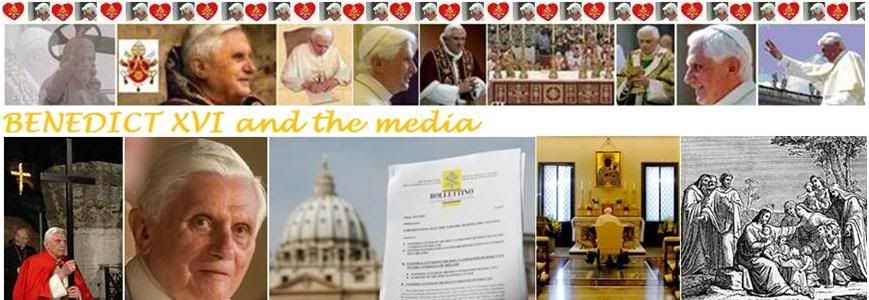 For weeks, the US media have been running stories on polls taken that purport to show a general 'plummeting' of Benedict XVI's approval rating among Americans in general - and I have ignored them because I find such 'popularity' surveys taken at the peak of media-generated 'scandals' unduly swayed by what the media says.
For weeks, the US media have been running stories on polls taken that purport to show a general 'plummeting' of Benedict XVI's approval rating among Americans in general - and I have ignored them because I find such 'popularity' surveys taken at the peak of media-generated 'scandals' unduly swayed by what the media says.
Now, the New York Times comes up with a survey of American Catholics that tend to show a mixed picture at best. Why the Times did the poll at all and why it is publishing it, bylined by the woman who rigged the Father Murphy-Milwaukee case, is a puzzlement, as the King of Siam would say, and one must look this 'gift horse' in the mouth!
Catholics criticize Pope on abuse scandal,
but see some hope
By LAURIE GOODSTEIN and DALIA SUSSMAN

Published: May 4, 2010
A majority of Roman Catholics in the United States are critical of the way Pope Benedict XVI and the Vatican have handled the reports of sexual abuse by priests, but have confidence in the Vatican to make changes to prevent abuse in the future, according to a New York Times/CBS News poll released Tuesday.
The nationwide telephone poll was conducted from April 28 to May 2 with 412 Catholics. The margin of sampling error is plus or minus five percentage points. [I know polls are increasingly scientific in their sampling, but it always makes me queasy to think that a sample of 1,000 - the usual number - much less 412 in this case - can be made to be representative of the 65 million US Catholics.]
After five years of Pope Benedict’s papacy, Catholics in the United States are estranged from the hierarchy in Rome, with most saying the Vatican is out of touch with the needs of Catholics and more than three out of four saying it is not necessary to believe in the pope’s authority to be a good Catholic.
But they feel differently about their parish priest, with a majority saying that most priests understand Catholics’ needs and that they trust their own priest with their children.
In fact, the poll suggests that for most American Catholics, the resurgence of the abuse scandal is like a far-off storm. They say it has had no effect on their Mass attendance, their financial contributions or their participation in their parishes.
Only one in 10 Catholics now say the clergy sexual abuse issue is prompting them to consider leaving the church. That is a marked contrast from the height of the scandal in the United States, in 2002, when about one in five Catholics said they considered leaving.
While the scandal in 2002 focused on American bishops, starting in Boston, who had failed to remove abusive priests, recent news media reports have focused [CHOSEN TO FOCUS AND FOMENT, that is!] on the scandal’s outbreak in Europe and on whether the Vatican and the Pope are culpable.
The Vatican and many American bishops have reacted by attacking the news media, and it appears they have struck a chord. [So, despite all that NYT and AP have tried to do, those Americans who were polled appear to prove the saying that 'You can fool all the people some of the time, or some of the people all of the time, but not all the people all the time!']
The poll shows that slightly more Catholics believe the news media have blown the story out of proportion than those who say it has been accurately reported. Most say the news media have been harder on the Catholic Church than on other religions. Those who attend Mass regularly are even more critical of the news media.
Many Catholic respondents indicated that they saw a change in how their Church had handled the sexual abuse problem over time. A broad majority of Catholics said that in the past, the Vatican and American bishops were far more focused on covering up sexual abuse by priests than preventing it, but that now the reverse was true.
But a majority said sexual abuse of children by Catholic priests was still going on.
Betsy Conrath, who is 60 and a retired weather broadcaster in Spokane, Wash., said in a follow-up interview: “They are not going to cover up any more and hope and pray it will just go away. Now that the Pope has a handle on it, things will change.
“I have been totally saddened by all of this,” Ms. Conrath said, “but I’m still very much a Catholic and have not lost my faith in my religion.”
Norbert Wellman, 71, a retiree in West Point, Iowa, who worked for a chemical company and a state prison, said: “Since the news came out and was spread around in all the newspapers, they got the idea they’re going to have to do the best they can to fix the problem. I think before, maybe, they thought it wouldn’t get out.”
Nearly half of those polled said Benedict’s leadership of the church had been “a mixed blessing,” and only one in four said his leadership had helped the Church.
But his personal favorability rating is more positive than negative. Forty-three percent say they have a favorable opinion of him, and only 17 percent have an unfavorable view.
Still, 38 percent express no opinion about him at all, a decidedly blank reaction to a Pope [A fair-minded reporter would have cited the polls taken before and after the Pope's visit to the United States in 2008, where the 'after' numbers surprised even the cynics!] who made a highly publicized trip to the United States only two years ago and has issued three encyclicals, or formal teaching letters, on morality or doctrine.
The Pope’s favorability rating is higher among those who attend Mass regularly: 63 percent.
The recurrence of the sexual abuse scandal has renewed the debate among some Catholic commentators who argue that there is an underlying problem in the priesthood attributable to celibacy, homosexuality or the male-only-clergy culture.
The poll shows that most Catholics are unconvinced of their arguments. Three in 10 said the celibacy requirement for Catholic priests was a major factor contributing to sexual abuse of minors, while nearly as many said it was only a minor factor and more than a third said it was not a factor. Results are similar on the question of whether homosexuality in the priesthood contributes.
[Goldstein says 'most are unconvinced', yet in the figures she cites, only a third believe celibacy is a major factor, while ther est believe it is not or only a minor factor, and she sames it's the same for homsexuality. Why this persistent dishonesty that cannot even see it is contradicting 'facts' she has just reported?]
Only 17 percent said the all-male priesthood was a major factor in the abuse problem, while a majority said it was not a factor.
Then Goodtsein uses her concluding paragraphs to pus the NYT and liberal agenda - though I won't take her word for the numbers she claims.
Nonetheless,for more than 20 years, majorities of Catholics have consistently said they are in favor of ordaining women and married men as priests. That trend holds true today, with 6 in 10 saying they favor women’s ordination, and two-thirds favoring married priests. Even majorities of weekly churchgoers are in favor of opening the priesthood to women and married men.
Mary Dunham, a 64-year-old quilter and crafter in Orfordville, Wis., said in a follow-up interview: “The sexual abuse issue goes back to the Vatican. They allowed it to be covered up for so long because they didn’t want the Church to look bad. Had a woman been Pope, she wouldn’t have allowed it. She would have strung up these guys herself.”
In the May 3 print issue, the Times even printed a letter from a former New York senator about anti-Catholic bias in the media, though they refused to print a more general letter on anti-Catholicisim from Archbishop Dolan last October:
Attacks on the Church:
An anti-Catholic agenda?
To the Editor:
As a Catholic, I am appalled at the now-daily assaults by the liberal media against the church.
There is no question that certain Catholic clergymen abused children and that certain members of the church’s hierarchy failed to deal with those abuses properly. That failure was based primarily on the mistaken belief that pedophiles can be cured. At the time, that mistaken belief was supported in large measure by the psychiatric community. It has since been rejected.
For the last decade, the Archdiocese of New York and dioceses across New York State have been working assiduously to accept guilt when warranted, atone for those mistakes and, most important, to take corrective action to ensure that they do not happen again.
Over the last few months, several cases have cropped up that took place decades ago and long before the church’s all-out effort to acknowledge, make amends for and rectify its past failures. Some have seized upon those cases to attack the church anew and with frightening vigor. Those attacks are unwarranted and unfair.
Such cases, which will continue to arise, do not mean that the Church’s healing crusade has been discontinued but rather are cases that took place during an unfortunate time in the Church’s history that is now over.
To simply reject out of hand the Church’s extensive and intense program to heal and correct suggests the possibility of an anti-Catholic agenda more concerned with Catholic teachings than with child abuse.
Alfonse M. D’Amato
New York, April 29, 2010
The writer, a former United States senator from New York, is a member of the board of the Friends of the Catholic Church, an informal group created to assist the Catholic Church when it comes under attack.
Now, both instances are a drop in the ocean of calumny that the Times has chosen to let loose over the Pope and the Church - and, I believe, nothing more than the faintest of tokens to show that they are not completely unobjective! It almost makes me think it's a sign to brace yourself for their next tsunami!
Sandro Magister in his blog today gives his Italian readers the gist of ex-Newsweek religion editor Kenneth Woodward's recent article about the New York Times and its brand of journalism, but also mentions an April 30 article by John Thavis at CNS which I completely missed, as follows:
Self-examination: Catholic communicators
look to address the current 'scandal'
By John Thavis
Catholic News Service
VATICAN CITY, April 30 (CNS) -- With workshops such as "Benedict XVI, sexual abuse and The New York Times" on the program, it wasn't surprising that a conference of Catholic communicators in Rome provoked more interest than usual this year.
But those expecting a round of media-bashing were disappointed. Most of the April 26-28 discussion focused on how the Church itself should be more transparent, more proactive in communicating and more journalist-friendly if it wants to get its message out on clerical sex abuse.
Sponsored by the Opus Dei-run Pontifical University of the Holy Cross, the conference over the years has become a regular networking event for hundreds of Church communications personnel, including diocesan spokespersons.
The new round of disclosures on priestly sex abuse, which has taken the Vatican by storm, has also impacted these local Catholic media professionals, most of whom are lay people.
One might have expected the workshop on The New York Times to have served up a welcome scapegoat. The newspaper's recent reporting on the sex abuse cases has been criticized as unfair by several high church officials.
Instead, Diego Contreras, the dean of the Holy Cross university's communications faculty, began the session by saying that overall, the press has had a positive role in bringing sex abuse to light and helping make it a priority issue for the church.
He then offered a "just the facts" presentation. Over the past seven weeks, he said, The New York Times has run 65 news reports on the church and sex abuse in its print edition -- including 10 on page one -- as well as 12 op-ed pieces, one editorial, one interview and 29 letters.
His statistical analysis found that the most common "message" communicated through text or headline was that this scandal directly affects Pope Benedict. The impression, without always being explicitly stated, was that the Pope knew about sex abuse cases and yet said or did nothing, he said.
Contreras concluded by saying The New York Times had clearly made a major effort to provide information on the crisis [That may be so, but what kind of information????] The problems arose, he said, in journalistic interpretation, and in what he termed an excessive reliance on the narrative provided by the lawyers involved in sex abuse cases.
Rachel Donadio, the Times 's Rome correspondent, afterward chatted with Contreras and told him that while people sometimes complain that the lawyers are driving this story, it's very hard to get an alternative narrative from the Vatican.
Donadio addressed the conference the previous day, saying that covering the Vatican was the hardest thing she'd ever done in her life. The Vatican, she said, in many ways remains a "hermetic culture that doesn't want to be known or explained."
Covering the sex abuse scandal has been especially difficult, and sometimes she has felt like a translator between different cultures, she said.
"For a while, I felt like I was trying to explain to American readers that the Pope's not the head of Toyota. He's not going to give a press conference and apologize for brake failure. This is not how the Vatican works," she said.
At the same time, she said, she had to explain to some people in the Roman Curia that "the problem of sex abuse in the Church ... is not a problem invented by The New York Times or by anybody in the press."
"This is an issue within the Catholic Church, not just the press versus the Church," she said. [No one is saying that at all. The obvious and perennial complaint that thinking Catholics have against the Times and its Church-bashing colleagues and allies is that their reports make it appear that the Church is responsible for all the world's ills and the Pope is the chief conniver in all this!
It is not a defense to say you cannot get an answer from the Vatican - the MSM are still skewing their stories to make the Vatican adn the Pope into the arch-villains. Andrea Tornielli and Paolo Rodari can get answers to their questions when they have to. Like anywhere else in journalism, getting answers is a matter of contacts, knowing how to use them without alienating the entire establishment. And when you really cannot get answers at the time you have to write your story, then say so.
Some of the most challenging comments at the conference came from the Catholic communicators on the program.
Pia de Solenni, a U.S. Catholic theologian and writer, said she was disturbed that some Church officials seemed to exhibit "a sort of tone-deafness" in their defensive comments on sex abuse. She said it doesn't really help the Church to describe itself as persecuted, or to say that because only a small percentage of priests commit abuse, "we're just about the same as others."
[Sometimes Catholic journalists tend to take this 'me, too' and 'Woe is me!' attitude which really does not win them any points with anyone! Who are they trying to please? Yes, some bishops are tone-deaf and remain tone-deaf, but neither should Catholics deny that the Church is being persecuted in the media, and to point out that the attribution of scandal to Catholic priests is overblown, to say the least, is not being defensive. It is possible to state the truth about both positive and negative things in the way the Church as a whole has handled this issue.]
She said the Church's message should focus on several key elements: asking forgiveness from the victims, accountability for those who have made mistakes and transparency in how cases have been handled. [And has not Benedict XVI addressed all that in his Pastoral Letter to the Irish - which to all intents and purposes, appears to have been forgotten by everyone barely six weeks after it was published? What have Catholic media done to propagate that letter at all after publishing it once?
If, in answer to every accusation from the MSM, Catholic media cited the pertinent passage from the Pope's letter - while exhorting all bishops, not just the Irish, to live up to it - would that not have been an effective answer as well as a way of driving home his points??? ]
There are good models for this, including in the United States, but they need to be implemented in every diocese around the world, she said.
The Church also needs to get its good news out, including the very low numbers of new sex abuse cases being reported, de Solenni said. Above all, she said, the church needs to be proactive, going to media with its information and not "waiting for the story to come and get us."
What hurts the communications effort on sex abuse are "conflicting and uncoordinated statements," especially when they involve red herrings like homosexuality or "cultural landmines" like the Holocaust, she said.
Although de Solenni didn't name names, many at the conference thought some recent and apparently unvetted statements from Vatican officials on those very topics had only made their jobs harder.
As close followers of the Vatican's communications strategy, they sympathize with the Vatican spokesman, Jesuit Father Federico Lombardi, who they correctly believe has had to overcome some internal pressures in his campaign to publish more detailed and timely information on sex abuse cases and policies.
On the conference's final day, Father Lombardi met with participants at the Vatican and told them his overall strategy is based on a simple principle: that the Vatican should provide as much information as possible in order to "reduce the widespread impression that we have a culture of secrecy or are trying to hide something."
He also said responding to the sex abuse scandal must go beyond answering accusations by critics or the media. One fundamental task -- in which local Catholic communicators can take the lead -- is to provide concrete examples that illustrate how the Church is today a model environment for child safety, he said.
The Vatican spokesman received something from this audience that he hasn't heard in a while: a big round of applause.
[Modificato da TERESA BENEDETTA 06/05/2010 06:27] |
| |
 05/05/2010 14:21 05/05/2010 14:21 |
|
| | | OFFLINE | | Post: 20.111
Post: 2.751 | Registrato il: 28/08/2005
Registrato il: 20/01/2009 | Administratore | Utente Veteran | |
|
 I mentioned this in the 'almanac' entry for yesterday, and did not find time to flesh it out as it deserved, but it is the leading papal story in today's issue of the OR, and because Rabbi Toaff at 95 sets an example of longevity along with Leo XIII!...
I mentioned this in the 'almanac' entry for yesterday, and did not find time to flesh it out as it deserved, but it is the leading papal story in today's issue of the OR, and because Rabbi Toaff at 95 sets an example of longevity along with Leo XIII!...
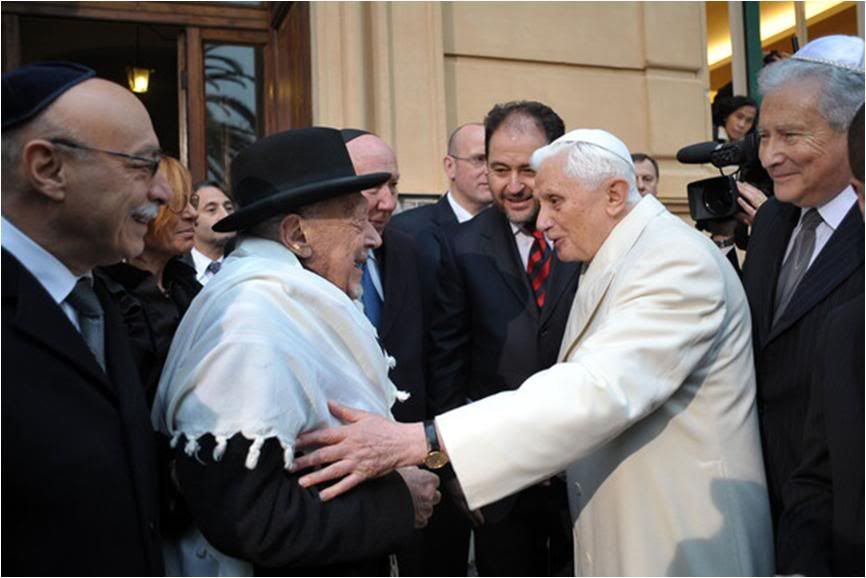 Benedict XVI greets Rabbi Toaff on his visit to the Synagogue of Rome last January 17.
The Pope's birthday wishes
Benedict XVI greets Rabbi Toaff on his visit to the Synagogue of Rome last January 17.
The Pope's birthday wishes
for Rabbi Elio Toaff, 95
The Holy Father sent the emeritus Chief Rabbi of Rome, Elio Toaff, a handwritten message of greeting on his 95th birthday on May 3. The letter was read by Mons. Georg Gaenswein, private secretary to His Holinesss, at the inauguration Monday evening of the Fondazione Elio Toaff for Jewish Culture. Here is the text of the message:
To the Most Distinguished
Emeritus Rabbi
Rav Elio Toaff
"The LORD is my shepherd; there is nothing I lack... Even when I walk through a dark valley, I fear no harm for you are at my side" (Psalm 23)
On the happy occasion of your 95th birthday, I wish to join all who rejoice with you for the gifts that the mercy of the Most High has given you in a life that has been long and fruitful.
I think, as the Psalm says, of how the Lord has refreshed your spirit, leading it along the right path, even in the darkest valley, at the hour of persecution and the extermination of the Jewish people.
The Lord, in his mysterious designs, has wanted your people to experience his salvation in a singular manner, to become a sign of hope for the rebirth of many of your brothers.
I am particularly happy to recall your commitment to promote fraternal relations among Cathoklics and Jews, and the sincere friendship that bound you to my venerated predecessor, Pope John Paul II.
My wish is that the concluding words of the Psalm may be fulfilled for you: "Only goodness and love will pursue me all the days of my life; I will dwell in the house of the LORD for years to come."
Shalom!
From the Vatican
May 3, 2010

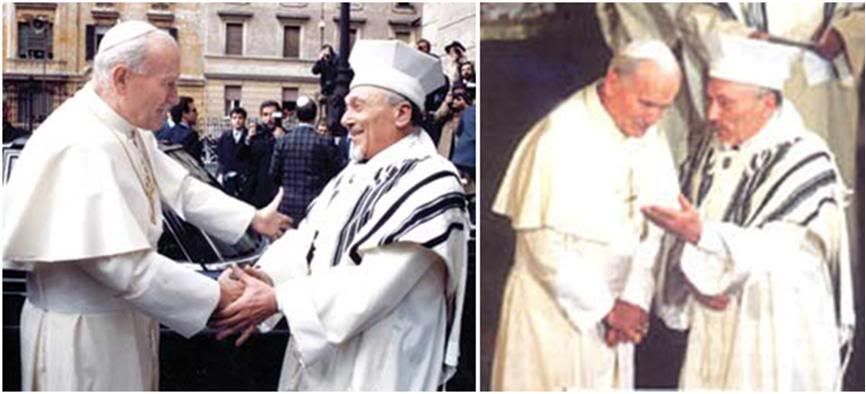 Rabbi Toaff with John Paul II on the latter's historic vicit to the Synagogue of Rome in 1986.
Rabbi Toaff with John Paul II on the latter's historic vicit to the Synagogue of Rome in 1986.
[Modificato da TERESA BENEDETTA 06/05/2010 06:30] |
| |
 05/05/2010 15:00 05/05/2010 15:00 |
|
| | | OFFLINE | | Post: 20.112
Post: 2.752 | Registrato il: 28/08/2005
Registrato il: 20/01/2009 | Administratore | Utente Veteran | |
|
 May 5, Wednesday, Fifth Week of Easter
Feast of ST. HILAIRE D'ARLES [France, 403-449), Bishop and Confessor
May 5, Wednesday, Fifth Week of Easter
Feast of ST. HILAIRE D'ARLES [France, 403-449), Bishop and Confessor
Not to be confused with the more famous Hilaire of Poitiers, Doctor of the Church,
this Hilaire followed the example of a relative who became a monk and then bishop
of Arles. He himself became bishop at age 29 and was an exemplary one in most
respects - he did manual labor to help the poor, sold Church vessels to ransom
Christian captives, became a 'magnificent' orator. But having episcopal primacy
over southern Gaul, he made arbitrary decisions about the bishops under him that
he forced Pope Leo the Great to intervene, stripping him of the power to consecrate
bishops and to call synods.
Readings for today's Mass: www.usccb.org/nab/readings/050510.shtml
OR today.
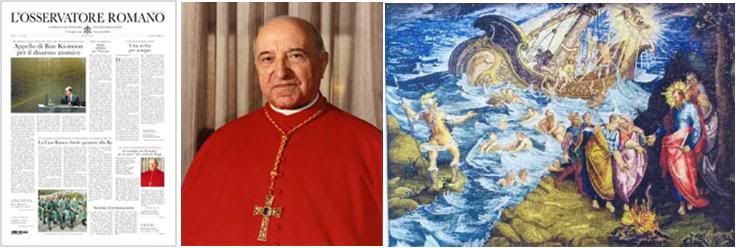 Illustration: St. Paul shipwrecked on Malta, Vatican mosaic presented to the Church of Malta by Benedict XVI.
Papal stories in this issue: The Pope's condolence at the death yesterday of Cardinal Luigi Poggi, 92 (photo) - he was the Archivist
Illustration: St. Paul shipwrecked on Malta, Vatican mosaic presented to the Church of Malta by Benedict XVI.
Papal stories in this issue: The Pope's condolence at the death yesterday of Cardinal Luigi Poggi, 92 (photo) - he was the Archivist
and Librarian of the Holy Roman Church from 1992-1998; the Pope's birthday greetings to the former Chief Rabbi of Rome, Elio
Toaff, 95; and an interview with Mons. Alfred Xuereb, the Pope's other private secretary, who is from Malta, on the Pope's recent visit
to Malta. Page 1 international news: UN secretary-general calls for nuclear disarmament at current UN meeting; prospects for stabilizing
Europe after and if Greece is rescues from its debt crisis; the White House seeks guarantees from British Petroleum for appropriate
actions to minimize the environmental disaster resulting from the explosion of a BP oil rig off the coast of Louisiana two weeks ago.
THE POPE'S DAY
General Audience - The Holy Father's special catecheses on the priesthood focused today on the role
of the priest in sanctifying the people entrusted to his care. The Pope also encouraged the nations
meeting in New York this week towards 'a concerted and safe nuclear disarmament' which must begin by
universal respect for international commitments.
[Modificato da TERESA BENEDETTA 05/05/2010 15:26] |
| |
 05/05/2010 16:57 05/05/2010 16:57 |
|
| | | OFFLINE | | Post: 20.113
Post: 2.753 | Registrato il: 28/08/2005
Registrato il: 20/01/2009 | Administratore | Utente Veteran | |
|

 Mr. Weigel has obviously thought this issue through - and goes far beyond anyone has done so far to anticipate what ought to be done about the catastrophic mess left behind by the late Fr. Maciel...
Next acts in the Legionary drama
Mr. Weigel has obviously thought this issue through - and goes far beyond anyone has done so far to anticipate what ought to be done about the catastrophic mess left behind by the late Fr. Maciel...
Next acts in the Legionary drama
by George Weigel

May 5, 2010
Over the past year, members and friends of the Legionaries of Christ and its affiliated lay movement, Regnum Christi, have worked hard in trying to “save what can be saved” from the wreckage created by revelations that the founder of these communities, Fr. Marcial Maciel Degollado, lived a vicious and duplicitous life of moral turpitude for decades, during which he fathered several children; sexually abused seminarians; violated the canons respecting the Sacrament of Reconciliation; deceived popes, curial officials, bishops, his brother Legionaries, and the lay members of Regnum Christi; and funded all of this by the misdirection of contributions given to support the religious work of the communities that called him Nuestro Padre or Nuestro Padre Fundador.
On April 30, the five apostolic visitators whom Pope Benedict XVI had charged with investigating the Legion met at the Vatican with senior officials of the Holy See, in a daylong session that Pope Benedict joined for ninety minutes.
On May 1, the Holy See released a statement on the Legion case and the initial steps being taken to save what can be saved. The statement bluntly acknowledged that Maciel had engaged in “extremely serious and objectively immoral behavior,” some of which involved “real crimes,” and all of which, taken together, led to the conclusion that Maciel’s was “a life devoid of scruples and authentic religious sentiment.”
The statement further deplored the structures of deceit and self-deception within the Legion that had facilitated Maciel’s double life, including an “ostracism of those who doubted his upright behavior.”
The impact of that structure of deceit continues to be felt, the statement continued, in the “surprise, distress, and profound sadness [felt] among members of the Legion” when their superiors finally told them something of the truth about Maciel.
Indeed, the statement acknowledges that the sordid facts of the Maciel affair “could bring into question the vocation and central charism that belongs to the Legionaries of Christ and is proper to them.”
As for immediate next steps, the Holy See will appoint a commissioner or delegate to run the Legion of Christ for the foreseeable future.
The May 1 statement suggests, and Vatican sources confirm, that this delegate will have plenipotentiary powers, including making recommendations to the Pope about the future of the Legion of Christ —about which, it seems, all options remain on the table.
The delegate presumably will address several of the major concerns identified by the apostolic visitators:
- the “need to redefine the charism of the Congregation of the Legionaries of Christ”;
- the “need to review the exercise of authority” within the Legion, “which must be joined to the truth, in order to respect conscience”; and
- the “need to preserve the enthusiasm of the faith of young people [in the Legion or in its institutions] . . . by means of an adequate formation.”
A Vatican commission will carefully examine the Legion’s constitutions; that examination will have to consider how the present constitutions facilitated the problems of deceit, misuse of authority, and malformation within the Legion.
Finally, an apostolic visitation of Regnum Christi will be undertaken, with an apostolic visitator to be appointed shortly.
If, indeed, everything about the future of the Legion (and, by extension, Regnum Christi) remains on the table, so that an open discussion of options is possible, the following notes may be of some use to those involved in resolving this drama in ways that serve the universal Church while saving what can be saved of the Legionaries of Christ and Regnum Christi.
1. The prime imperative for the immediate future is to dismantle the “grand narrative” of Legion history within both the Legionaries of Christ and Regnum Christi — the carefully crafted, nurtured, and inculcated story of noble works being achieved after humble and often persecuted beginnings.
Some of this dismantling has begun, in recent admissions by Legionary authorities that Maciel committed sins and crimes. But the temptation to hang onto an annotated grand narrative, in which Maciel appears as a flawed man who nonetheless accomplished great things, remains.
Prior to the most recent concession, by Legionary leadership, of Maciel’s perfidies, some within both the Legion and Regnum Christi were comparing Nuestro Padre to St. Augustine. All of this must stop, and the grand narrative must be destroyed, root and branch.
To that end, the delegate governing the Legion ought to request that the Holy See prepare and publish an account of Maciel’s double life, with his specific crimes described individually.
Such an account would then be given to every member of the Legionaries of Christ and every member of Regnum Christi, who would be asked to sign an affidavit stating that “I certify that I have personally read and understood the account of the crimes of Father Maciel that has been provided by the Holy See.”
Such a process would make it difficult, if not impossible, for any form of the grand narrative to be reconstructed. Putting the full details of the wreckage on the public record now would also clear psychological space for a consideration of the future while sparing the Holy See and the rest of the Catholic Church the drip, drip, drip of lurid revelations being brought to light for decades by investigative journalists and the plaintiffs’ bar.
2. At the beginning of his work, the delegate ought to consider informing the members of the Legionaries of Christ and Regnum Christi that, as they gave themselves to these institutions without knowing the pathologies of their founder, they are free to leave these institutions without sin, guilt, shame, or remorse.
Such a statement is essential to stop the moral blackmail that (according to credible reports from the families of Legionary seminarians and students in Regnum Christi schools) continues today: “Since you came to us it is clearly God’s will for you to be here, and you will be turning your back on God’s will and sinning if you leave . . .”
Procedures for the fast-track exclaustration of vowed members of the Legion who wish to join another religious congregation or incardinate in a diocese as regular clergy should be devised.
This will make clear that what is to be salvaged from the current debacle are priestly vocations (many of them impressive and of great value to the Church), not necessarily Legionary vocations.
Similar procedures for assisting lay members of Regnum Christi to leave without any pressure or stigma are essential to the authentic reform of that movement.
3. The current Legion leadership, at the international and regional levels, must be replaced, immediately and comprehensively, with appointed interim superiors who will serve at the pleasure of the delegate. [In fact, I am surprised they have not all tendered their resignation from their positions - even if necessarily pro forma until the Vatican has appointed interim administrators. That would have been the honorable thing to do.]
The delegate should thoroughly investigate the question of whether present Legion members were knowingly complicit in Maciel’s crimes, and arrange for the dismissal of those who were, from the Congregation of the Legionaries of Christ.
4. Through its delegate, the Holy See should instruct the Legion to suspend immediately all vocation recruitment, including vocation retreats and postulancy programs, none of which is to be resumed without permission of the Holy See.
At the same time, the Holy See should instruct bishops around the world to supervise closely the work of the Legionaries of Christ and Regnum Christi within their dioceses, such that the spiritual lives and consciences of those attending Legion schools and those undergoing formation leading to consecrated life within Regnum Christi are rigorously safeguarded.
Credible reports of repeated pressures being put on young consciences should result in the immediate suspension of faculties of the Legionary priests involved.
5. The delegate should facilitate a serious theological reflection within the Legionaries of Christ on what the May 1 statement describes as the “true core” of the Legion’s charism, namely, “that of the militia Christi.”
That charism cannot be credibly attributed to Marcial Maciel; it may have emerged from the devotion and good works of the members of the Legion.
How that happened requires the most serious reflection on the dynamics of sin and grace in the Church, and an acknowledgment that a militant zeal for the Church’s evangelical work is a gift of the Holy Spirit to the entire Church, not simply to an elite corps of religious within the Church.
Indeed, a serious theological reflection on the Legion’s future will have to include a rigorous examination of the Legion’s ecclesiology and its understanding of how it “fits” within the Body of Christ and its triple mission of teaching, sanctification, and service.
Historically, the charism of a religious congregation has been deeply and intimately linked to its founder, even if the original foundation subsequently has split and subdivided (as, for example, with the Franciscans, whose various communities today nonetheless all live in continuity with the originating charism of St. Francis).
In this case, however, the founder must be repudiated: Whatever canonical form a reformed or reconstituted or refounded Legionaries of Christ might take, its charism cannot be linked to Marcial Maciel.
How it might be linked to the spiritual patrimony of the entire Church militant, mediated through the holy lives that have in fact been lived within the Congregation of the Legionaries of Christ, is a question requiring very careful thought and a willingness to consider a full menu of possible answers.
6. Given the unprecedented nature of this case — a religious congregation manifestly capable of good works yet founded by a sociopathic personality — options beyond either suppression or reform ought to be considered.
If it is essential that the grand narrative of Legionary history be repudiated along with the founder, and if a mechanism needs to be devised to ensure that the future can be constructed without the burden of those associated with the evils of the past, then perhaps a dissolution-plus-refoundation scenario should be explored.
Such a scenario might unfold like this: The delegate governing the Legion, after taking the measures noted above and concluding that no program of reform from within is likely to prove feasible, would summon a General Congregation of the Legionaries of Christ.
The General Congregation, after reflecting on the record compiled by the apostolic visitators, would conclude its work by dissolving the present Legion to clear the path for a “refoundation” — the creation of a new religious community dedicated to the tasks of lay formation, spiritual renewal and evangelization, and Catholic education that characterized the best of the work of the former Legion.
Having accepted the General Congregation’s decision to dissolve the Legionaries of Christ, the Holy See would appoint a commission, composed in part of now-former Legionary priests of indisputable integrity and in part of other priests and bishops of known probity, to receive and consider the applications of those priests and seminarians of the now-dissolved Legion who wish to enter the new community.
This commission would have the authority to reject the applications of those whose linkage to the Legion’s past would create difficulties for the new community’s future.
Assuming a suitable number of applicants were judged acceptable, an election would then be arranged to constitute a committee charged with defining the new community’s mission and drafting provisional statutes for its governance under the supervision of an apostolic delegate who would chair the committee. Such a mission statement and rule of life would then be submitted to the normal processes of review by the Holy See.
It will be objected that such an unconventional method of addressing the ecclesiastical crisis provoked by the Maciel Affair cannot work: The work of various Legionary and Regnum Christi institutions would be seriously disrupted, questions of property would be endlessly litigated, and some ecclesiastical home would have to be found for those who chose not to join the new community or who were denied acceptance into it.
Yet if the goal remains to save what can be saved in the work of the Legionaries of Christ and Regnum Christi, there must be a clear, unmistakable, and public break with the past and with the person of Marcial Maciel.
A self-dissolution of the present Legion and the creation of another religious community dedicated to the good works that the Legion has done — including the spiritual direction of a “refounded” Regnum Christi — would help break the fever of the grand narrative and end the personality cult of Maciel, both of which contributed mightily to the current crisis of the Legionaries of Christ and Regnum Christi.
As for the property issues, these will doubtless be litigated, with or without a dissolution and “refoundation,” given the financial issues that the revelations of Maciel’s double life have already raised.
Finding some ecclesiastical home for ex-Legionaries whose past lives do not qualify them for admission to the new community ought not be impossible, however difficult.
To propose that such an unprecedented course of action be seriously considered is not a question of desperate situations calling for desperate measures, but of great evils requiring the remedy of heroic virtue — in this case, the heroic exercise of the cardinal virtues of courage, justice, and prudence.
If, as I think we must believe, God can bring good out of evil in the Maciel affair, then the exercise of prudence in the work of justice and courage here must be to open a path along which the goodness to be found in the Legionaries of Christ and Regnum Christi can find its way into the future, absent the chains of the past.
That requires breaking those chains: theologically, psychologically, historically, and, one suspects, institutionally.
Compared to Weigel's piece, this one by Thomas Reese is relatively lightweight in terms of what is to be done about the Legionaires now, but his blunt language about John Paul II is something else. I don't object to his right to criticize the late Pope - though I would like to hear George Weigel answer him - but to suggest that his beatification should be put on hold just like Pius XII's should be, is obviously extreme and outre! Surprisingly, Reese manages to work in only one dig against Benedict XVI in this article:
Pope imposes martial law
on Legionaries of Christ
By Thomas J. Reese, S.J.

May 5, 2010
Thirteen years after the Hartford Courant ran an expose of sexual abuses by the Rev. Marcial Maciel Degollado, the founder of the Legionaries of Christ, the Vatican has finally imposed martial law on the order and mandated the rewriting of its constitution and the revamping of its spirituality and culture.
[Again, one must ask: Where were the rest of the media 13 years ago, when they left Jason Berry and the Courant isolated and unsupported in the expose? Why did no one pick up the Maciel case - as juicy as it was - when the Boston scandals erupted right next to Hartford? Why did no one pick up the story in 2006 and follow it when the penance imposed by Benedict XVI on Maciel was so obviously a verdict on his misdeeds? How could MSM pass up a readymade Dan Brown-cum-Jackie-Collins plot that could have kept the MSM pots boiling quite a while? But they did pass up. And I wonder why....
P.S. I can think of two reasons, that are related: They do not want to lose their focus - or that of public opinion - on the 'big fish' they are out to bag, by hook or by crook, the Fisherman himself, as they might if they played up Maciel, who is dead after all; and any discussion of the Maciel-LC case would necessarily win points for Benedict XVI.]
Nothing comparable to this papal intervention has occurred in the Church since John Paul II appointed a pontifical delegate for the Society of Jesus in 1981 during the illness of its superior general, Pedro Arrupe, S.J.
In the Jesuit case, the delegate was simply an interim leader since there was no papal criticism of the Jesuit constitution, its founder and his spirituality. The alleged crime of the Jesuits was not being sufficiently loyal to the Pope.
The two interventions point to a fatal flaw in the papacy of John Paul II. John Paul trusted those who cheered him and tried to crush those who questioned his ideas or actions. This led him to trust Maciel and distrust questioning Jesuits.
Having grown up in a persecuted church where unity was a matter of survival, John Paul could not accept open debate and discussion in the church. Loyalty was more important than intelligence or pastoral skill.
As a result, the quality of bishops appointed under him declined, as did the competence of people working in the Vatican.
This is not to downplay John Paul's important role in world affairs. He was much more important to the peaceful fall of Communism than Ronald Reagan. He also did more to improve Catholic relations with Jews than any Pope in history.
But the sad truth is that while he was good for the world, he was bad for the Church. His suppression of theological discussion and debate, his insensitivity to women's issues, and his appointments kept the Church from responding pastorally and intelligently not only to the sexual abuse crisis but to other issues facing the Church. [Just so happens to be Reese's and his fellow liberals' concerns.]
I have no doubt that John Paul is in heaven, but the effort to canonize him should be put on hold along with that of Pius XII.
There are those who criticize Pope Benedict for trying to save the Legionaries instead of simply shutting them down. These critics forget that there were two sets of victims who were exploited by Maciel.
First there were those he sexually abused. But there were also the hundreds if not thousands of naïve, idealistic, conservative Catholics who were fooled into believing that he was a holy man leading them to Christ. Instead, he was a sociopath who, the Vatican concluded, lived "a life entirely without scruples and authentic religious feeling."
Those who joined the Legionaries and Regnum Christi were betrayed and are also victims. I feel especially sorry for the good young men who joined the Legionaries. These men, like soldiers who were betrayed by their general, deserve special sympathy and help.
Whether the papal delegate can make the changes and do the healing required to save these men and the Legionaries as an order, remains to be seen. He will certainly have to replace all the top leadership who were either complicit with or too stupid to see the evils of Maciel. In either case, they should not be leaders in the order.
But the Vatican response needs to focus not only on the Legionaries but also on itself. Why did it take 13 years for the Vatican to intervene? Why did the Congregation for Religious not investigate the numerous accusations against Maciel? Why did it approve such a defective constitution in the first place? Is it true, as Jason Berry alleges in the National Catholic Reporter, that Maciel used Legionaries' money to buy influence with cardinals in the Vatican?
If the Pope wants to deal with the core issue, he should hire an outside management consulting firm to answer these questions and to make recommendations on improving the Vatican curia. [I don't know that a secular 'management team' is necessarily the way to go. Their secular mindset will be both an advantage that may well be far outweighed by its being a hindrance.]
The sexual abuse crisis was not only caused by bad priests, it was compounded by bad management at the diocesan and Vatican level.
It will be too easy to blame John Paul for these failures without recognizing that the Vatican has systemic flaws.
First among these is a culture that prizes loyalty above competence. [One certainly cannot say that of Benedict XVI, who has had to tolerate 'disloyal' Curia and bishops all these years - except that some of these questionable figures are not even all that competent!] The Vatican still acts more like a royal court than a modern bureaucracy.
Cardinals and bishops in the Vatican act like and are treated like papal nobility and princes rather than civil servants. There is no theological reason why any Vatican official needs to be a bishop or cardinal. [It has nothing to do with theology. The reason is quite simple and practical: Rank confers authority - or it should anyway. We have enough arrogant cardinals and bishops who defy the Pope himself; how do you think they would treat an untitled priest set over them?]
The Catholic Church encourages the faithful to examine their consciences. The Pope and the Vatican need to examine why the Church failed as an institution to respond appropriately to the sexual abuse crisis. Such an examination must lead to repentance and change. [MY! my! How sanctimonious we are! Does Reese really think the Pope, at least, has not examined his conscience over this, and does not do so every night before he goes to sleep]?
Thomas J. Reese, S.J., is a Senior Fellow, Woodstock Theological Center, Georgetown University.
Critics call for 'bloodbath'
of Maciel's Curial supporters -
but who is left to axe?
P.S. Now Maciel's most outspoken abuse victims and Jason Berry, who singlehandedly persisted on the Maciel case since 1997, say that the Vatican has not done enough and it should act against the Curial officials who protected Maciel. Here are excerpts from a May 4 article in the US TV network ABC News online
www.topix.com/who/pope-benedict-xvi/2010/05/victims-of-sex-abuse-say-pope-benedicts-plan-to-take-over-legion-of-christ-is-no...
that appears not to have been picked up by other MSM so far.
Critics and victims of Father Marcial Maciel, late founder of the powerful Catholic order known as the Legion of Christ, say that Pope Benedict XVI's decision to overhaul the leadership of the group is inadequate, and does not explore the role of high church officials in allowing Maciel to lead the Legion for more than half a century...
But Juan Vaca and Jose Barba, two of a group of eight seminarians who sent sworn affidavits to the Vatican in the late '90s alleging sexual abuse , asked why the decision did not include making an inquiry into long-time Maciel's network of support among high Vatican officials.
...Author Jason Berry, who recently published two pieces in the National Catholic Reporter alleging that specific Vatican officials, including former Secretary of State Angelo Sodano, had accepted large gifts from Maciel over the years, said he was troubled by the way the Vatican's statement about the decision "seem[ed] to lay all the blame on Maciel.
"The Vatican helped create Maciel," said Berry...
So now, they want heads rolling in the Curia. But whose heads are there to roll?
Cardinal Sodano retired three years ago, and Mons. Dsiwisz left the Vatican after the death of John Paul II, to name the two most prominent among those 'accused' of coddling Maciel.
About the only person 'negatively' linked to Maciel in the present Curia is Cardinal Franc Rode, the Slovenian prefect of the Congregation for the Institutes of Consecrated Life (i.e., the various religious orders, of which the LC is one). Rode's over-the-top eulogy at Maciel's funeral in 2008, which raised eyebrows then, infamously praised the 'healthy' atmosphere he found throughout the Legion, among other things.
Rode was appointed to his position 2004 by John Paul II and is one of the seven remaining holdovers from John Paul II's Curia, along with
- Cardinal Giovanni Battista Re (Bishops), 76, and soon to retire;
- the German Cardinals Walter Kasper (Christian Unity), 77, and Paul Josef Cordes (Cor Unum), 75, both also due to retire;
- and the Polish Cardinals Zenon Grocholewski (Catholic Education), 70, and Stanislaw Rylko (Laity and Youth), 64.
Of them, only the Polish cardinals are in positions that could possibly have had anything to do with Maciel's Legion. If Berry and Maciel's victims have relevant information about them (or any other specific names in the Curia), they should come out with it.
The rest of the 24 major offices of the Roman Curia are in the hands of prelates named by Benedict XVI, few of them in the Curia long enough to have been associated with Maciel or his Legion in any way. Any cardinals who 'created' Maciel or enabled him - Maciel's 'ascendancy' goes back to the 1950s - are either completely retired or dead.
This is another case of rash generalization by those who just want to slather tar all over the Vatican.
[Modificato da TERESA BENEDETTA 06/05/2010 20:19] |
| |
 05/05/2010 21:46 05/05/2010 21:46 |
|
| | | OFFLINE | | Post: 20.114
Post: 2.754 | Registrato il: 28/08/2005
Registrato il: 20/01/2009 | Administratore | Utente Veteran | |
|
 GENERAL AUDIENCE TODAY
GENERAL AUDIENCE TODAY
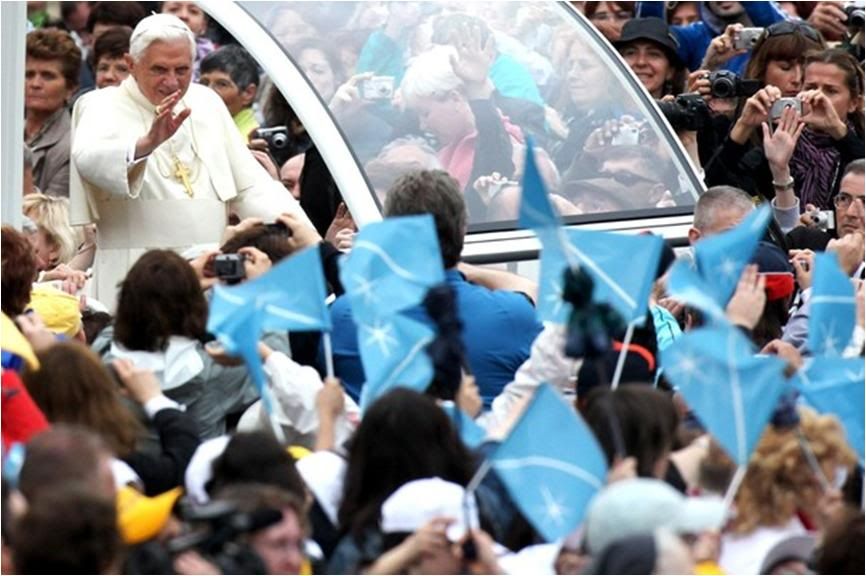
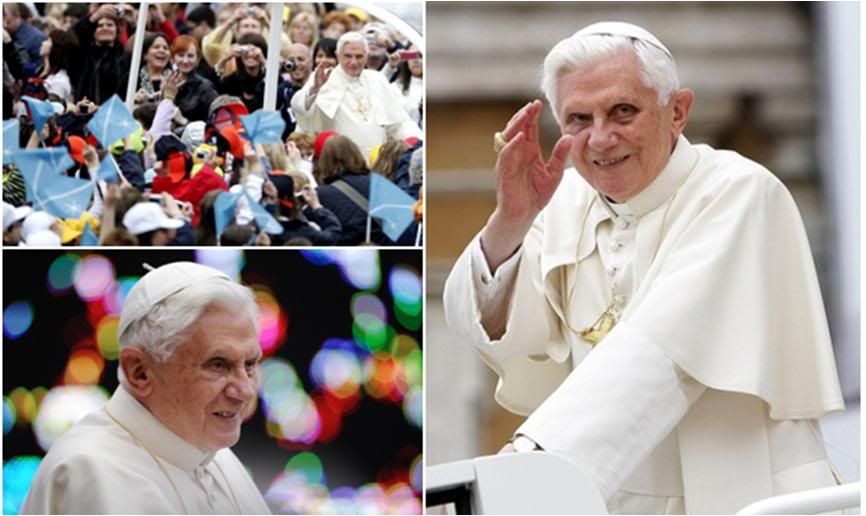 Pope calls on nations to live up to
Pope calls on nations to live up to
nuclear non-proliferation commitment

(05 May 10 - RV) During his General Audience this Wednesday, Pope Benedict XVI made an appeal for a nuclear-free world, told pilgrims that marriage can save society, and warned priests against a weakening of Christ’s action through the Church, when God’s gift of the sacraments are ministered without humility and fidelity.
Twenty thousand pilgrims and visitors packed an overcast St Peter’s Square Wednesday to hear Pope Benedict XVI’s weekly catechises.
Speaking in Italian at the end of the audience the Pope launched an appeal to world leaders gathered in New York for the review conference on the Nuclear Non-Proliferation Treaty, asking them to “overcome the constraints of history and patiently weave a political and economic plan for peace, to help human development and the genuine aspirations of peoples”.
He said: " Progress towards combined and secure nuclear disarmament is closely connected to the full and rapid fulfilment of the relative international commitments... Peace, in fact, rests on trust and on respect for promises made, not only on the balance of power”.
The Pope went on to encourage initiatives “which pursue a progressive disarmament and the establishment of zones free from nuclear weapons, with a view to their complete elimination from the planet”.
Also Wednesday Pope Benedict used his greeting to English speaking pilgrims to launch a strong defence of marriage, which he described as “an instrument of salvation, not only for married people but for the whole of society.”
His comments came in greetings to a group of pilgrims from Jönköping Sweden, where a Conference on the Family will take place later this month.
He observed that: “Like any truly worthwhile goal, it places demands upon us, it challenges us, it calls us to be prepared to sacrifice our own interests for the good of the other. It requires us to exercise tolerance and to offer forgiveness. It invites us to nurture and protect the gift of new life. Those of us fortunate enough to be born into a stable family discover there the first and most fundamental school for virtuous living and the qualities of good citizenship. I encourage all of you in your efforts to promote a proper understanding and appreciation of the inestimable good that marriage and family life offer to human society.”
The Pope added that “God’s gift to us of marriage and family life enables us to experience something of the infinite love that unites the three divine persons – Father, Son and Holy Spirit. Human beings, made in the image and likeness of God, are made for love – indeed at the core of our being, we long to love and to be loved in return. Only God’s love can fully satisfy our deepest needs, and yet through the love of husband and wife, the love of parents and children, the love of siblings for one another, we are offered a foretaste of the boundless love that awaits us in the life to come”.
Earlier, in his catechesis in Italian, the Holy Father had reflected on his weekend trip to Turin to venerate the Holy Shroud: “which invites us to contemplate the face of Christ” and “to share in his saving work”.
But the main body of this week's catechesis was a continuation of his reflections on the priestly ministry, and, in particular the ministry of sanctification:
“As ministers of Christ, priests bring us into life-giving contact with the mystery of God’s holiness... In the celebration of the sacraments, and in particular the Eucharist and the Sacrament of Reconciliation, Christ’s sanctifying work is constantly made present and effective”.
The Pope pointed out that “an under-estimation of the faithful exercise of this ministry has represented a weakening of the current action of Christ through the Church."
“In their devout celebration of the sacraments, priests sanctify the faithful and are themselves sanctified and configured ever more closely to Christ. I ask all of you to pray for priests and their ministry of sanctification, that they may be true shepherds according to God’s heart”.
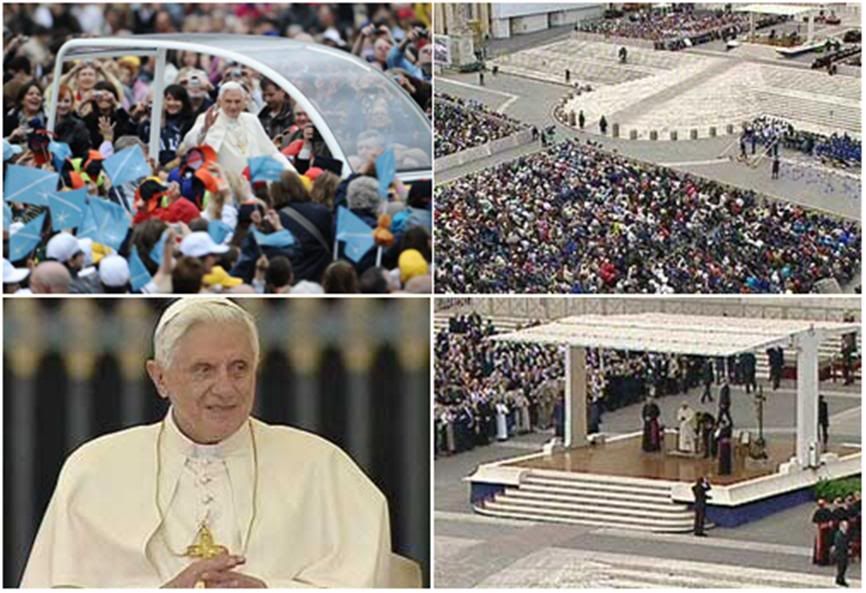
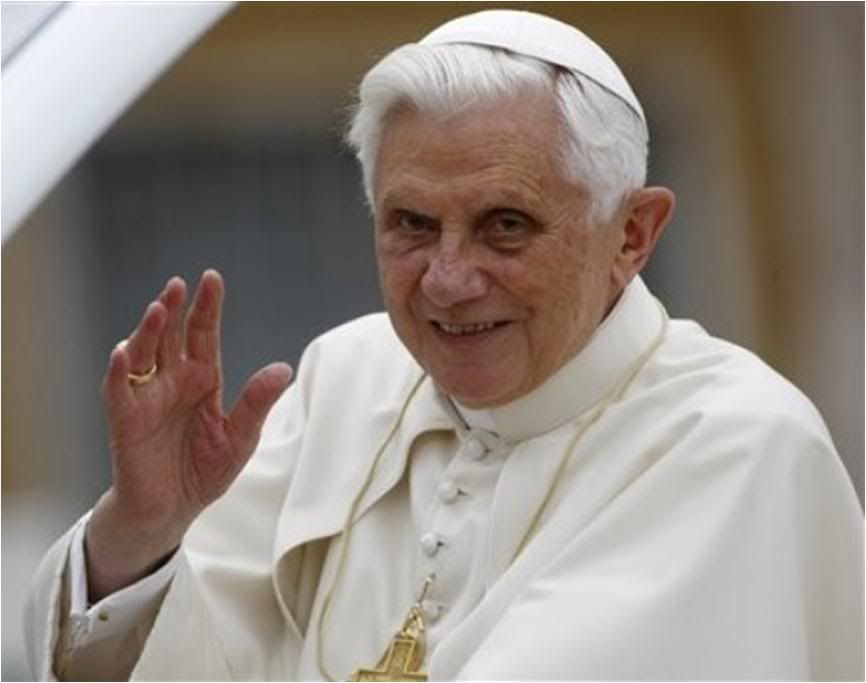
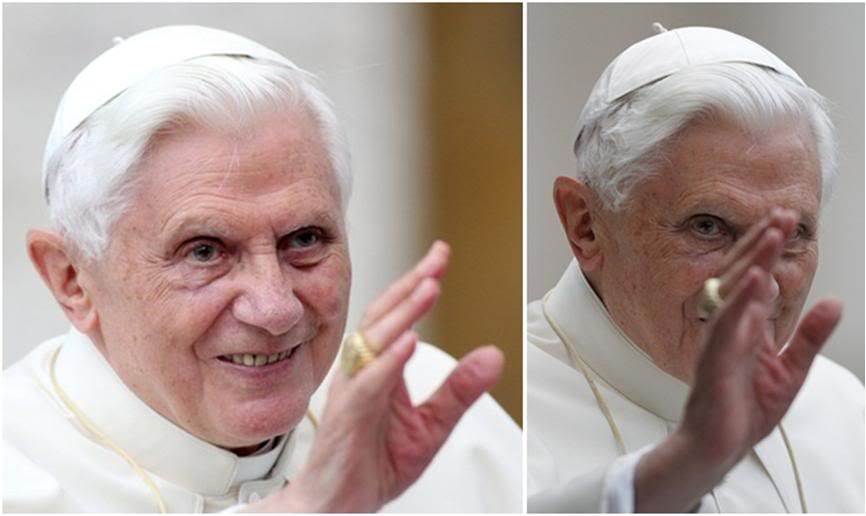
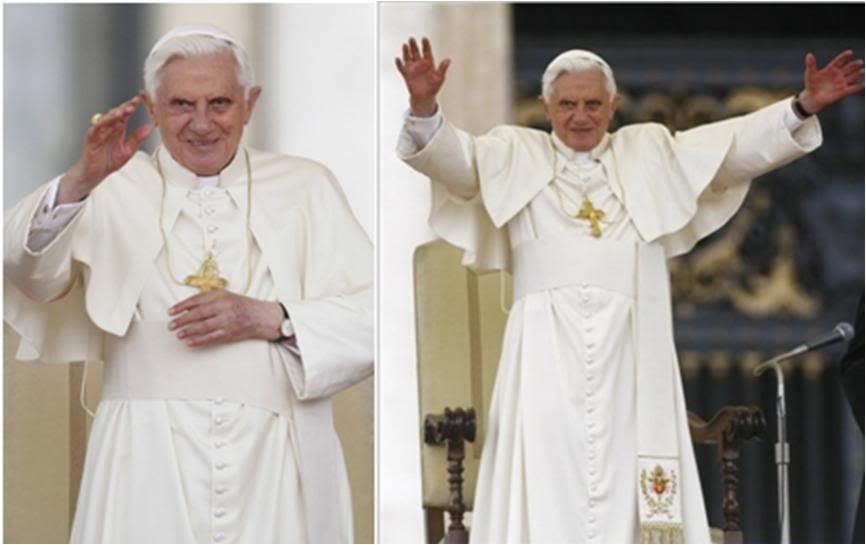
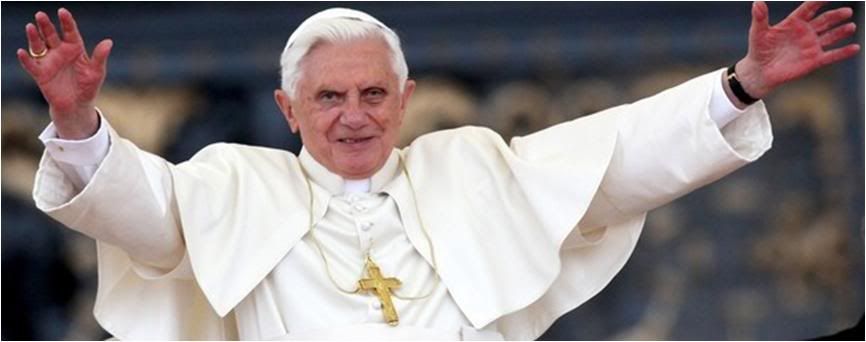
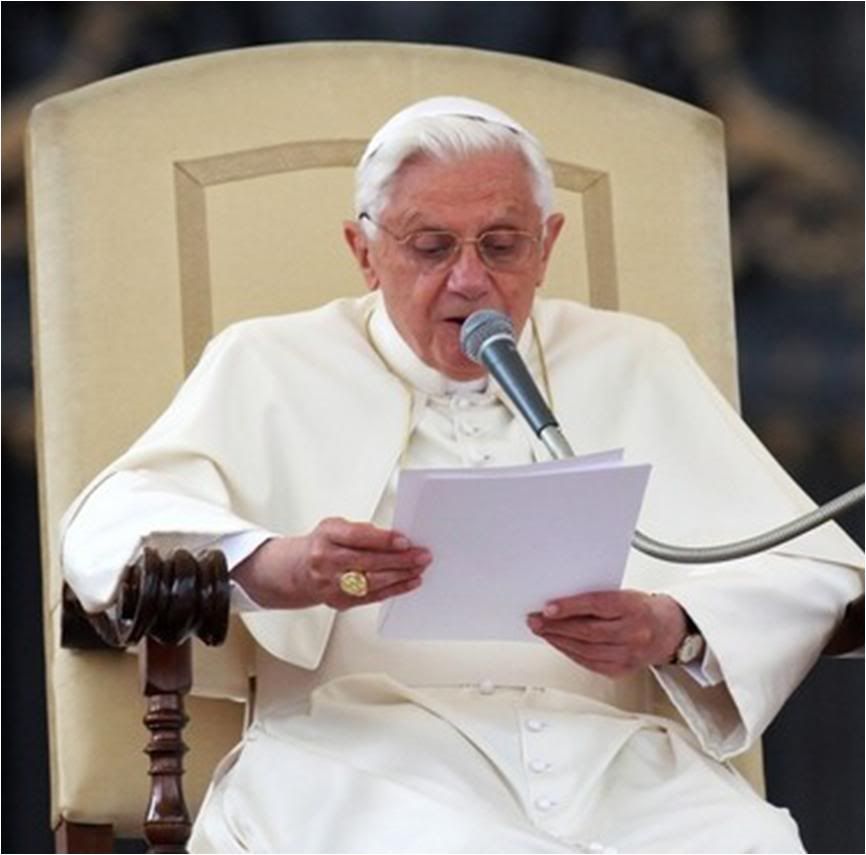 Here is a translation of the Pope's catechesis:
Here is a translation of the Pope's catechesis:
Dear brothers and sisters,
Last Sunday, on my pastoral visit to Turin, I had the joy of pausing in prayer before the Holy Shroud, joining the two million pilgrims who will have comtemplated it for the duration of this exposition.
That sacred cloth can nourish the faith and reinvigorate Christian piety because it urges us to turn to the Face of Christ, to the Body of Christ crucified and risen, to contemplate the Paschal mystery, center of the Christian message.
Of the Body of the risen Christ, who lives and works in history (cfr Rm 12,5), we, dear brothers and sisters, are living members, each according to his own function, namely, with the task that the Lord has entrusted to each of us.
In today's catechesis, I wish to return to the specific tasks of a priest which, according to tradition, are essentially three: to teach, to sanctify, and to govern.
In one of the previous catecheses, I spoke on the first of these missions: teaching, announcing the truth, the announcement of God revealed in Jesus Christ, or - in other words, the prophetic task of putting man in contact with the truth, to holp him recognize what is essential in his life, reality itself.
Today, I wish to dwell briefly with you on the second task that the priest has - to sanctify men, above all through the Sacraments and worship in the Church. We must ask ourselves first, what does the word 'holy' mean?
The answer is: 'holy' is the specific quality of God's being, namely absolute truth, goodness, love, beauty - pure light. To sanctify a person therefore means to put him in contact with God - God as light, truth, pure love.
It is obvious that such contact transforms the person. In antiquity, there was the firm belief that no one could see God without dying right away - so great is the power of truth and light! If man touches this absolute current, he cannot survive.
On the other hand, there was also the conviction that without the least contact with God, man cannot live. Truth, goodness, love are fundamental conditions for his being. The question is: How can man find that contact with God which is fundamental, without dying from being overcome by the grandeur of the divine being?
The faith of the Church tells us that God himself creates this contact, which transforms us gradually into true images of God.
And so we come back to the task of the pirest 'to sanctify'. No man by himself, with his own power, can place another in contact with God. An essential part of the grace of priesthood is the gift, the task, of creating this contact.
This is realized in announcing the Word of God, in which his light comes to us. It is realized in a way that is particularly dense in the Sacraments.
Immersion in the Paschal mystery of death and resurrection takes place in Baptism. it is reinforced at Confirmation and in Reconciliation, it is nourished by the Eucharist - the Sacrament that edifies the Church as the People of God, Body of Christ, Temple of the Holy Spirit (cfr John Paul II, Apost. Exhortation Pastores gregis, No. 32).
It is therefore Christ himself who makes us holy, namely, he draws us into the sphere of God. As an act of his infinite mercy, he calls some to 'be' with him (cfr Mk 3,4) and to become, through the Sacrament of Holy Orders, despite human poverty, participants in his own priesthood, ministers of this sanctification, dispensers of his mysteries, 'bridges' for the encounter with him, for his mediation between God and men, and between men and God (cfr. po,5).
In the last decades, there have been tendencies oriented towards making prevalent - in the identity and the mission of the priest - the dimension of announcement, detaching it from that of sanctification. It is often affirmed that it is necessary to go beyond a ministry that is 'merely' sacramental.
But is it possible to authentically exercise the priestly ministry by 'going beyond' its sacramental function? What does it mean for the priest to evangelize, and what does the so-called primacy of announcement consist of?
As the Gospels say, Jesus affirmed that the announcement of the Kingdom of God was his mission. But this announcement was not merely 'discourse' - it included, at the same time, his actions.
The signs, the miracles, that Jesus worked indicate that the Kingdom is a present reality, and that in the end, it coincides with his own person, with the gift of himself, as we heard today in the Gospel.
The same goes for the ordained ministry: he, the priest, represents Christ, the One sent by the Father. He continues his mission through the 'word' and the 'sacrament', in this totality of body and soul, sign and word.
St. Augustine, in a letter to Bishop Honoratus of Thisbe, affirmed, referring to priests: "They must therefore be servants of Christ, ministers of his word and his sacrament, that which is commanded or allowed" (Epist. 228, 2).
It is necessary to reflect whether, in some cases, undervaluing the faithful exercise of the munus sanctificandi [the duty to sanctify] may not represent a weakening of faith itself in the salvific effectiveness of the Sacraments, and therefore, in the actual working of Christ and his Spirit, through the Church, in the world.
Who therefore saves the world and man? The only answer we can give is - Jesus of Nazareth, Lord and Christ, crucified and risen.
And where is it actualized - the mystery of death and resurrection, which brings salvation? In the action of Christ through the Church, particularly in the Sacrament of the Eucharist, which makes present the redeeming sacrificial offering of the Son of God; in the Sacrament of Reconciliation, in which the death of sin turns into new life; and in every other sacramental act of sanctification (cfr. po, 5).
Therefore it is important to promote a catechesis that is adequate to help the faithful understand the value of the Sacraments, but it is equally necessary, along the exmaple of the Holy Curate of Ars, to be available, generous and attentive in giving our brothers the treasures of grace that God has placed in our hands, and of which we are not 'masters', but custodians and administrators.
Especially in our time, when on the one hand, a profound need and widespread search for spirituality are emerging, it is necessary for every priest to remember that in his mission, missionary announcement and worship and the sacraments must never be separated, and that he must promote a healthy sacramental ministry in order to form the People of God, help them to fully live the Liturgy, worship in church, and the Sacraments as free gifts of God, free and efficacious acts of his saving action.
As I recalled in the Holy Chrismal Mass this year: "At the center of the Church’s worship is the notion of 'sacrament'. This means that it is not primarily we who act, but God comes first to meet us through his action, he looks upon us and he leads us to himself... God touches us through material things... that he takes up into his service, making them instruments of the encounter between us and himself" (Homily, Chrismal Mass, April 1 2010).
The truth according to which in the Sacrament "it is is not primarily we who act" has to do with - and must concern - the consciousness of the priest. Every priest knows well that he is the necessary instrument for God's salvific action, but only the instrument. This consciousness must make him humble and generous in administering the Sacraments, in respecting canonical norms, but also in the profound conviction that his mission is to do everything so that all men, united to Christ, may offer themselves to God as a living and holy host that is pleasing to him (cfr Rm 12,1).
Exemplary in the matter of the primacy of the munus sanctificandi and of the right interpretation of sacramental ministry is, again, St. Jean Marie Vianney, who, one day to a man who said he had no faith and wished to dispute this with him, replied: "Oh my friend, you have addressed the wrong person. I do not know how to reason. But if you have need of some comfort, then go in there" - pointing to the inexorable stool [the confessional] - "where believe me, many others have gone before you, and you will not regret it" (cfr. Monnin A., Il Curato d'Ars. Vita di Gian-Battista-Maria Vianney, vol. i, Torino 1870, pp. 163-164).
Dear priests, live the Liturgy and worship with joy and love - these are actions that the Risen One achieves through the power of the Holy spirit in us, with us and for us.
I wish to renew the invitation to 'return to the confessional' as the place where the Sacrament of Reconciliation is celebrated, but also as a place to 'inhabit' more frequently so that the faithful may find mercy, counsel and comfort, feel himself loved and understood by God, and experience the presence of Divine Mercy alongside the real Presence in the Eucharist" (Address to the Apostolic Penitentiary, March 11, 2010).
I also wish to invite every priest to celebrate and live intensely the Eucharist which is at the heart of the mission to sanctify - it is Jesus who wants to be with us, live in us, give himself, show us the infinite mercy and tenderness of God. It is Christ's unique sacrifice of love that is made present, that is realized among us and reaches to the throne of Grace, to the presence of God, embracing mankind and uniting us to him" (cfr. Address to the Clergy of Rome, Feb. 28, 2010).
And the priest is called to be the minister of this great Mystery, in the Sacrament and in life. If "the great ecclesial tradition has rightly linked the sacramental efficacy of the concrete existential situation of the individual priest, so that the legitimate expectations of the faithful are adequately safeguarded", this does not take away anything "from the necesssary - indeed, indispensable - tension towards moral perfection which should inhabit every heart that is authentically priestly": the People of God rightly expect of their pastors an example of faith and a witness of sacntity. (cfr Benedict XVI, Address to the Plenary Assembly of teh Congregation for the Clergy, March 16, 2009).
It is in the celebration of the Holy Mysteries that the priest finds the root of his sanctification (cfr po, 12-12).
Dear friends, be aware of the great gift that priests are for the Church and for the world. Through their ministry, the Lord continues to save men, to make himself present, to sacntify.
Learn to thank God, and above all, be close to your priests with prayer and with your support, especially in their difficulties, so that they may always be pastors after the heart of God. Thank you.
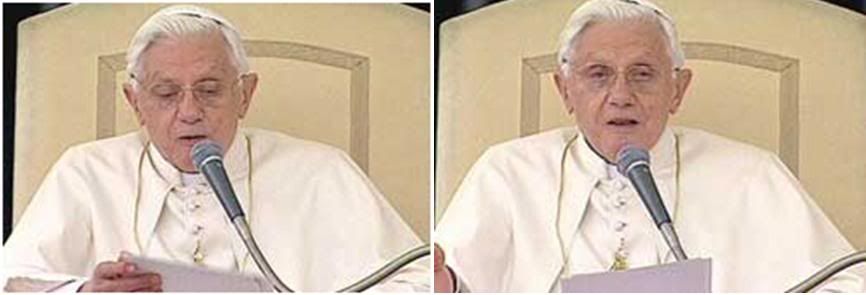
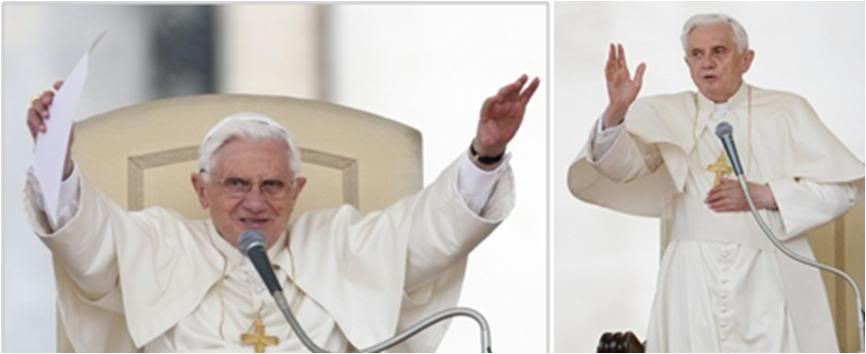
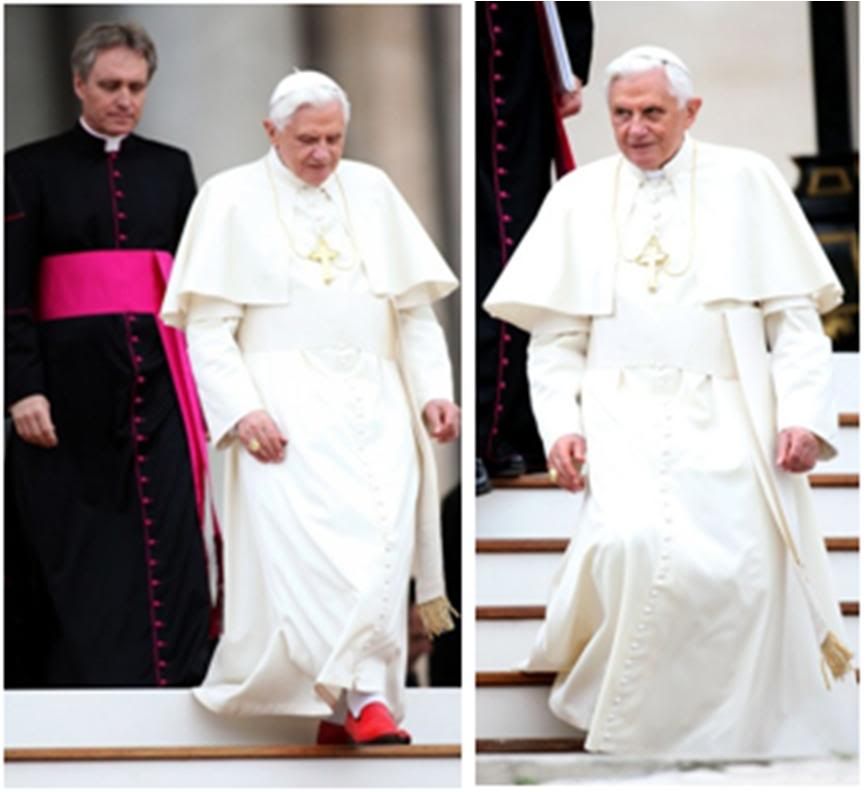
[Modificato da TERESA BENEDETTA 06/05/2010 03:37] |
| |
 06/05/2010 14:24 06/05/2010 14:24 |
|
| | | OFFLINE | | Post: 20.116
Post: 2.756 | Registrato il: 28/08/2005
Registrato il: 20/01/2009 | Administratore | Utente Veteran | |
|
 May 6, Thursday, Fifth Week of Easter
Feast of Saints MARIAN AND JAMES (d North Africa, 259), Martyrs
May 6, Thursday, Fifth Week of Easter
Feast of Saints MARIAN AND JAMES (d North Africa, 259), Martyrs
Little is known about them except that Marian (male) was a lector
and James a deacon, who were both killed for refusing to give up
their faith during the persecutions of the Emperor Valerian.
[And for the third day in a row, I am unable to find any images online for the saint of the day.]
Readings for today's Mass: www.usccb.org/nab/readings/050610.shtml
OR today.
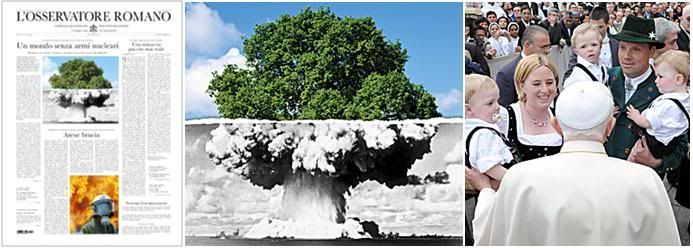
The Pope's appeal to UN conference in New York:
A world without nuclear arms
At the General Audience, Benedict XVI also calls on the faithful
to be close to priests with prayer and support in their difficulties
Also on Page 1: An editorial commentary on the 'more than ever real menace' of nuclear weapons; and a report on
increasingly violent protests in Athens against the Greek government's austerity measures. In the inside pages,
a major excerpt from a lecture given in Rome Wednesday on "Muslim perspectives on Christianity and Judaism'
by Mona Siddiqui, director of the Center for Islamic Studies in Glasgow. She is a Pakistani Muslim who advocates
closer dialog among the monotheistic faiths.
THE POPE'S DAY
The Holy Father met today with
- H.E. Madame Doris Leuthard, President of the Helvetic Confderation (Switzerland), and delegation
- HRH Sheikh Sabah Al-Ahmad Al-Jaber Al-Sabah, Emir of Kuwait, and delegation
- Bishops of Belgium on ad-limina visit, led by Mons. André-Joseph Léonard, Archbishop of Mechlin-Brussels
The Vatican announced that the Holy Father has accepted the resignation of two Irish bishops -
the Auxiliary Bishop of Derry, and the Bishop of Clogher, both for having reached canonical retirement age,
and named their successors.
[Modificato da TERESA BENEDETTA 06/05/2010 17:23] |
| |
 06/05/2010 15:54 06/05/2010 15:54 |
|
| | | OFFLINE | | Post: 20.117
Post: 2.757 | Registrato il: 28/08/2005
Registrato il: 20/01/2009 | Administratore | Utente Veteran | |
|
 My first reaction on seeing this article today was annoyance that Fr. Komonchak persists in the 'Gotcha!' mode that he has taken in the past, particularly with respect to Joseph Ratzinger's early comments on Vatican II, which he sees as contradictory to what he has later written and said as theologian, cardinal and Pope.
My first reaction on seeing this article today was annoyance that Fr. Komonchak persists in the 'Gotcha!' mode that he has taken in the past, particularly with respect to Joseph Ratzinger's early comments on Vatican II, which he sees as contradictory to what he has later written and said as theologian, cardinal and Pope.
But my second reaction is that it is good he has provided the occasion to look back at what Joseph Ratzinger wrote about 'the Holy Catholic Church' in the Apostles' Creed. Especially since Komonchak's letter willfully misrepresents what Prof. Ratzinger wrote, as will be clear to anyone who goes back and reads pp 338-347 in the final chapter of Introduction to Christianity. Komonchak has taken a cheap shot that is completely off the mark, just as equally gratuitous, and intellectually dishonest.
'The Holy Catholic Church'
we profess daily in the Creed -
and we sinners who are in it
The dispute over the 'sins of the Church' rages on. In his 1969
bestselling 'Introduction to Christianity', Prof. Ratzinger explained
why "the divine so often presents itself in such unworthy hands."
The message is more than ever relevant.

ROME, May 6, 2010 – The article from www.chiesa one week ago on the concept of the "sinner Church" has provoked lively agreement and disagreement.
Among those who disagree is Joseph A. Komonchak, a priest of the archdiocese of New York, historian and theologian, editor of the American edition of the History of Vatican II edited by Giuseppe Alberigo, and prominent witer for the magazine Commonweal.
He writes:
Dear Sandro Magister:
In your recent post, you say that the present Pope has never made his own the idea that the Church may be said to be sinful. But in fact, in his Introduction to Christianity, written of course before he became Pope he uses this language. He even speaks of Vatican II as having been too "timorous" in its statement that the Church is not only holy but sinful, "so deeply aware are we all of the sinfulness of the Church" (English Translation, p. 262).
He is here following, I believe, the view of St. Augustine, repeated in St. Thomas Aquinas, that the Church will not be "without spot or wrinkle" until the End. Both great saints then cite 1 John 1: "If we sat that we are without sin, we deceive ourselves and the truth is not in us." And every day, the Church everywhere prays: "Forgive us our debts."
Cardinal Biffi is correct on the use of the phrase "casta meretrix," but, of course, the issue is not settled by that matter alone. By the way, on at least one occasion, on a visit to Fatima, Pope John Paul II spoke of the Church as "both holy and sinful."
Sincerely yours,
Joseph A. Komonchak
Fr. Komonchak is correct when he cites John Paul II. On the first of his three trips to Fatima, the one in 1982, and in the first of the seven speeches that he gave in that city, he in effect said that he had come there "as a pilgrim among pilgrims, in this assembly of the pilgrim Church, of the living Church, holy and sinful."
But it must be noted that, in the vast volume of this Pope's speeches, this is the only time in which the adjective "sinful" is found to be applied directly to the Church.
A prudence that is all the more remarkable in that it was adopted by a Pope who went down in history as the one who asked repeatedly and publicly for forgiveness for the sins of the Church's children.
Both for John Paul II and for his prefect of doctrine, Cardinal Joseph Ratzinger, in fact, the formula "sinful Church" was seen as being dangerously misleading, because of its unresolved contradiction with the profession of faith in the "holy Church" found in the Creed.
Proof of this fear is in the note on "The Church and the faults of the past" published on March 7, 2000 by the International Theological Commission under Cardinal Ratzinger as CDF Prefect, by way of comment and clarification on the requests for forgiveness made by John Paul II during that jubilee year.
In it, there is a passage dedicated precisely to explaining why the Church "is also in a certain sense sinner," and to suggesting how to express this concept in terms that are not misleading, in the first paragraph of the third section of the note, dedicated to the "theological foundations" of the request for forgiveness:
Hence it is appropriate that as the second millennium of Christianity draws to a close the Church should become ever more fully conscious of the sinfulness of her children, recalling all those times in history when they departed from the spirit of Christ and his Gospel and, instead of offering to the world the witness of a life inspired by the values of faith, indulged in ways of thinking and acting which were truly forms of counter-witness and scandal.
Although she is holy because of her incorporation into Christ, the Church does not tire of doing penance. Before God and man, she always acknowledges as her own her sinful sons and daughters" (Tertio millennio adveniente, 33).
These words of John Paul II emphasize how the Church is touched by the sin of her children.
She is holy in being made so by the Father through the sacrifice of the Son and the gift of the Spirit. She is also in a certain sense sinner, in really taking upon herself the sin of those whom she has generated in Baptism.
This is analogous to the way Christ Jesus took on the sin of the world (cf. Rom 8:3; 2 Cor 5:21; Gal 3:13; 1 Pt 2:24). Furthermore, in her most profound self-awareness in time, the Church knows that she is not only a community of the elect, but one which in her very bosom includes both righteous and sinners, of the present as well as the past, in the unity of the mystery which constitutes her.
Indeed, in grace and in the woundedness of sin, the baptized of today are close to, and in solidarity with, those of yesterday. For this reason one can say that the Church – one in time and space in Christ and in the Spirit – is truly "at the same time holy and ever in need of purification" (Lumen Gentium, 8).
It is from this paradox, which is characteristic of the mystery of the Church, that the question arises as to how one can reconcile the two aspects: on the one hand, the Church’s affirmation in faith of her holiness, and on the other hand, her unceasing need for penance and purification.
The paragraph just cited also recalls the passage in which Vatican Council II speaks of the sins of the Church's children - in paragraph 8 of the constitution Lumen Gentium. Which again avoids defining the Church per se as "sinful":
"While Christ, holy, innocent and undefiled knew nothing of sin, but came to expiate only the sins of the people, the Church, embracing in its bosom sinners, at the same time holy and always in need of being purified, always follows the way of penance and renewal."
Then why did the theologian Ratzinger, in his 1968 Introduction to Christianity, which is still the most widely read book on theology in the entire world, complain – as Komonchak recalls – that Vatican Council II was "too timorous" in speaking of the "sinfulness of the Church," of this sensation of which we are all "so deeply aware"?
[He did not complain in any way! And this is how and where Komonchak is deliberately misleading and misrepresenting. In Chapter 11, Ratzinger was laying the premises for defending why we say in the Creed what we believe in 'the Holy Catholic Church':
We are tempted to say, if we are honest with ourselves, that the Church is neither holy nor catholic: the Second Vatican Council itself ventured to the point of speaking no longer merely of the Holy Church but of the Sinful Church, and the only reproach it incurred was that of still being far too timorous, so deeply aware are we all of the sinfulness of the Church... How then are we to reply? Ultimately, one can only acknowledge why one can still love this Church in faith, why one still dares to recognize in the distorted features the countenance of the Holy Church.
Then he goes on to the excerpts Magister quotes below.
The only way to answer this question is to revisit what Ratzinger wrote in that book, in the last chapter, which is dedicated to explaining why the Church is "holy" even though it is made up of sinners.
In effect, it is precisely in its relationship with the sin and "filth" of the world that the Church's holiness most shines. Written more than forty years ago, these arguments by Ratzinger are of stunning relevance. Including when they recall the meaning and limitations of the accusations brought against the Church, then as now.
Here are the main passages, taken from the final chapter of Introduction to Christianity. Passages in which, once again, the formula "sinful Church" never appears.
"THE HOLY CATHOLIC CHURCH"
from Chapter 11
Introduction to Christianity
by Joseph Ratzinger
...The holiness of the Church consists in that power of sanctification which God exerts in it in spite of human sinfulness. We come up here against the real mark of the "New Covenant": in Christ God has bound himself to men, has let himself be bound by them.
The New Covenant no longer rests on the reciprocal keeping of the agreement; it is granted by God as grace which abides even in the face of man's faithlessness. It is the expression of God's love, which will not let itself be defeated by man's incapacity but always remains well-disposed towards him, welcomes him again and again precisely because he is sinful, turns to him, sanctifies him and loves him.
Because of the Lord's devotion, never more to be revoked, the Church is the institution sanctified by him forever, an institution in which the holiness of the Lord becomes present among men.
But it is really and truly the holiness of the Lord that becomes present in it and that chooses again and again as the vessel of its presence – with a paradoxical love – the dirty hands of men. It is holiness that radiates as the holiness of Christ from the midst of the Church's sin.
So to the faithful the paradoxical figure of the Church, in which the divine so often presents itself in such unworthy hands, in which the divine is only ever present in the form of a "nevertheless", is the sign of the "nevertheless" of the ever greater love shown by God.
The existing interplay of God's loyalty and man's disloyalty which characterizes the structure of the Church is grace in dramatic form. [. . .] One could actually say that precisely in its paradoxical combination of holiness and unholiness the Church is in fact the shape taken by grace in this world.
Let us go a step further. In the human dream of a perfect world, holiness is always visualized as untouchability by sin and evil, as something unmixed with the latter. [. . .] In contemporary criticism of society and in the actions in which it vents itself, this merciless side always present in human ideals is once again only too evident.
That is why the aspect of Christ's holiness that upset his contemporaries was the complete absence of this condemnatory note – fire did not fall on the unworthy nor were the zealous allowed to pull up the weeds which they saw growing luxuriantly on all sides.
On the contrary, this holiness expressed itself precisely as mingling with the sinners whom Jesus drew into his vicinity; as mingling to the point where he himself was made "to be sin" and bore the curse of the law in execution as a criminal – complete community of fate with the lost (cf. 2 Cor. 5.21; Gal. 3.13). He has drawn sin to himself, made it his lot and so revealed what true "holiness" is: not separation but union, not judgment but redeeming love.
Is the Church not simply the continuation of God's deliberate plunge into human wretchedness; is it not simply the continuation of Jesus's habit of sitting at table with sinners, of his mingling with the misery of sin to the point where he actually seems to sink under its weight?
Is there not revealed in the unholy holiness of the Church, as opposed to man's expectation of purity, God's true holiness, which is love, love which does not keep its distance in a sort of aristocratic, untouchable purity but mixes with the dirt of the world, in order thus to overcome it?
Can therefore the holiness of the Church be anything else but the mutual support which comes, of course, from the fact that all of us are supported by Christ? [. . .]
At bottom there is always hidden pride at work when criticism of the Church adopts that tone of rancorous bitterness which today is already beginning to become a fashionable habit.
Unfortunately it is accompanied only too often by a spiritual emptiness in which the specific nature of the Church as a whole is no longer seen, in which it is only regarded as a political instrument whose organization is felt to be pitiable or brutal, as the case may be, as if the real function of the Church did not lie beyond organization, in the comfort of the Word and of the sacraments which she provides in good and bad days alike.
Those who really believe do not attribute too much importance to the struggle for the reform of ecclesiastical ritual. They live on what the Church always is; and if one wants to know what the Church really is one must go to them.
For the Church is most present not where organizing, reforming and governing are going on but in those who simply believe and receive from her the gift of faith that is life to them.
This does not mean that everything must be left undisturbed and endured as it is. Endurance can also be a highly active process, a struggle to make the Church herself more and more that which supports and endures.
After all, the Church does not live otherwise than in us; she lives from the struggle of the unholy to attain holiness, just as of course this struggle lives from the gift of God, without which it could not exist. But this effort only becomes fruitful and constructive if it is inspired by the spirit of forbearance, by real love.
And here we have arrived at the criterion by which that critical struggle for better holiness must always be judged, a criterion that is not only not in contradiction with forbearance but is demanded by it. This criterion is constructiveness. A bitterness that only destroys stands self-condemned. A slammed door can, it is true, become a sign that shakes up those inside.
But the idea that one can do more constructive work in isolation than in fellowship with others is just as much of an illusion as the notion of a Church of "holy people" instead of a "holy Church" that is holy because the Lord bestows holiness on her as a quite unmerited gift...
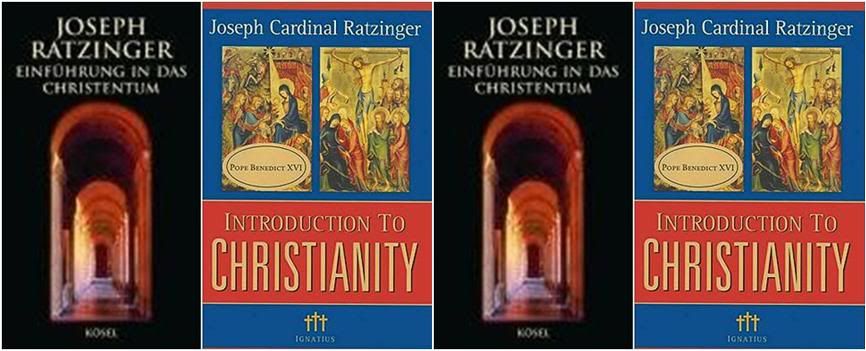
 
[Modificato da TERESA BENEDETTA 07/05/2010 18:15] |
| |
 06/05/2010 19:58 06/05/2010 19:58 |
|
| | | OFFLINE | | Post: 20.119
Post: 2.759 | Registrato il: 28/08/2005
Registrato il: 20/01/2009 | Administratore | Utente Veteran | |
|
 POPE RECEIVES
POPE RECEIVES
2 GUESTS OF STATE
The Holy Father today received the President of the Swiss Confederation and the Emir of Kuwait in two separate audiences, described separately in communiques from the Vatican Press Office.
WITH THE SWISS PRESIDENT
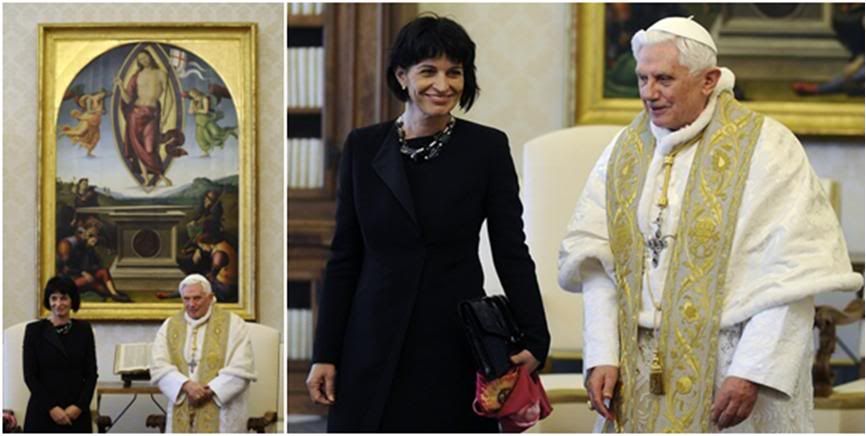
This morning, the Holy Father had an audience with H.E. Madame Doris Leuthard, president of the Helvetic Confederation (Switzerland), who later met with Cardinal Tarcisio Bertone, Secretary of State, and Mons. Dominique Mamberti, Secretary for Relations with States.
During their cordial conversation, other than recalling the President's timely participation in the oath-taking of new Swiss Guards for the Pope today, they also discussed socio-economic issues and questions pertaining to the current international situation, with particular reference to inter-religious dialog.
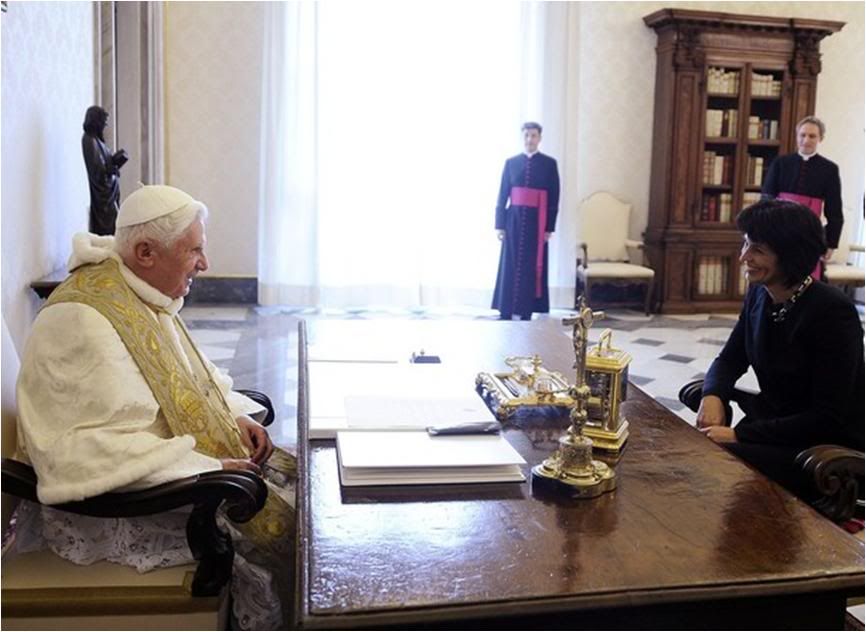
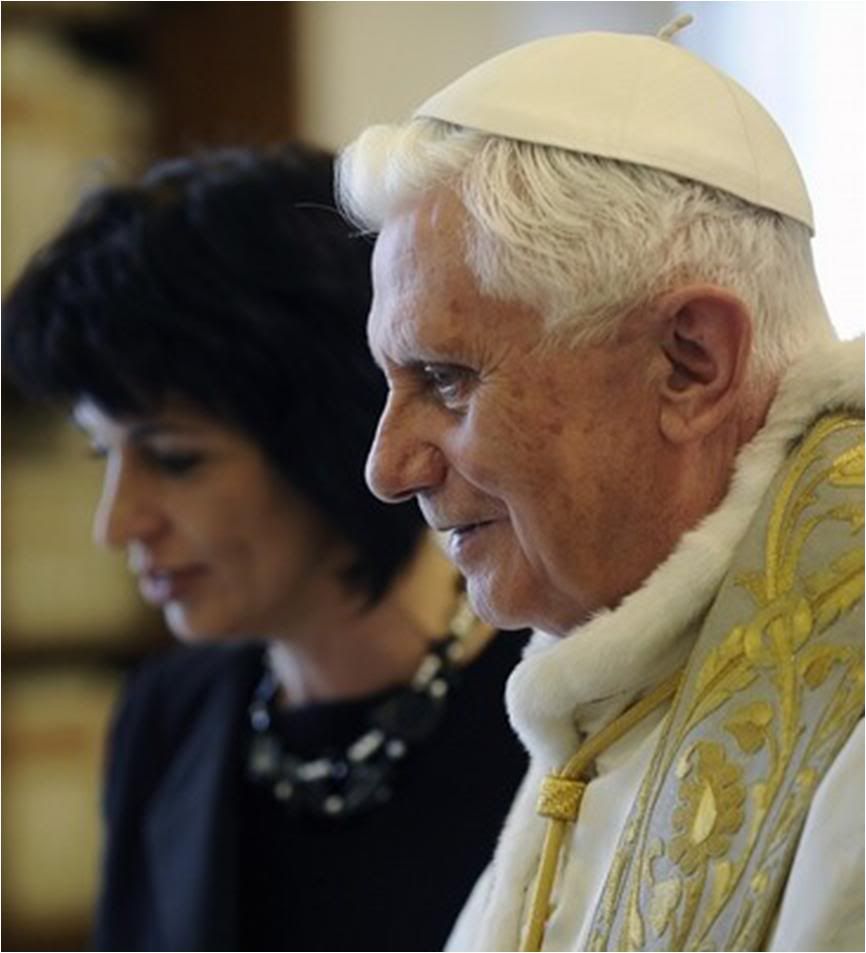 The Swiss information agency was more informative:
Leuthard brings up
The Swiss information agency was more informative:
Leuthard brings up
sex abuse with Pope

ROME,May 6 - Swiss President Doris Leuthard has discussed the issue of child sex abuse during a private audience with Pope Benedict XVI.
Leuthard, on a visit to the Vatican to mark the swearing in of new recruits to the pontiff’s Swiss Guard, also discussed the Swiss vote to ban the construction of minarets and the place of burkas in Swiss society.
“The Pope stressed that young people must be protected,” she told the media afterwards. “But he added that the problem of paedophilia affects not just the Church but all of society.”
She added that the Pope took the problem of sex abuse in the Church "very seriously and does not want in any way to brush this affair under the carpet".
They also discussed the role of Islam and freedom of religion, which the Pope said had to be practised throughout Europe.
“Equality and tolerance towards Christians in Islamic states would increase acceptance in our society,” Leuthard added.
Regarding the Swiss Guard, new guardsmen are sworn in every year in May in St Peter’s Square. A Mass also takes place in memory of 147 Swiss Guards who died in 1527 defending Pope Clement VII during the Sack of Rome.
The Swiss Vatican Guard is known as the smallest army in the world and comprises 110 men. It reports to the Pope and is financed by the Vatican.
WITH THE EMIR OF KUWAIT
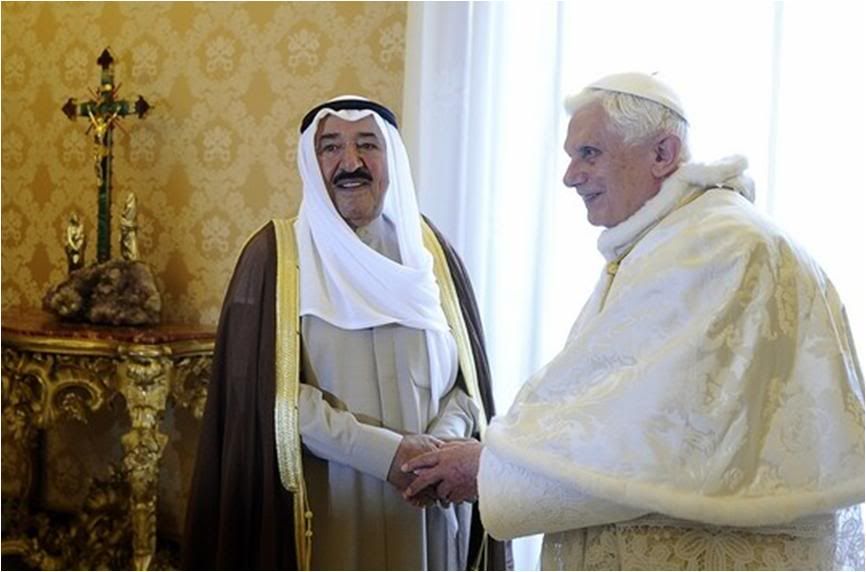
This morning the Holy Father Benedict XVI received in audience His Highness Sheikh Sabah Al-Ahmad Al-Jaber Al-Sabah, emir of Kuwait. Sheikh Sabah subsequently went on to meet with Cardinal Secretary of State Tarcisio Bertone S.D.B. who was accompanied by Archbishop Dominique Mamberti, secretary for Relations with States.
During the cordial discussions, attention turned to certain questions of mutual interest, with particular reference to the promotion of peace in the Middle East, and of inter-religious dialogue. The positive contribution that the significant Christian minority makes to Kuwaiti society was also highlighted, and consideration given to the particular needs of that minority.
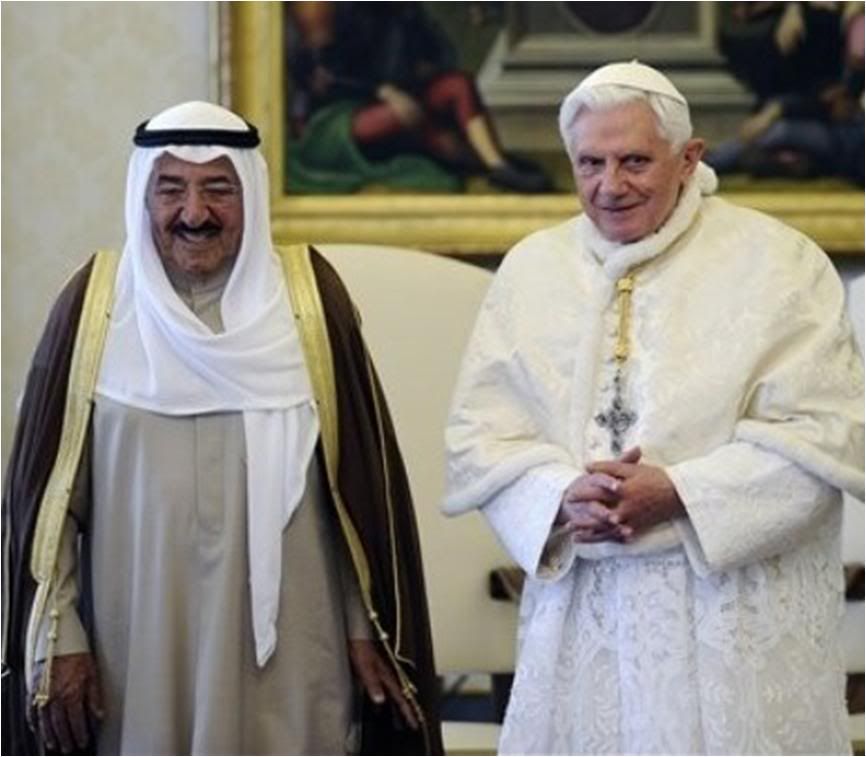
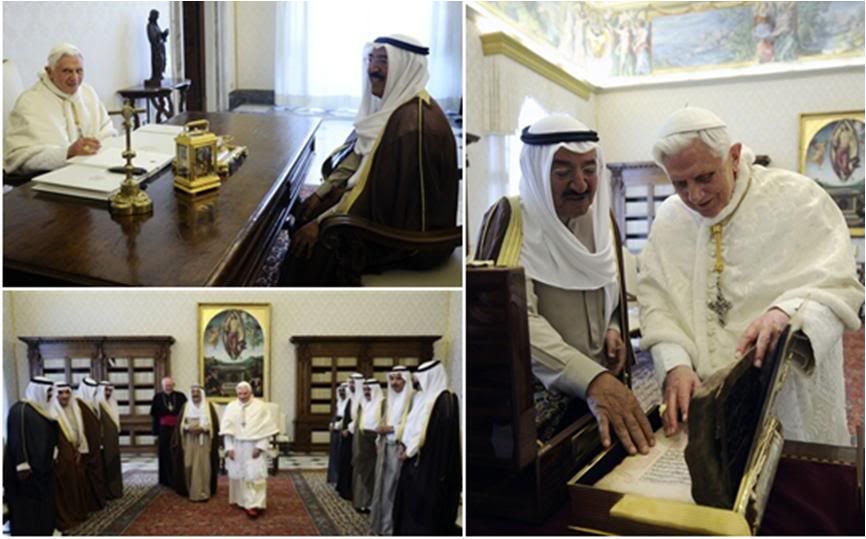
[Modificato da TERESA BENEDETTA 06/05/2010 21:27] |
| |
 06/05/2010 21:08 06/05/2010 21:08 |
|
| | | OFFLINE | | Post: 20.120
Post: 2.760 | Registrato il: 28/08/2005
Registrato il: 20/01/2009 | Administratore | Utente Veteran | |
|
 For whatever it's worth, here's another poll that shows that the 'plummeting' numbers as late as two weeks ago were obviously influenced by the latest news headlines on the 'sex abuse scandal' at the time the polls were taken. The headline is more rosy than the actual numbers show, but since the Pope's trip to Malta, no one has managed to come up with a stink bomb to hog the headlines, knock on wood...
Zogby: US Catholics
For whatever it's worth, here's another poll that shows that the 'plummeting' numbers as late as two weeks ago were obviously influenced by the latest news headlines on the 'sex abuse scandal' at the time the polls were taken. The headline is more rosy than the actual numbers show, but since the Pope's trip to Malta, no one has managed to come up with a stink bomb to hog the headlines, knock on wood...
Zogby: US Catholics
strongly back Pope Benedict

Wednesday, 05 May 2010
Results of a new Zogby Interactive survey show mixed results among American Catholics' evaluations of Catholic Church leaders.
Both Pope Benedict XVI and American Catholic Bishops receive largely negative ratings in their handling of the sexual abuse situation with the church. [From the numbers cited below, the writer of this article apparently considers a 'fair' rating negative, in a choice from excellent, good, fair and poor.]
However, pluralities approve of the overall job performance of both the Pope and Bishops. In addition, a clear majority of American Catholics believe Pope Benedict XVI should continue to serve as Pope.
Fifty-six percent of American Catholics approve of the overall job that Pope Benedict XVI is doing, with 32 percent disapproving. Approval of U.S. Bishops is somewhat lower, with 45 percent approving of their overall job, and 44 percent disapproving.
When asked specifically about how Pope Benedict XVI has dealt with the sexual abuse situation within the Catholic Church, a plurality of American Catholics give negative ratings to both the Pope and American Catholic Bishops.
Only 15 percent believe that Pope Benedict XVI has done an "excellent" job addressing the sexual abuse situation within the Church, with 23 percent believing he has done a good job, 26 percent believing he has done a fair job and 30 percent believing he has done a poor job. [How does 15(excellent) + 23(good) + 26(fair) = 64%, vs 30%(poor), qualify as negative???]
Ratings for American Bishops are lower, with 8 percent rating the Bishops' efforts to address the sexual abuse situation within the Church as excellent, 12 percent rating their efforts as good, 29 percent rating their efforts as fair and 43 percent rating their efforts as poor.
Finally, though a plurality give Pope Benedict XVI a "poor" rating on addressing sexual abuse within the Church, a clear majority of American Catholics believe Pope Benedict XVI should remain Pope. Only 16 percent believe the Pope should resign as a result of sexual abuse within the Church, while 64 percent believe he should continue as Pope, and 20 percent are unsure.
Additional results from this survey will be formally released by John Zogby in a speech to the National Catholic Reporter on May 6, 2010. This interactive survey, conducted by Zogby International Apr. 30 through May 3, 2010, has a sample size of 705 Catholics nationwide.
A sampling of Zogby International's online panel, which is representative of the adult population of the U.S., was invited to participate. Slight weights were added to region, age, race, gender and education to more accurately reflect the Catholic population. The margin of error is +/- 3.8 percentage points. Margins of error are higher in sub-groups.
And what are we to make of the following article? HK woke up on the right side of the bed, for a change?
And after setting fires,
'second thoughts' from Hans Kueng?
by Jonathan Luxmoore

May 4, 2010
Vatican critic Hans Küng has warned against "condemning the Church and its priests wholesale" for the current spate of sex abuse allegations.
"It would be a bad generalisation to place the whole clergy and Catholic Church under suspicion," the Roman Catholic priest was quoted as saying in an interview with The European, a Berlin-based online news service, published on April 27.
Mr Küng also said he still agrees with Pope Benedict XVI on some key issues.
The 83-year-old Swiss-born theologian was speaking two weeks after criticising the Pope in an "open letter" to Roman Catholic bishops worldwide in which he said Benedict's papacy had "failed".
In the letter, Mr Küng said there had been a "worldwide system of covering up cases of sexual crimes" by clergy by the Vatican's Congregation for the Doctrine of the Faith, which was led by Cardinal Joseph Ratzinger, before he became Pope Benedict XVI in 2005.
However, in his interview with The European, Mr Küng described as "complete nonsense" claims that the present Pope is the "the worst for centuries". [COLORE=#1216FF [Well, Sir, you have certainly done your best to make it appear so!]
He said, "In the course of its five years, this pontificate has seen many breakdowns, as well as many wasted chances, above all in its approach to Protestant churches."
The theologian added, "But we still need a Petrine [papal] office to serve the unity of Christians, though not a Roman papacy as it developed in the 11th century."
Mr Kung, whose works include Infallible?, which questioned papal authority, served as an expert advisor at the 1962-1965 Second Vatican Council, which introduced reforms into the life of the Catholic Church.
He also taught alongside Ratzinger at the University of Tübingen in the 1960s. In 1979 his licence to teach Catholic theology was withdrawn by the Vatican after it ruled he could "no longer be considered a Catholic theologian".
In his interview, Mr Küng said he believed the Pope had missed an opportunity to consolidate links with Jews and Muslims, but added that it would be "totally inadmissible" to compare Benedict XVI with "immoral and criminal" popes in history. [And we should say 'Thank you' for that?]
"The Pope and I are united on the relationship between reason and science, the necessity of dialogue between religions and the need for worldwide ethics, even if my hopes of a reformist course have not been fulfilled," Mr Küng said.
:: Interview in The European (in German): www.theeuropean.de/kueng-hans/2950-papst-benedikt-in-der-kritik
I've read the interview. The above news item based on it omits two important statements - one at the very start, the other at the every end.
In the beginning, Kueng says:
It is false to say that in the letter [to the bishops of the world!], I called on the bishops to break up with the Pope. On the contrary, they must be loyal to the Pope but at the same time they must speak out their criticisms openly. [As if outspoken dissident bishops needed Kueng to tell them that!] That was my first appeal to the bishops...
In the end, he reproaches the interviewer:
It is always astounding to me, that even someone as well-informed as you are, could think that I am no longer a priest. [Probably because his behavior during all the decades that he has been in the limelight was never particularly priestly. And although everyone calls him a theologian, MSM has more or less treated him as a secular figure, not a religious or spiritual one!]
I am a priest now as I was before, with all the rights imposed on me by ordination. But I see my criticism of the institution as a service to the Church, and thus I have been a critical Christian and Catholic.
And somewhere in the middle, he reveals that he and Joseph Ratzinger have never addressed each other with the second person familiar form ('du' in German) because 'that was not the practice in German universities'. [Whereas we have read that after he became Pope, Benedict XVI specifically said to at least two German cardinal friends - Lehmann and Meisner - that they must continue to use 'du' with him. Too bad the interviewer did not ask the obvious question, how did they address each other in Castel Gandolfo? Did Kueng say "Heilige Vater" and did the Pope call him 'Pater Hans' or 'Herr Professor'??? [Sorry for the trivia!]
[Modificato da TERESA BENEDETTA 06/05/2010 22:14] |
| |
 07/05/2010 13:42 07/05/2010 13:42 |
|
| | | OFFLINE | | Post: 20.122
Post: 2.762 | Registrato il: 28/08/2005
Registrato il: 20/01/2009 | Administratore | Utente Veteran | |
|


 PORTUGAL PREPARES
PORTUGAL PREPARES
TO WELCOME THE POPE
I thought the pre-visit coverage in the American media was the most extensive one could possibly expect of a papal visit...but I had a most pleasant surprise last night when I did a Portuguese language search for material on the papal visit - to find that in addition to the official site - whose many pre-visit materials are being used on the sites online that reference the papal visit,

the whole spectrum of Portuguese society appears to be into it, if one judges by the sites, in which even bookstores and publishing houses, for instance, are joining in (advertising all the Portuguese editions of the Ratzinger/Benedict XVI oeuvre).
On top of that, the official site which had been rather scarce with news, erupted in the past three days with a bonanza of pre-visit news items whose headlines alone take up three pages of a 6-point printout on Word! Amazing... (However, I'm still figuring out how to present the highlights bestm as I have to translate everything).
Anyway, here is a sampling of sites other than the official sites....
Starting with the Portuguese Ministry of Foreign Affairs:
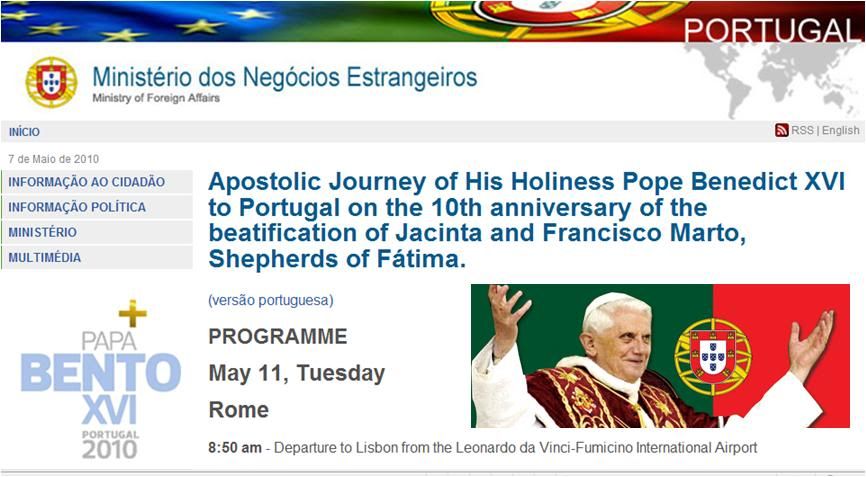 A 'People'-type popular magazine:
A 'People'-type popular magazine:
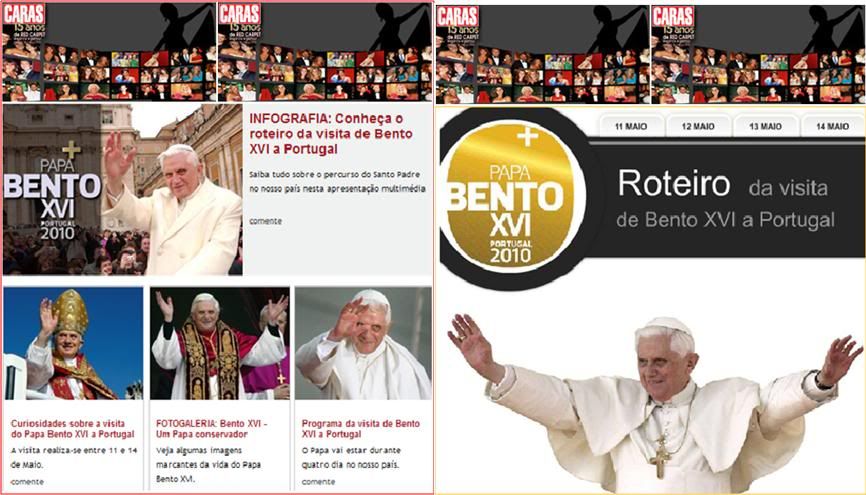 NB: The CARAS 'roteira' - an event-by-event locator of the four-day papal visit - is semi-animated.
Right, a labor union site; right, a parish site.
NB: The CARAS 'roteira' - an event-by-event locator of the four-day papal visit - is semi-animated.
Right, a labor union site; right, a parish site.
 A very good private site.
A very good private site.
 Among other things, it has about 30 pre-visit videoclips right now...
The event map from a TV site:
Among other things, it has about 30 pre-visit videoclips right now...
The event map from a TV site:
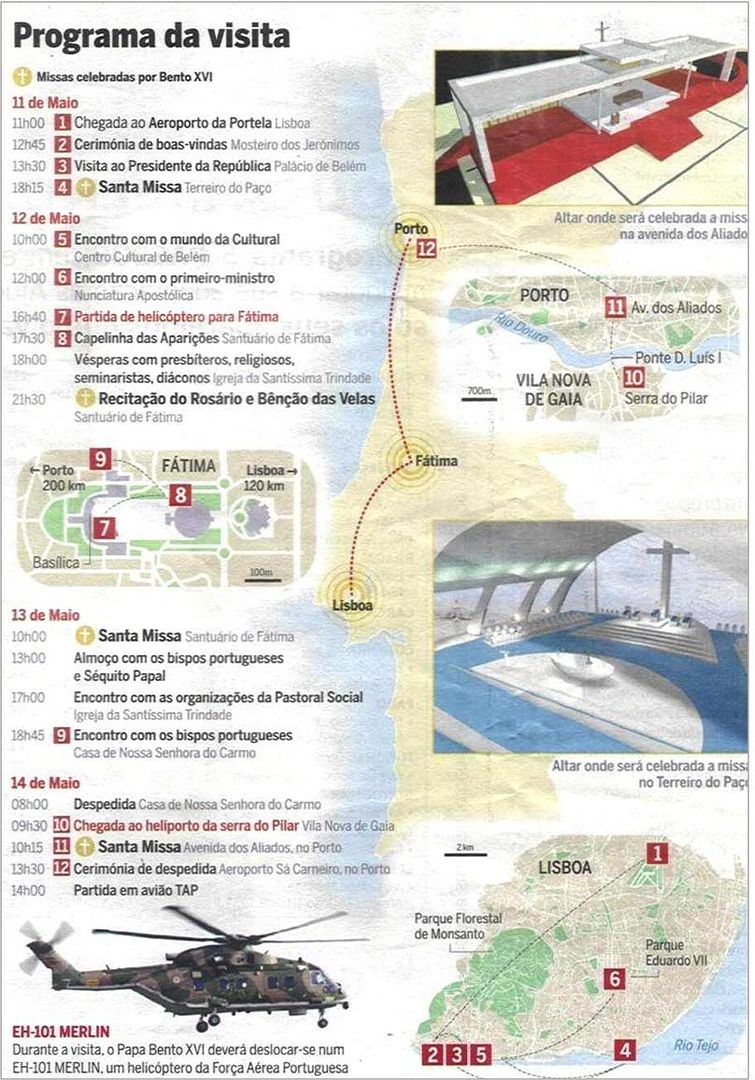 Anticipating the Pope's visit
Anticipating the Pope's visit

Lisbon, Portugal (EWTN News) - Pope Benedict XVI will be welcomed to Portugal next week by a population that is nearly 90 percent Catholic. Final preparations for the Holy Father's visit to the country are coming together and interest in the visit is reaching a peak.
With the Pope's visit set for May 11-14, statistics about the Catholic Church in Portugal from the Vatican's Central Statistical Office, almost 9.4 million out of the 10.6 million people in the country are Catholic, as of DEc. 31, 2008.
As documented in a flurry of recent updates on the Portuguese bishops' website promoting the trip, www.bentoxviportugal.pt, many Portuguese Catholics and other Christians from abroad will be taking part in the festivities and celebrations organized for Benedict XVI's four days there.
Among the news items released today are reports that a group of 40 young Russian pilgrims will be housed in Portuguese homes for their time in Lisbon and 1,000 young Spaniards will be joining a group of 3,000 local youths for Mass in the capital, who plan to serenade the Pope at the Apostolic Nunciature on the night of May 11.
A documentary on the Pope for the visit is entitled "Pope Benedict XVI: A Love Affair with the Truth."
Sr. Angela Coleman, the vice postulator for the canonization cause of the shepherd children of Fatima, told Agência Ecclesia in an interview that she is encouraged that the Pope's visit could revive interest in the message of Fatima.
The Occasion for the Pope's visit is to celebrate the 10th anniversary of the beatification of the shepherd children, Jacinta and Francisco Marto.
[Modificato da TERESA BENEDETTA 08/05/2010 02:58] |
| |
 07/05/2010 15:03 07/05/2010 15:03 |
|
| | | OFFLINE | | Post: 20.123
Post: 2.763 | Registrato il: 28/08/2005
Registrato il: 20/01/2009 | Administratore | Utente Veteran | |
|
 May 7, Friday, Fifth Week of Easter
May 7, Friday, Fifth Week of Easter
 Second from right: Canonization rites for St. Rosa and four others in October 2006.
ST. ROSA VENERINI (b Viterbo 1656, d Rome 1728), Virgin, Founder of the Maestre Pie Venerini
Second from right: Canonization rites for St. Rosa and four others in October 2006.
ST. ROSA VENERINI (b Viterbo 1656, d Rome 1728), Virgin, Founder of the Maestre Pie Venerini
Viterbo's second Santa Rosa was born more than four centuries after the first one, the mystic who died at age 17. Rosa Venerini always wanted to be a nun and did enter a Dominican convent at age 20, but the death of her well-to-do physician father forced her to go back home to take care of her ailing mother and two siblings. With a sodality of friends who gathered in her house daily to pray the rosary, she was inspired to start a free school for poor girls in 1685. It was so successful that the Bishop of nearby Montefalcone asked her to start one in his diocese. From there on, she went to other places in Italy to start other schools. In Rome, it took her a few years to get going, but Pope Clement XI had heard of her good works, and one day, visited while she was giving a class. She eventually died in the Rome house of what would be recognized after her death as the order of the Maestre Pie Venerini (Pious Teachers of Venerini). At the time of her death, there were 40 Venerini schools in Italy. The order was very active in the United States during the great waves of Italian immigration in the 19th century, and today, it has missions in African and Asia. Mother Rosa was beatified in 1952 and canonized by Benedict XVI in October 2006.
Readings for today's Mass:
www.usccb.org/nab/today.shtml
OR today.
 Papal stories in this issue: The audiences for the President of Switzerland, Doris Lauthert, and the Emir of Kuwait. Other Page 1 stories: Greek PM calls on Parliament to pass austerity plan to keep Greece from falling off the brink; the five veto-wielding permanent members of the UN Security Council support a plan for a nuclear-free Middle East proposed at the current conference on nuclear non-proliferation; off the coast of Louisiana, BP prepares to cap the massive oil leak resulting from an oil rig explosion on April 26, with a giant iron-and-concrete dome to be placed at 1500 meters depth that is expected to keep at least 85% of the leak under control. In the inside pages, there is an extensive interview with Mons. Andre Leonard, Primate of Belgium and Archbishop of Brussels, on the state of the Church in his country.
THE POPE'S DAY
Papal stories in this issue: The audiences for the President of Switzerland, Doris Lauthert, and the Emir of Kuwait. Other Page 1 stories: Greek PM calls on Parliament to pass austerity plan to keep Greece from falling off the brink; the five veto-wielding permanent members of the UN Security Council support a plan for a nuclear-free Middle East proposed at the current conference on nuclear non-proliferation; off the coast of Louisiana, BP prepares to cap the massive oil leak resulting from an oil rig explosion on April 26, with a giant iron-and-concrete dome to be placed at 1500 meters depth that is expected to keep at least 85% of the leak under control. In the inside pages, there is an extensive interview with Mons. Andre Leonard, Primate of Belgium and Archbishop of Brussels, on the state of the Church in his country.
THE POPE'S DAY
The Holy Father met today with
- H.E. Mikheil Saakashvili, President of Georgia, with his wife and delegation
- Bishops of Belgium on ad limina visit (Group 2), meeting separately with the Bishop of Ghent and
the Apostolic Administrator of Bruges (interim replacement for the Bishop who resigned two weeks ago
after admitting to sexual misconduct with a minor)
- Newly-sworn members of the Swiss Guard, with their families
- Mons. Valentino Di Cerbo, recently consecrated Bishop of Alife-Caiazzo (Italy), with his family members
MOSCOW PATRIARCH OFFERS A CONCERT
FOR BENEDICT XVI ON MAY 20
A news conference in the Vatican today presented the program for the 'Days of Russian Culture and Spirituality'
in Rome on May 19-20, with the presence of Archbishop Hilarion, foreign minister of the Moscow Patriarchate,
who will host a concert on May 20 offered to the Holy Father by Patriarch Kirill I, with the Moscow Symphony
Orchestra and other Russian musicians performing at Aula Paolo VI.
|
| |
 07/05/2010 16:15 07/05/2010 16:15 |
|
| | | OFFLINE | | Post: 20.124
Post: 2.764 | Registrato il: 28/08/2005
Registrato il: 20/01/2009 | Administratore | Utente Veteran | |
|
 From the FSSPX multi-lingual information site, DICI, the English version of the letter that Mons. Fellay usually sends out periodically to supporters of the Lefebvrians. Although it is primarily a fund-raising letter, Fellay uses it to spell out the society's positions on current issues, while reiterating its core principles, and is therefore a snapshot of the Lefebvrians at a given point in time. For that reason, I am posting the May 2010 letter in full.
Mons. Fellay on the attacks
From the FSSPX multi-lingual information site, DICI, the English version of the letter that Mons. Fellay usually sends out periodically to supporters of the Lefebvrians. Although it is primarily a fund-raising letter, Fellay uses it to spell out the society's positions on current issues, while reiterating its core principles, and is therefore a snapshot of the Lefebvrians at a given point in time. For that reason, I am posting the May 2010 letter in full.
Mons. Fellay on the attacks
against the Pope and the Church
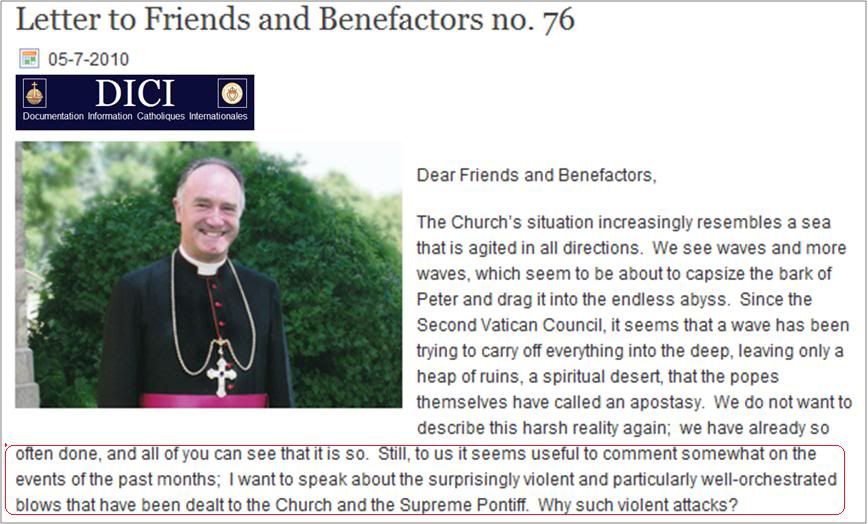 To return to our metaphor, it seems that for some time now, more or less since the beginning of the pontificate of Pope Benedict XVI, a new wave has appeared which is much more modest than the first, yet persistent enough that it is noticeable nevertheless.
To return to our metaphor, it seems that for some time now, more or less since the beginning of the pontificate of Pope Benedict XVI, a new wave has appeared which is much more modest than the first, yet persistent enough that it is noticeable nevertheless.
Contrary to all expectations, this wave seems to be going in the opposite direction compared to the first. The indications are sufficiently varied and numerous, that we can state that this new movement of reform or renewal is quite real. We can see this especially with the younger generations, who are plainly frustrated by the spiritual ineffectiveness of the Vatican II reforms.
Considering the very harsh and bitter reproaches leveled by the progressives against Benedict XVI, it is certain that they see in the very person of the present Pope one of the most vigorous causes of this incipient renewal.
In fact, even if we find the Pope’s initiatives rather timid, they run deep and are contrary to the agenda of the revolutionary, left-leaning world, both inside and outside of the Church, and this is true at several levels.
The resulting irritation of the progressives and of the world is sensed initially in questions concerning morality. Specifically, the Left and the liberals have been irritated despite the Pope’s well-pondered words about the use of condoms in dealing with AIDS in Africa.
As for the life of the Church, the restoration of the Mass of All Ages to its rightful place in 2007, and then two years later the rescinding of the degrading punishment aimed at disqualifying us, provoked the rage of liberals and progressives of all stripes.
Moreover, the felicitous plan of a Year for Priests, restoring the priest to a place of honor, recalling his important and indispensable role in the salvation of souls, and proposing the holy Curé of Ars as a model, is not only an invitation to the Christian people to pray for their priests, but also a call to make use of the Sacrament of Penance, which had completely sunk into oblivion in broad sectors of the Church, and also to foster Eucharistic devotion, calling to mind in particular the importance of adoring Our Lord in the Sacred Host, a clear sign of the reality of the real and substantial presence of Our Lord Jesus Christ.
The appointment of bishops who are distinctly more conservative, some of whom were already celebrating the Tridentine Mass before, is another positive development.
We could cite also, as an undeniable example of the reality of this little wave of opposition, the Letter to the Catholics of Ireland inviting them to repentance, confession, and spiritual exercises and asking also for the adoration of Jesus in the Eucharist.
Even though people in our circles rightly think that these [papal] efforts are still insufficient to stop the decay and the crisis of the Church — especially in view of certain acts along the regrettable line of his predecessor, such as the visits to the synagogue and the Protestant church — in Modernist circles however, the hour has come to report to their battle stations!
The big wave is attacking the very little one with unexpected violence. It is not surprising that the meeting of these two ill-matched waves should cause a lot of backwash and turbulence and give rise to an extremely confused situation in which it is quite difficult to tell and predict which of the two will win the day. This, however, is something new that deserves to be commented.
It is not a question of giving in to thoughtless enthusiasm or believing that the crisis is over. On the contrary, the aging forces that see their gains, which they thought were definitive, being called into question, will no doubt put up a large-scale battle to try to save this dream of modernity which is starting to fall apart. It is very important to remain in this regard, as realistic as possible about what is happening.
Although we rejoice over all the good that is being done in the Church and the world, we nevertheless have no illusions about the seriousness of the present situation.
What should we expect to see in the coming years? Peace in the Church, or war? The victory of good and its long-awaited return, or a new tempest? Will the little wave manage to grow enough to prevail someday?
The assurance that the promise of Our Lady of Fatima will be fulfilled — “in the end my Immaculate Heart will triumph” — does not necessarily or directly resolve our question, because it is still quite possible that we will have to first pass through an even greater tribulation before the long-awaited triumph occurs….
A terrific challenge is also intended by our rosary crusade. We would not want to diminish in the least, the joy over the announcement of the extraordinary result of our Rosary Crusade. We boldly asked you one year ago for twelve million rosaries so as to crown our dear Heavenly Mother, the Mother of God, as if with an equal number of stars, and to surround with a magnificent crown of praise that Mother, who to the enemies of God appears “terrible as an army set in battle array” (Canticle of Canticles 6:3).
You responded so generously that we can now bring to Rome a spiritual bouquet of more than nineteen million rosaries, not counting all those not directly affiliated with our priories and chapels who joined in our campaign.
Surely it is no accident that when Pius XII declared the dogma of the Assumption, he decided to change the Introit of the feast on August 15, to the passage from the Apocalypse that salutes the great sign that appeared in heaven.
This excerpt from the Apocalypse ushers in the description of one of the most terrible wars that are set forth in that sacred Book: the great dragon, who with his tail will sweep away a third of the stars, comes to wage battle with the great Woman (see Apocalypse 12).
Is this whole passage intended for our time? We can easily believe it, while avoiding a literal or overly specific application of those mysterious and prophetic descriptions. We have absolutely no doubt that all our prayers are important, and even of very great importance at this moment in history at which we find ourselves. However we think that we should warn you also and encourage you in these circumstances of the history of the Church.
Your great generosity shows, without the slightest doubt, your very real devotion and your love for our Holy Mother, the Roman Catholic Church, for the Successor of Saint Peter, and for the hierarchy, even though we have much to suffer from it. God is stronger than evil – good will be victorious, but perhaps not with all the pomp that you would like.
Now we must convince the authorities to accomplish the famous consecration of Russia that they say has already been made; we must recall the present relevance of what Our Lady of Fatima said, even though in the year 2000 there was manifestly an attempt to turn a new leaf and not to return to the subject again. [Benedict XVI will undoubtedly refer to the messages of Fatima in a fresh way when he visits there next week.]
It seems inevitable that the difficulties and obstacles will multiply so as to prevent the realization of what we are asking. That doesn’t matter; we count much more on God than on men, just as we expect from acts as simple as the consecration of Russia to the Immaculate Heart of Mary surprising results for the Church and the world, results surpassing anything that we can imagine.
It is foolishness in the sight of men, but it is really a reflection of what Saint Paul already preached to his age: what men regard as wise is foolishness in God’s sight, whereas God’s wisdom is considered absurd foolishness by the wise of this world (cf. 1 Corinthians 1:20).
As we bring to the attention of the Holy Father your remarkable efforts, along with the reason for these prayers, thus hoping to contribute, in our way, to the good of the Church, we ask you to please continue those same efforts.
According to the example that Our Lord Himself invites us to follow in his very moving exhortation to prayer: “Ask, and you shall receive,” let us ask, indeed insisting on much (cf. Matthew 7:7-11). Although we do not doubt that our prayers will be answered, our persistence and perseverance must be proportioned to the magnitude of what we are asking.
Let us remember also that the essential element of the Fatima message is not just the consecration of Russia, but above all devotion to the Immaculate Heart of Mary. May all these prayers and sacrifices lead us to increase and deepen our special devotion to the Heart of the Mother of God. For, through it God wants to be moved.
As the month of May begins, the month of Mary, may we all find ourselves even more reliant on her maternal protection; this is our fondest wish. Thanking you for your truly great generosity, we ask Our Lady to deign to bless you with the Child Jesus.
+ Bernard Fellay
May 1, 2010, Feast of Joseph the Worker
DICI's april bulletin carries an extensive report on 'Behind the denunciations of the pedophile priest scandal' with a country by country summary and the Holy Father's Letter to Irish Catholics.
www.dici.org/en?getfile=4615
DICI has also published the English translation of a recent interview given by Mons. Fellay in which he talks about the current doctrinal discussions between the CDF and the FSSPX on Vatican II questions. I will post it in the CHURCH&VATICAN thread.
[Modificato da TERESA BENEDETTA 07/05/2010 20:03] |
| |
 07/05/2010 18:25 07/05/2010 18:25 |
|
| | | OFFLINE | | Post: 20.125
Post: 2.765 | Registrato il: 28/08/2005
Registrato il: 20/01/2009 | Administratore | Utente Veteran | |
|

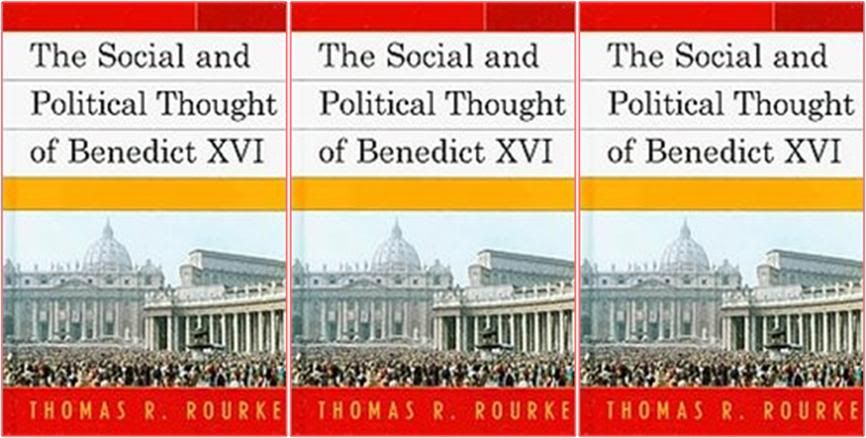 Benedict XVI:
Benedict XVI:
An innovative social thinker of our time
by Russell Shaw
Pewsitter.com
May 6, 2010
On December 6, 1965, as the Second Vatican Council drew to a close, the bishops who’d assembled in Rome from around the world capped four historic years of labor by voting 2,111 to 251 to accept the Pastoral Constitution on the Church in the Modern World, Gaudium et Spes (Joy and Hope). The final, formal vote of approval took place next day.
Here, thought many bishops — and many others as well - was the signature document of Vatican II, its most important achievement. For here the Church at long last engaged contemporary secular culture as a worthy interlocutor and, to some extent, even as a mentor for itself.
Forty-five years later, Gaudium et Spes still stands as a major achievement of Vatican II, but the overall judgment of it by now is mixed. The pastoral constitution, it is commonly pointed out, was in many ways a product of its time and that shows — not for the best either.
For these were the tumultuous, confused 1960s when cultural revolution had entered the mainstream, including even the mainstream of the Church.
In this context, the big problem with Gaudium et Spes is its “uncritical acceptance of modern progressivism,” said to cause Christians to neglect “the necessary distinction between progress conceived politically, economically, and scientifically…and the advancement of the kingdom of heaven.”
This in turn is responsible for a kind of collective amnesia concerning “the most fundamental political insight that faith has to offer,” namely: “that politics is not the working out of the divine plan, that it is essentially limited and anti-utopian, and this for its own good.”
The words quoted here come from an important — and unusual — new book, The Social and Political Thought of Benedict XVI (published by Lexington Books). It is the work of Thomas R. Rourke, professor and chair of the department of political science and philosophy at Clarion University in Pennsylvania. [A review of the book by Fr. Flynn at ZENIT was posted on Page 83 (last post) of this thread.]
Rourke’s study can rightly be called “unusual” for an obvious reason. Although Pope Benedict/Joseph Ratzinger is widely recognized as one of the most important Catholic theological figures of the last half-century, not many people think of him as a significant social thinker as well.
Rourke argues persuasively that this is a mistake. “When we look to the foundation stones of a humane, democratic social order,” he writes, “it would be difficult to find a better guide with more reliable orientation than Benedict XVI.”
The Social and Political Thought of Benedict XVI is a relatively brief but unusually rich working out of that thought.
Benedict-Ratzinger’s critique of Gaudium et Spes and, especially, the starry-eyed reception it received in some quarters after Vatican II clearly marked a turning-point in his career. But his thought has continued to develop since then, producing a body of work that displays a first-rate theological mind grappling with the realities of the contemporary scene.
Pope Benedict’s social encyclical Caritas in Veritate (Charity in Truth), published last year, arguably marks the culmination of this process.
The key concept at the heart of this long document is the intensely personalistic idea that integral human development should be the central value in the formulation and evaluation of social policy. As Benedict puts it: “The truth of development consists in its completeness: if it does not involve the whole man and every man, it is not true development.”
It is barely possible to scratch the surface here. For those who wish to go further, Thomas Rourke’s groundbreaking book is an important guide to mining and applying the insights of an innovative social thinker.
At about the same time, another Benedict XVI watcher who is also an economist was criticizing Hans Kueng's recent statements continuing to blame overpopulation for the world's economic ills.
Hans Küng’s Malthusian moment
By Samuel Gregg

May 5, 2010
In April, the world received yet another global missive from the 82-year-old Swiss theologian, Fr. Hans Küng. Perhaps the world’s most famous Catholic dissenter from Catholic teaching, Fr. Küng’s “open letter” to the world’s Catholic bishops contained his usual critique of the papacy and his now-tediously familiar prescriptions for changing the Catholic Church.
Almost 31 years ago, Rome and Germany’s Catholic bishops stripped Küng of his license to teach as a Catholic theologian because, by Küng’s own admission, he does not believe in some central tenets of the Catholic faith.
Some would say Rome’s action was merely an exercise in ensuring truth in advertizing. This has not stopped Küng, however, from continuing to exhort Catholicism to adopt the path followed by many mainline Protestant confessions in the West since the 1960s.
As George Weigel has noted, Küng’s letter is full of misrepresentations and shoddy logic. Moreover, Küng seems oblivious to the sociological fact that those Christian communities which have embraced paths similar to that which he advocates for Catholicism are in a state of terminal collapse.
Devoid of doctrinal coherence, they are often led by clerics for whom God’s existence and Christ’s Divinity are open questions, whose conception of morality is as relativistic as your average lefty-secularist, but who purport to know with absolute certainty that the world is headed for a climate change-driven apocalypse.
There was, however, one claim in Küng’s letter worth further scrutiny. This was his assertion that Africa – and, by extension, the developing world – is suffering from an “over-population” problem, and that, by implication, Catholicism’s 2,000 years of unbroken teaching on the subject of contraception is dooming millions to poverty and starvation.
It’s hardly a secret that many people disagree with Catholicism’s position on contraception. But Küng’s claim of an “overpopulation” problem in the developing world shows just how much he remains an unreconstructed creature of the 1960s.
Theories concerning a correlation between rapid population growth, poverty, and strains on existing resources have been around since the time of the economist Thomas Malthus (incidentally, an Anglican cleric).
Since Malthus’s death in 1834, his theories have metastasized. In the 1960s, neo-Malthusian ideas achieved new prominence, thanks to the writings of scientists such as Paul Ehrlich. Ehrlich’s 1968 book, The Population Bomb, predicted that the world’s population growth would lead to mass starvation for millions, famines sweeping the globe, skyrocketing commodity-prices, and the dawn of an insurmountable scarcity of resources.
None of these predictions came true.
What Ehrlich and others who have imbibed the “overpopulation” Kool-Aid perennially discount is humanity’s entrepreneurial genius. The economist who did the most to highlight this point and discredit Ehrlich’s thesis was the late Julian Simon.
In his book, The Ultimate Resource (1981/1996), Simon illustrates that the price-rises associated with increasing scarcity of a desirable resource generate incentives for entrepreneurs to discover more quantities of that resource, more efficient uses of that resource, and, eventually, substitutes for that same resource.
In short, given the right institutional conditions and incentives, humans are remarkably good at creating more than enough wealth to feed, cloth, and house increasing populations far beyond basic subsistence levels with enormous surpluses of capital left over for reinvestment – and all without ruthlessly plundering the natural environment. From this perspective, an increasing population can be seen as beneficial: the more people, the more potential creativity and entrepreneurship.
The problem with neo-Malthusians like Ehrlich and Küng is that they see humans primarily as economic consumers rather than economic creators. This is precisely the mentality that helped facilitate Western Europe’s coming demographic winter – a prospect that has caused Sweden (yes, that’s right, über-progressivist hyper-secularist Sweden) to create all sorts of financial incentives for Swedes to have more children.
Somewhat worryingly, the U.S. National Vital Statistics Report for April 2010 shows that America’s birth-rate is now below the replacement fertility rate of 2.1 children per woman.
In his 2009 social encyclical, Caritas in Veritate, Benedict XVI – the primary target of Küng’s most recent public venting – spelled out the economic logic of a declining birth-rate.
“The decline in births,” the Pope wrote, “falling at times beneath the so-called ‘replacement level,’ also puts a strain on social welfare systems, increases their cost, eats into savings and hence the financial resources needed for investment, reduces the availability of qualified labourers, and narrows the ‘brain pool’ upon which nations can draw for their needs” (CV 44).
In this regard, Pope Benedict shows himself as not only more prescient than Hans Küng in terms of helping Catholicism avoid the fate of those Christian communities that have embraced the vacuity and incoherence of liberal Christianity. He’s also a better economist.
Dr. Samuel Gregg is Research Director at the Acton Institute. He has authored several books including On Ordered Liberty, his prize-winning The Commercial Society, and Wilhelm Röpke’s Political Economy.
[Modificato da TERESA BENEDETTA 08/05/2010 05:26] |
| |
 07/05/2010 19:52 07/05/2010 19:52 |
|
| | | OFFLINE | | Post: 20.128
Post: 2.768 | Registrato il: 28/08/2005
Registrato il: 20/01/2009 | Administratore | Utente Veteran | |
|
 Here is a statement from the US-based Fellowship of Catholic Scholars,
Here is a statement from the US-based Fellowship of Catholic Scholars,
www2.catholicscholars.org/
founded in 1977 by Catholic priest teachers in order to adopt 'a more friendly attitude twarods Church teachings' in Catholic universities" in order "to serve Jesus Christ better by helping one another in our work and by putting our abilities more fully at the service of the Catholic faith." Its membership includes clerical and lay teachers at Catholc institutions... I am really surprised that few Catholic organizations and associations have chosen to formally declare their support for the Pope and the Church during thie current anti-Catholic media orgy...
 Sex Abuse, the Catholic Church and Pope Benedict XVI
In light of recent events and media coverage concerning the sexual abuse of minors by members of the Catholic clergy, we would like to express the following resolutions:
Sex Abuse, the Catholic Church and Pope Benedict XVI
In light of recent events and media coverage concerning the sexual abuse of minors by members of the Catholic clergy, we would like to express the following resolutions:
1) We condemn in the strongest possible terms any sexual abuse of minors by any members of the Catholic Church, especially the clergy.
2) We share in a collective sense of sorrow and shame for the harm done to victims of sexual abuse by members of the Catholic clergy.
3) We resolve to pray and fast for all victims of clergy sexual abuse and those who have committed these crimes.
4) We recognize that mistakes have been made in the past by Church authorities in dealing with the sexual abuse of minors, and we applaud all measures to correct these mistakes by conferences of bishops throughout the world. We likewise support more rigorous screening of candidates for the priesthood, especially in the areas of chastity and adherence to Catholic moral teachings.
5) We express our gratitude to Pope Benedict XVI for his leadership and courage in dealing with the problem of sexual abuse within the Catholic Church, and we condemn the unjust attacks made against him by certain elements of the secular media.
6) We condemn as unfair and inaccurate all efforts to link the sexual abuse of minors to the Latin Rite Catholic discipline of priestly celibacy. We likewise affirm consecrated celibacy as a gift to the Catholic Church which, “in many ways, is in harmony with the priesthood” (Vatican II, Presbyterorum ordinis, 16).
7) We recognize the sexual abuse of minors as a grave problem that affects many segments of society. We reject, as inaccurate and unjust, all efforts to portray the sexual abuse of minors as a problem particular to the Catholic Church. We support all efforts of the criminal justice system to deal swiftly and effectively with those who sexually abuse minors in public or private settings.
8) We also call for those accused of any such deeds to be given a fair and timely legal process, so as to protect the innocent and those unfairly accused.
Joseph W. Koterski, S.J.
President, Fellowship of Catholic Scholars
This statement was originally drafted by Dr. Robert Fastiggi of Sacred Heart Major Seminary in consultation with Professor Jane F. Adolphe of Ave Maria School of Law. It is posted here in a slightly expanded form with the approval of Dr. Fastiggi."
 |
| |
 08/05/2010 00:59 08/05/2010 00:59 |
|
| | | OFFLINE | | Post: 20.133
Post: 2.773 | Registrato il: 28/08/2005
Registrato il: 20/01/2009 | Administratore | Utente Veteran | |
|
 POPE MEETS PRESIDENT OF GEORGIA
POPE MEETS PRESIDENT OF GEORGIA

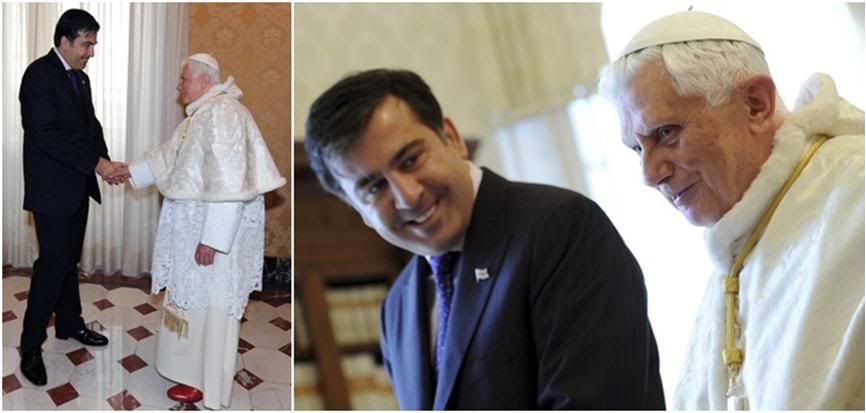 The Vatican released this communique in Italian and English:
The Vatican released this communique in Italian and English:
On Friday 7 May 2010 the Holy Father Benedict XVI received in audience Mikheil Saakashvili, president of Georgia. The president subsequently went on to meet with Cardinal Secretary of State Tarcisio Bertone, who was accompanied by Archbishop Dominique Mamberti, secretary for Relations with States.
The meetings provided an opportunity to examine various bilateral questions, and other important matters concerning life in Georgia, restating the commitment of the parties in favour of intercultural exchange.
In particular, the positive humanitarian contributions made by Caritas to the population were noted, and encouragement given to the peaceful coexistence of believers from various religions, for the sake of the common good.
As regards the situation in the region, the hope was expressed that all difficulties will be overcome through dialogue and negotiation among the parties concerned.
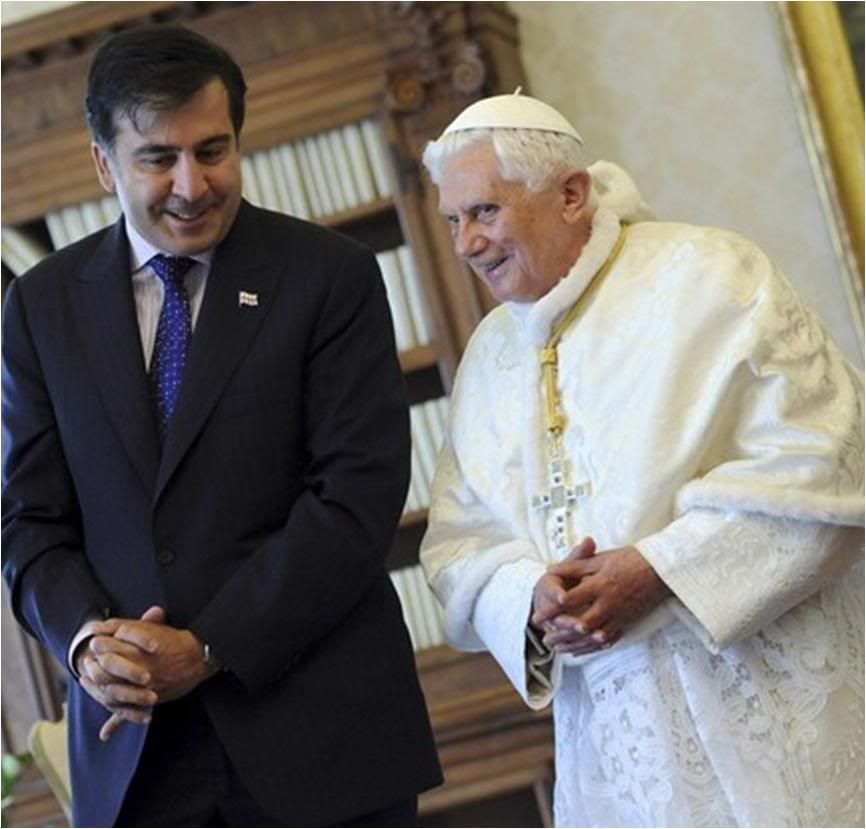
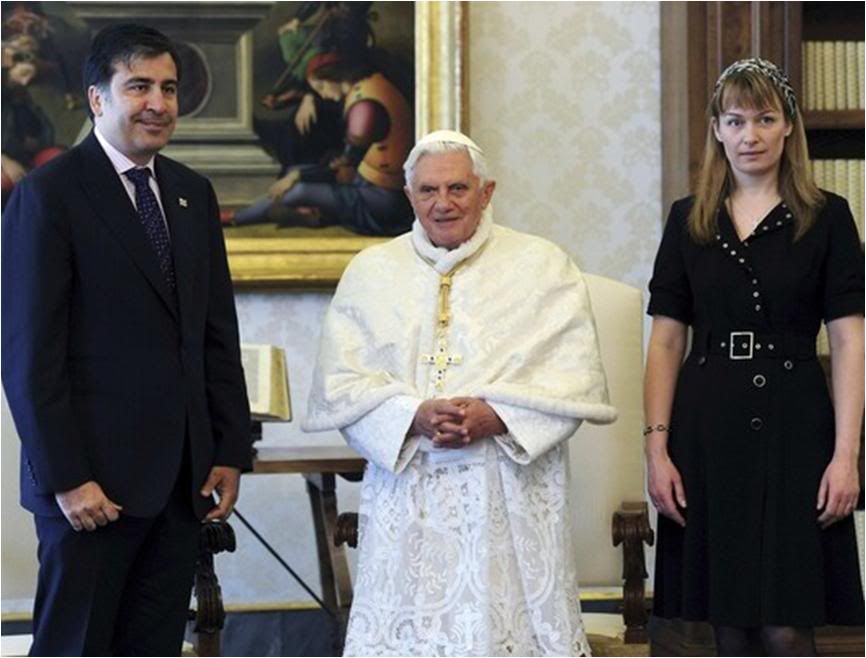
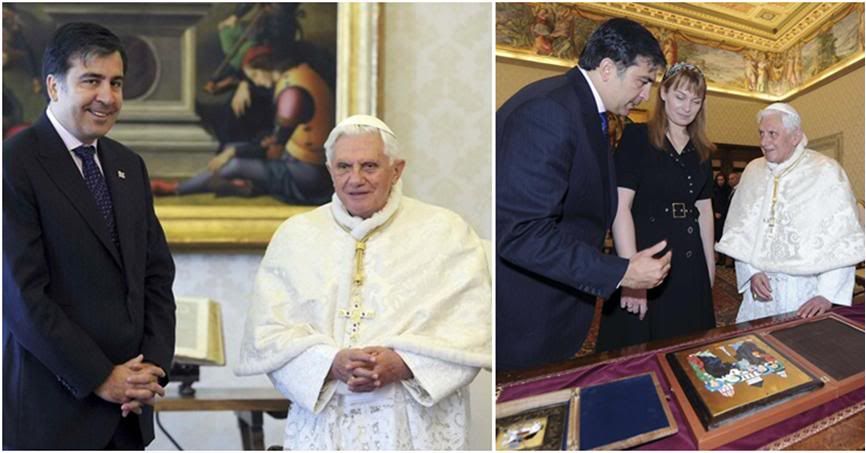 Pope welcomes new Swiss Guards
Pope welcomes new Swiss Guards
and meets their families

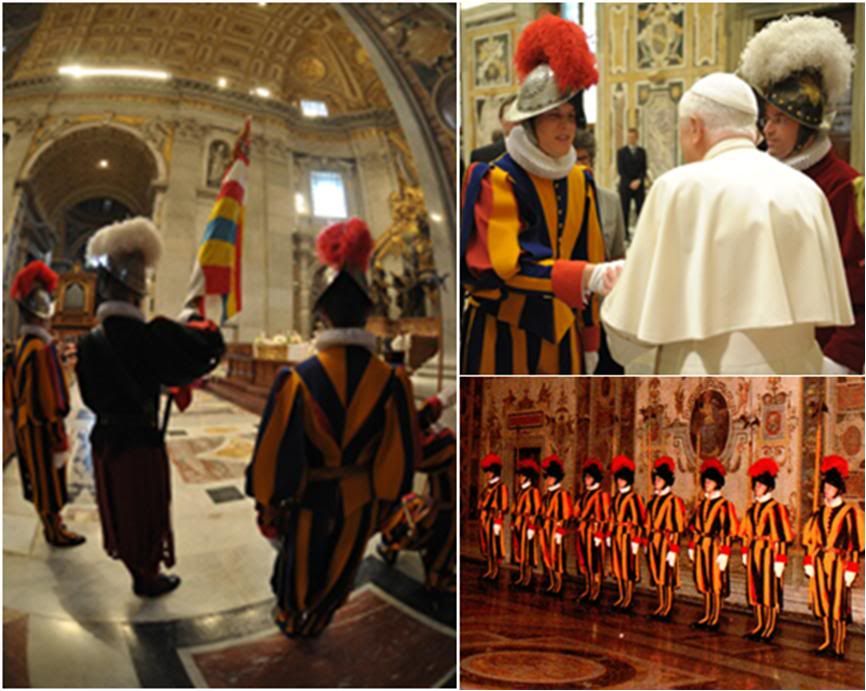
Vatican City, May 7, 2010 (CNA) - Meeting with new members of the Swiss Guard on Friday, the Holy Father invited them to meditate on the actions of St. Peter after the Resurrection to find the meaning of their work.
For all people, he said, working in Jesus’s name “transforms us and makes us a little more like the new man regenerated in Christ.”
After attending Mass at St. Peter’s with Cardinal Tarcisio Bertone on Thursday morning and taking their solemn oath to serve God and protect the Pope that evening, the 30 new Swiss Guards and their parents met with Pope Benedict XVI on Friday.
The audience was held within the frescoed walls and ceiling of the Clementine Hall, and the Pope spoke to the group in each of their three representative languages: German, French and Italian.
Starting in his own native language, the Holy Father recalled the history of the corps and the significance of the newly sworn-in guards as its “visible guardians.” He asked them to carry on the tradition of service to the Pontiff with “generous commitment” and hoped that in their work they “may mature as individuals and as Christians.”
Continuing in French, the Pope recalled the indirect, “but real,” association of the Pontifical Swiss Guard to St. Peter’s service to the Church. He asked them to meditate on the passage in the Acts of the Apostles when Peter manifests his “solicitude,” or concern, for the faithful in visiting them after the Resurrection.
In these verses, said the Pope, the guards will find the meaning of their noble undertaking.
He added that he himself "wishes to show that solicitude to all Churches and to each of the faithful, and to everyone who expects something from the Church."
“Your service will bring you to discover, in the face of each man and woman, a pilgrim seeking another face through which to receive a living sign of the Lord,” he observed.
"We know,” he said in closing in Italian, "that everything we do in Jesus' name, however humble it may be, transforms us and makes us a little more like the new man regenerated in Christ. Thus your service to the Petrine ministry will give you a livelier sense of Catholicism, together with a more profound perception of the dignity of all mankind."
Taking part in two days of ceremony and celebration for the 30 recruits and the corps’ new commanding officer, the Pope entrusted the Guards, their families and friends to the intercession of the Virgin Mary and the corps’ three patron saints, Sts. Sebastian, Martin and Nicholas of Flue.
[Modificato da TERESA BENEDETTA 08/05/2010 02:24] |
| |
 08/05/2010 04:53 08/05/2010 04:53 |
|
| | | OFFLINE | | Post: 20.134
Post: 2.774 | Registrato il: 28/08/2005
Registrato il: 20/01/2009 | Administratore | Utente Veteran | |
|


 Benedict in Portugal: A different crisis,
Benedict in Portugal: A different crisis,
secularism, and 'Marian cool'

May 07, 2010
As fate would have it, Pope Benedict XVI's five foreign trips in 2010 are almost laid out in ascending order of difficulty. Last month's weekend stop in Malta, arguably the most Catholic society on earth, amounted to the warm-up act, while next week's four-day swing in Portugal, which so far has been spared the sexual abuse scandals which have engulfed the Church elsewhere in Europe, should be a fairly smooth ride as well.
(One shouldn't be overly dogmatic about such predictions, however. It's worth remembering that it was in Fatima in 1982 that a Lefebvrite priest named Juan Krohn attacked Pope John Paul II with a bayonet.
Though the Vatican was fuzzy on the details at the time, John Paul's private secretary, now Cardinal Stanislaw Dziwisz of Krakow, said in 2008 that the Pope was actually wounded.
During his subsequent trial, Krohn asserted that John Paul was actually a closet Communist attempting to subvert the Vatican from within. A Spaniard by birth, Krohn was expelled by the Society of St. Pius X and eventually left the priesthood.
He recently re-emerged in an interview with Portuguese TV to complain that he never got a papal pardon like Mehmet Ali Agca, who shot John Paul II in St. Peter's Square in 1981. All that, I suppose, belongs in the "anything can happen" file.)
After Portugal, Benedict's itinerary gets complicated in a hurry. In June he travels to Cyprus, where he'll attempt the virtually impossible -- satisfying both the Turks and the Greeks, both of whom have a powerful political and emotional investment in the island.
[Tut-tut, Mr. Allen. As the Italians would say, che c'entra Turkey in the Cyprus trip? He's visiting the Greek part of Cyprus on a primarily religious trip in which he will be dealing with the Greek Cypriot President and the Cypriot Orthodox Church. And there has not been, to my knowledge, any peep out of the Turkish Cypriots regarding the Pope's visit. He's been to Turkey itself.
Of course, the Pope will at some point express the hope that the island may be reunited soon, and that Christians and Muslims may live together peacefully in the future, etc. But that's about all. Unless at the last minute, the Turkish authorities in the Turkish half of Nicosia decide they may want a photo-op with him, which can only be a plus.]
The Pope sees Turkey as crucial to his outreach to the Islamic world, and the Greeks as key players in Catholic/Orthodox relations.
The Pope will also present the working document for October's Synod on the Middle East, where job number one will be to trying to figure out some way of preventing Christianity from effectively disappearing in the land of Christ.
In September, Benedict travels to the United Kingdom, a thoroughly secular society with a long history of anti-Catholicism … not to mention, of course, that some voices in the UK have floated the idea of an arrest warrant for Benedict when he steps off the plane.
Finally, the Pope will visit Spain in November, where the Socialist government of Prime Minister Jose Luis Rodriguez Zapatero has become the bogeyman of the Vatican's imagination -- a global symbol of secularism on steroids, challenging the hurch on every conceivable front, from abortion to gay marriage to public funding for Church-run schools and charities.
[Has Mr. Allen forgotten that the Pope already visited Spain in 2006 and managed his meeting with Zapatero very well? And avoided any polemics about the pro-abortion, anti-conventional family Spanish government policies, despite the fact that he was in Spain for the World Encounter of Families? Nothing much has changed in those policies since 2006, whereas the Catholic lay opposition has shown it is able to mobilize hundreds of thousands of protesters in Madrid? And yet, MSM had given up the Catholic cause as completely lost in Spain the moment the Socialists came to power!
The scheme Allen proposes at the start of the article about 'increasing difficulty' in the trips is not just artificial but false. Every papal trip has its pros and cons. So far, Benedict XVI has overcome all the 'cons' with great, often resounding, success. From all angles, Turkey was considered by all the media at the time as a 'mission impossible' - and even many in the Vatican itself did not think the Pope should go so soon after Regensburg. And look how it turned out!]
Portugal, where Benedict will visit the capital city of Lisbon and the famed Marian shrine in Fatima, thus looms as a dress rehearsal for the more complicated trips later in the year. In the run-up, three aspects of the trip seem especially striking.
A country of 10.6 million that's officially 88 percent Catholic, Portugal may be one of the few corners of the Catholic world these days where the phrase "the crisis" does not immediately summon images of the sexual abuse scandals in the church. [What a Western-centric viewpoint! The whole world - not even the whole Catholic world - much as MSM would like to imagine so, is not obsessed about perverted priests! Allen also makes it seem as though Portugal were somehow isolated from the influence of western MSM!]
Bishop António dos Santos Marto of Leiria-Fátima recently told Portuguese journalists that he does not expect the sexual abuse mess to "overshadow" the Pope's visit, in part because so far there's been no eruption in Portugal along the lines of Ireland and Germany.
[But for all that the MSM tried, that issue did not overshadow the apostolic visit to Malta - even if it provided one of its highlights. The popular reception was so overwhelming it gave the lie to all the pre-visit build-up about public outrage over priest abuses [ten victims were very outraged], planned protests and three defaced billboards... Portugal's major problem, like everywhere else in Europe, is secularism and the economy.]
Instead, when you say "crisis" to most Portuguese these days, they assume you're talking about economic turmoil brought on recently when international investors targeted the country's debt. That move wiped out billions from the Portuguese stock market almost overnight, and raised fears that the country could go the way of Greece in terms of economic free-fall and social chaos. An emergency austerity plan from the government of Prime Minister José Sócrates has triggered labor strikes and other protests across the country.
Although it's terrible to put it like this, in some ways Portugal's trouble couldn't have come at a better time for Benedict XVI. It means that in addition to the familiar litany of questions about his handling of priestly abuse, people will also be eager to hear what the pope has to say about economic justice -- and on that score, the Pope arrives locked and loaded.
In effect, Portugal offers Benedict XVI a laboratory for concrete application of the principles he sketched in his July 2009 social encyclical Caritas in Veritate.
Since many politicians and analysts in Portugal believe that the current crisis stems in part from an irrational over-reaction by investors to the meltdown in Greece, the situation affords Benedict a natural opportunity to reprise his teaching from Caritas in Veritate about the dangers of what he called "scandalous speculation" and the need for a global authority with "real teeth" capable of regulating financial markets.
More broadly, the market turmoil in Europe provides a natural backdrop for Benedict to sketch, as he does in Caritas in Veritate, what he calls a vision of "Christian humanism" for economic reform. In essence, the Pope's pitch is that fixing structures or rules won't do the trick unless the moral architecture of the economy is also considered.
"The conviction that the economy must be autonomous, that it must be shielded from 'influences' of a moral character, has led man to abuse the economic process in a thoroughly destructive way," the Pope wrote in Caritas in Veritate.
Current events suggest there are few places on earth where Benedict is likely to find a more receptive audience for that message than in Portugal. One natural opportunity to deliver it will come in a meeting with social workers, including non-Catholic organizations, which Benedict XVI is holding at the request of the Portuguese bishops.
In his landmark book A Secular Age, Charles Taylor distinguishes three senses of the word "secularism": the separation of church and state; decline in religious faith and practice; and a change in the "plausibility structures" within a culture, in which non-religious explanations of life become the most convincing.
Western Europe is probably the only place on earth where secularism in all three senses is truly a grass-roots phenomenon. As part of the Catholic belt near the Mediterranean, Portugal is perhaps slightly less secularized than, say, Sweden or Great Britain, but nonetheless the Church's hold on society is certainly not what it once was.
Polls, for example, show that only about 19 percent of Portuguese Catholics attend Mass on a weekly basis.
Not only is Catholicism in Portugal buffeted by the prevailing secular winds, but in some ways its prestige still suffers from its profile under the long-running dictatorship of António de Oliveira Salazar, whose regime controlled the country from 1932 until the "Carnation Revolution" of 1974.
Despite some pockets of opposition, for the most part the Catholic church backed Salazar -- a former seminarian and ferocious anti-Communist, whose erstwhile roommate in college went on to become the Cardinal Patriarch of Lisbon.
Salazar routinely invoked papal social encyclicals to justify his economic policies. When the regime finally imploded, a good chunk of the Catholic Church's institutional credibility went with it.
More recently, Portugal has reflected the broader direction of most EU states. Under Socialist Prime Minister José Sócrates, Portugal legalized abortion during the first ten weeks of pregnancy following a national referendum in 2007, and the Parliament recently approved a new law authorizing gay marriage.
The measure is presently awaiting the signature of President Anibal Cavaco Silva, a Catholic and a member of the more conservative opposition party. Even if Cavaco Silva demurs, however, the Socialists say they have enough votes to override his veto.
Assuming the measure eventually becomes law, Portugal will join five other European nations to permit gay marriage: Spain, Belgium, the Netherlands, Norway and, most recently, Sweden. Iceland is also currently debating a gay marriage law.
At one level, the challenge awaiting Pope Benedict is to support last-ditch efforts to derail the gay marriage law. Though the Pontiff is unlikely to enter into the nitty-gritty of political debate, he will almost certainly recall Portugal to its Christian roots and stress the important of Europe's Christian values as a basis for public policy. The Portuguese will hear that, at least in part, as a reference to the present debate over marriage and the family.
Yet Benedict XVI is nothing if not a realist, meaning that he realizes the political winds are blowing against the Church across Western Europe. In the not too distant future, most EU members will likely permit abortion, gay marriage, and some form of euthanasia, despite the staunch pro-life advocacy of the Vatican and Catholic bishops in each nation. Traditional legal and financial privileges of the Church are likely to be further eroded in many European societies as well.
Up against those realities, Benedict XVI is trying to prepare European Catholics for a future as a "creative minority," meaning a subculture that cannot rely upon state sponsorship (and which, in fact, will likely face considerable social push-back).
Sociologically speaking, Benedict's emphasis on reviving traditional markers of Catholic faith and practice -- such as Mass in Latin, or communion on the tongue -- represents a sort of "politics of identity," intended to protect the Church from assimilation to the dominant secular milieu.
One can expect a version of this "politics of identity," addressed to Portugal but really directed at all of Europe, to loom especially large during the first stage of the trip in Lisbon.
Jesuit Fr. Federico Lombardi, the Vatican spokesperson, reminded journalists during a May 4 briefing that John Paul II used a 1991 trip to Fatima to announce a Synod of Bishops for Europe. Lombardi suggested that Benedict XVI will likewise probably have a fair bit to say about Europe during his stay in Fatima.
Benedict XVI does not have the same dramatic personal connection with Fatima as his predecessor John Paul II. The 1981 assassination attempt against John Paul by Mehmet Ali Agca fell on May 13, the Feast of Our Lady of Fatima, and John Paul credited the Virgin of Fatima with saving his life.
(According to some reconstructions of the shooting, Ali Agca's bullet followed a strange elliptical path rather than a straight line, thereby avoiding the Pope's vital organs.)
One year later, John Paul travelled to the shrine in Portugal to place the bullet doctors had removed from his body in the golden crown on the original statue of Our Lady of Fatima.
While in the Chapel of the Apparitions in Fatima on Wednesday, Benedict XVI is expected to recite a prayer recalling John Paul II and his dedication of the bullet from the assassination attempt.
Fatima, of course, is primarily famous for a series of apparitions of Mary to three shepherd children in 1917, and the revelations those children reported receiving. Two of the three children, Jacinta and Francisco Marto, died in the global flu epidemic which began in 1918, while the third, Lúcia Santos, became a Discalced Carmelite nun and died in 2005. [2006!]
Given John Paul's mystical attachment to Fatima, it's no surprise that he took the revelations seriously indeed. In 2000, he ordered publication of the famous "Third Secret" of Fatima, which for decades had been the object of rumor and speculation. (The first secret was a vision of Hell, while the second involved World War I and the consecration of Russia to the Sacred Heart.)
As published by the Vatican in 2000, the third secret features a vision of a bishop dressed in white who ascends a mountain and is fired upon by soldiers will bullets and arrows. The popular interpretation sees in the "bishop in white" a reference to John Paul II and the 1981 assassination attempt.
(For the record, some Fatima devotees believe the text released in 2000 is not the real Third Secret, which they contend involves a doomsday prediction of an apocalypse, perhaps related to "apostasy" in the Catholic church after the Second Vatican Council.)
Ever the rational academic, Benedict XVI has never really embraced the florid visions or private devotions that swirl around Marian sacntuaries such as Fatima, La Salette, or Medjugorje. His interest in Fatima has always been less mystical than theological -- seeing it primarily as a reminder of Mary's role in salvation history as the one who introduces Christ to the world.
In the May 4 Vatican briefing, Lombardi suggested that the best window onto Benedict's attitude towards Fatima comes in his comments back in 2000, when he put the publication of the "Third Secret" into theological context.
On that occasion, then-Cardinal Joseph Ratzinger played down the significance of the secret, saying that "no great mystery is revealed" and that "the veil of the future isn't lifted."
Ratzinger went on to make a careful distinction between public revelation, meaning principally the Bible, and private revelation such as the visions of Fatima. The former, he said, demands faith, while the latter is simply a "help to faith" and the basic criterion for its truth is whether it orients one to Christ.
While acknowledging that Fatima has been approved by the Church, he suggested that some of the more famous claims associated with the three seers may have been "interior signs" rather than something belonging to "our normal sensible world." Not every detail of the visions has meaning, he warned, and altogether they represent a "symbolic language" requiring interpretation by the church.
In general, he said, the role of Mary of Fatima is that same as that of Mary in the New Testament, especially the Gospel of John -- she achieves a kind of "synergy" with her son, thereby opening up Christ's mercy for the world, especially its poorest and most forgotten. (Ratzinger noted that the peasant youth of Fatima were not exactly big wheels in "the religious and cultural debates of the day.")
Ratzinger stressed three key words from the text of the Third Secret: "Penance, penance, penance."
"The vision invites us to do penance," he said, "to convert, to orient ourselves to God and his beloved son, in order to receive from his death on the cross the gift of new life."
Ratzinger also stressed Mary's important as a symbol of the dignity of women.
The Virgin of Fatima, he said, "reminds the Church and the world of the meaning and importance of the Mother of the Lord in salvation history, and therefore the meaning and value of women, of every woman, in human affairs."
All in all, Pope Benedict XVI's approach to Fatima is a classic illustration of what I've elsewhere called his "Marian cool." He has an obvious personal devotion to Mary, and a keen sense of her theological importance, but he doesn't go in for the more exotic strains of end-time speculation or elaborate spiritual practices. He's too much a master of mainstream Catholic tradition to follow its tributaries very far.
Benedict's, in other words, is a cerebral, restrained, "cool" form of Marian devotion. Watching him trot it out in one of the "hottest" Marian sanctuaries anywhere in the world should make for an interesting experience.
[I think perhaps the so-called 'Marian cool' that Allen attributes to Benedict XVI may be over-stated - and overlooks a few important facts: As a Bavarian, he grew up in the shadow of the Madonna of Altoetting, and was raised from childhood in devotion to her - nothing simply 'cerebral or restrained' in that! Perhaps not coincidentally, his cathedral in Munich was the Frauenkirche - Our Lady's Church - and that major events were celebrated in the Marienplatz.
And his travels so far, foreign and Italian, have been pilgrimages as well to a number of Marian shrines - Czestochowa in Poland, Altoetting in Bavaria, Ephesus in Turkey, Mariazell in Austria, Aparecida in Brazil, Lourdes of course, the Holy Land, now Fatima; and in Italy, Loreto, Leuca, Genoa, Savona, Cagliari and Pompeii - to all of them, he offered the papal homage of a Golden Rose except those that had already been previously honored (like Czestochowa and Lourdes). In Malta, their Marian icon par excellence, the Madonna of Ta'pinu, was brought in specially for his Mass, at which he offered her a Golden Rose. He did the same last year after the earthquake in Abruzzo, for the Madonna di Roio which was brought to him in L'Aquila.
And perhaps previous Popes did it as well, but everytime Benedict XVI ends an address to a group of bishops visiting ad limina, he prays for the intercession of the Blessed Mother under the title she is most venerated in their country, which always sends me Googling furiously....]
Very apropos report from Portugal:
Benedict XVI to offer
Golden Rose in Fatima -
the first Pope to do so in person
Translated from

May 7, 2010
Benedict XVI will offer a Golden Rose to the Shrine of Fatima on May 12 to become the first Pope to do so personally on Portuguese soil.
The homage will take place in his first event in Fatima, at the Chapel of the Apparitions, where he will lead a prayer service upon arrival from Lisbon.
The Holy Father will offer it to the Our Lady of Fatima as a 'homage of gratitude' for the 'wonders that the Almighty has done through you in the hearts of so many pilgrims".
"I am sure that the shepherd children of Fatima, Blessed Francisco and Jazinta, and the Servant of God Lucia de Jesus are with us in this hour of praise and jubilation", says the prayer in the official Missal of the pontifical liturgies in Portugal from the office of Pontifical Liturgical Celebrations.
The Golden Rose is a special honor given by the Popes - in the past, as a recognition for personal merits - and to this day, as a sign of particular devotion to churches, shrines, and even cities.
The first Golden Rose for the Shrine of Our Lady of Fatima was sent by Paul VI on May 15, 1965, through Cardinal Fernando Cento.
John Paul II sent a Golden Rose to the Shrine of Our Lady of Sameiro in Braga, on the occasion of the centennial celebration of the image's coronation on December 8, 2003, through Cardinal Eugenio Salas.
The tradition of the Golden Rose was already practised in the time of Leo IX (1049-1054), at which time, it was thought to have dated from the seventh century.
[And I had always presumed that John Paul II had given a Golden Rose to the Shrine at Fatima.]
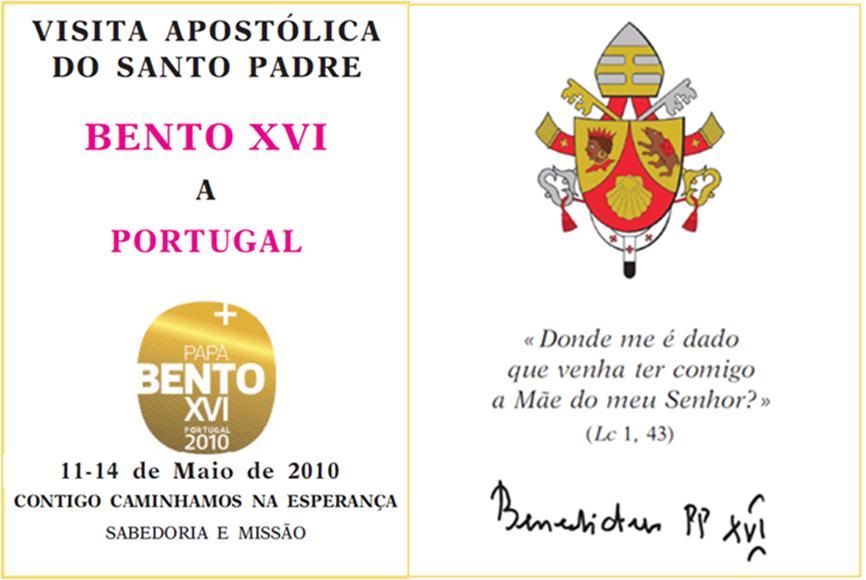 The Missal cover and frontispiece for the Portugal visit: On the left - the visit motto,' With you we walk in hope - Wisdom and Mission'. Right, the Holy Father's epigram for the visit: "And how does this happen that the mother of my Lord shold come to me?" Lk 1,3).
The Missal cover and frontispiece for the Portugal visit: On the left - the visit motto,' With you we walk in hope - Wisdom and Mission'. Right, the Holy Father's epigram for the visit: "And how does this happen that the mother of my Lord shold come to me?" Lk 1,3).
[Modificato da TERESA BENEDETTA 08/05/2010 06:27] |
| |
 08/05/2010 17:01 08/05/2010 17:01 |
|
| | | OFFLINE | | Post: 20.135
Post: 2.775 | Registrato il: 28/08/2005
Registrato il: 20/01/2009 | Administratore | Utente Veteran | |
|
 May 8, Saturday, Fifth Week of Easter
May 8, Saturday, Fifth Week of Easter
 Center photos: the saint's reliquary in Bellvaux, and a view of the monastery grounds today.
ST. PIERRE DE TARANTAISE (France, 1102-1174), Cistercian, Abbot and Bishop
Center photos: the saint's reliquary in Bellvaux, and a view of the monastery grounds today.
ST. PIERRE DE TARANTAISE (France, 1102-1174), Cistercian, Abbot and Bishop
As a shepherd boy in the Isere region of France, Pierre could recite all the Psalms by heart, then joined the Cistercian order where he rose quickly to become prior and then abbot of Tamie, the monastery he founded in the Savoy (southeast France). Against his will, he was eventually named Bishop of Tarantaise, earning a reputation for his political skills. Nonetheless, he continued to draw strength from the monastic life, often visiting the Grande Chartreuse monastery for spiritual breaks. When Frederick Barbarossa named an anti-Pope against the legitimate Pope, Alexander III, Pierre became involved in seeking to defend the latter's legitimacy. Later, he would be asked to facilitate negotiations between Louis VII of France and Henry II of England. However, he fell ill during the course of the mission and eventually died in the abbey of Bellvaux. His renown was such that less than 20 years after his death, he was canonized. His remains were eventually distributed among the Cistercian monasteries in France. His major shrine is in Bellvaux.
Readings from today's Mass:
www.usccb.org/nab/readings/050810.shtml
OR today.
 Papal stories in this issue: The Pope's audience with the President of Georgia and his address to the new members of the Swiss Guard; a preparatory essay on his visit to Portugal; a lecture by the German ambassador to the Holy See on the relevance of Caritas in veritate to resolving the basic issues in the current financial and environmental world crises; and the concert for the Holy Father on May 20 offered by the Patriarch of Moscow to close the 'Days of Russian culture and spirituality' in Rome. Page 1 international news : European leaders working overtime to save Greece from debt collapse; the stalemate in the UK as both the Conservatives and the Labour fight to beat the other at putting together a coalition government after the Tory failure to win an absolute majority in this week's parliamentary elections.
THE POPE'S DAY
Papal stories in this issue: The Pope's audience with the President of Georgia and his address to the new members of the Swiss Guard; a preparatory essay on his visit to Portugal; a lecture by the German ambassador to the Holy See on the relevance of Caritas in veritate to resolving the basic issues in the current financial and environmental world crises; and the concert for the Holy Father on May 20 offered by the Patriarch of Moscow to close the 'Days of Russian culture and spirituality' in Rome. Page 1 international news : European leaders working overtime to save Greece from debt collapse; the stalemate in the UK as both the Conservatives and the Labour fight to beat the other at putting together a coalition government after the Tory failure to win an absolute majority in this week's parliamentary elections.
THE POPE'S DAY
The Holy Father met today with
- Bishops of Belgium (Group 3) on ad limina visit, meeting with each of them individually before addressing
all the groups together. Address in French.
- Cardinal Giovanni Battista Re, Prefect of the Congregation for Bishops (weekly meeting).
The Vatican also announced today that Benedict XVI has accepted the resignation of Mons. Walter Mixa, as
Bishop of Augsburg and as Military Bishop for Germany, amid new stories that Mixa was not only guilty of
physically striking students in the past but may also have been guilty of sexual misconduct.
The Pope also accepted the resignation of the Primate of Poland, Mons. Henryk Józef Muszyński, as Bishop of
Gniezno, having reached canonical retirement age. The pope named the present Apostolic Nuncio in Poland, Mons.
Józef Kowalczyk, to replace him in both positions.
|
| |
 08/05/2010 22:13 08/05/2010 22:13 |
|
| | | OFFLINE | | Post: 20.136
Post: 2.776 | Registrato il: 28/08/2005
Registrato il: 20/01/2009 | Administratore | Utente Veteran | |
|


 FATIMA IN THE NEW MILLENNIUM
Translated from
FATIMA IN THE NEW MILLENNIUM
Translated from
the Italian service of

May 8, 2010
On Tuesday, May 11, Benedict XVI will leave for Portugal on his 15th apostolic trip abroad with the motto "With you, we walk in hope - Wisdom and mission".
The visit which will last four days takes place on the tenth anniversary of the beatification of the shepherds Jacinta and Francisco.
Let us listen to the editorial of our director, Fr. Federico Lombardi, for Octava Dies, the weekly newsmagazine of CTV:
John Paul II wanted the 'third secret' of Fatima to be revealed on the occasion of the beatification of the two shepherd children Jacinta and Francisco during the Jubilee Year 2000, on the passage from one millennium to the next.
A century was ending that had been characterized by great afflictions, about which the visions at Fatima had given a spiritual reading that was luminous and tragic at the same time: a time of wars and martyrdom, in which the Church adn the Pope himself would participate to the utmost in the sufferings and in the thirst for salvation of all mankind.
To simple unlettered children, in an insignificant place - so characteristic of the great Marian events - a message was entrusted which, in its simplicity, unleashed a spiritual force capable of surpassing limits and conveying itself through the most serious convulsions in the history of mankind.
Now that the 'secret' has been revealed after the fact, what does the message of Fatima still have to say to us? In concluding his theological commentary upon the publication of the 'third secret', then Cardinal Joseph Ratzinger* said: "The action of God, the Lord of history, and the co-responsibility of man in the drama of his creative freedom, are the two pillars upon which human history is built. Our Lady, who appeared at Fatima, recalls these forgotten values. She reminds us that man's future is in God, and that we are active and responsible partners in creating that future."
We need clear and innocent eyes to read the road signs in the new millennium and to understand its truest risks and hopes. The message of Fatima keeps all of its gravity in the face of history.
* I must point out that Fr. Lombardi quoted the ending from Cardinal Tarcisio Bertone's Introduction to the 'Third Secret', not from Cardinal Ratzinger's Theological Commentary.
Whenever any Vatican document cites a previous Vatican document, I always look up the official English translation of the document if it exists, in order to use the official text. But when I turned to Cardinal Ratzinger's commentary just now, I could not find anything that corresponded to the words cited by Fr. Lombardi. Since the only other original text at the publication of the 'third secret' was Cardinal Bertone's Introduction (in his capacity then as Secretary of the CDF), I looked it up, and sure enough, Fr. Lombardi's citation came from his text, not from Cardinal Ratzinger.
Ten years after Vatican disclosure,
some say 'third secret' is still secret
by JOHN THAVIS

VATICAN CITY, May 7 (CNS) -- Ten years after the Vatican divulged one of the Church's best-kept secrets -- the third part of the message of Fatima -- a small band of skeptics and critics are still questioning the official explanation.
More than 100 of them gathered at a hotel not far from the Vatican in early May for a weeklong conference on such topics as "Fatima and the Global Economic Crisis," "The Present Need for the Consecration of Russia" and "Is There a Missing Text of the Third Secret?"
For those in attendance, the answer to that last question is a no-brainer.
"The evidence points to only one conclusion: that something has to be missing," said Christopher A. Ferrara, a U.S. attorney and Catholic commentator who spoke at the conference.
Ferrara pointed to what he described as a series of incongruities and inconsistencies in the Vatican's version. Among people truly familiar with the events at Fatima, he said, only a minority "cling steadfastly to the notion that an ambiguous vision of a bishop dressed in white outside a half-ruined city is all there is to the third secret."
That's the heart of the question for people in the "Fatima Challenge" movement. They argue that the third secret of Fatima was a prophecy so traumatic and dire that several popes decided not to make it known to the faithful, and yet the text published in 2000 contained little more than an allegory about the Church's past struggles with 20th-century ideologies.
They say there's good reason to believe the third secret wasn't just about the Church battling outside forces, but about Satan working in the church -- at the highest levels. Some have deduced that the secret foresaw the changes of the Second Vatican Council, especially in liturgy and ecumenical dialogue, as part of the "great apostasy" which church leaders refuse to acknowledge.
[So, granted that any undisclosed part of the message says all that - not directly, of course, as such messages never do - but in metaphor and allegory, why are we fretting about it? We know it has happened - Satan in the guise of prelates of the Church - and is still happening and is bound to happen in the course of human affairs! Why do we need the 'supernatural' to tell us what reason and objective observation already make very clear to us?
Perhaps it was no coincidence that Paul VI used that very metaphor - about the fumes of Satan having seeped within the Church - to express his grand disillusion at the course that the immediate post-Conciliar years quickly took!...
It is absurd to be so literal about the Virgin Mary's messages from 1917 and think of them not just as 'secrets' to be selectively divulged but also as concrete 'prophecies' - even if in code - as though Our Lady of Fatima were nothing more than a 1917 Nostradamus! (Come to think of it, 'Nostradamus' is literally 'Our Lady'!)...
To obsess about the secrecy and prophecy aspects of the message is to miss the message itself, which as Cardinal Ratzinger pointed out in 2000, was unmistakably, and repeatedly, a call to 'Penitence, penitence, penitence' through incesssant prayer and acts of atonement. That, along with solid catechism of the faithful on the essentials of the faith are the ways in which the Church fights - and has always foguht - heresy and treason that may seriously undermine it from within.]
Most recently, several of these "diehard Fatimists" -- as a Vatican official once described them -- have suggested that the priestly sex abuse crisis in the Church is a clear sign of the crisis of faith and pastoral negligence prophesied, they say, by Mary at Fatima. [Not a sign, but the consequence of the crisis of faith!]
The conference took place a few days before Pope Benedict XVI's visit to Fatima, and organizers went out of their way to invite the Pope and Vatican officials. None showed up. The Pope's Vatican aides consider the "Fatimists" a fringe element that is best ignored.
Cardinal Tarcisio Bertone, the Vatican secretary of state, has said one of the reasons the third secret was made public in 2000 was that people were spreading "absurd theses" about catastrophic events or heresy at the top levels of the Church. {I can understand this in the light of Cardinal Ratzinger's famous ductum that the CDF exists, among other things, to preserve the faith for the simple faithful - who do not deserve to be confused by extraneous non-essentials.]
Cardinal Bertone, who was personally involved in the publication of the third secret, said he was puzzled that some still think the Vatican is hiding something.
In 2006, an Italian journalist wrote a book titled "The Fourth Secret of Fatima" that laid out a Vatican conspiracy theory, prompting a new round of publicity. [The journalist is Antonio Socci, whose single-minded obsession about the 'secret' I find hard to reconcile with his lucidity and rationality on any other subject he writes about.[
In 2007, Cardinal Bertone wrote his own book, "The Last Visionary of Fatima," which reiterated the official version of the Fatima messages and secrets and was based, he said, on long conversations with Carmelite Sister Lucia dos Santos, the last of the visionaries to die. In TV appearances, the cardinal strongly denied theories of a Vatican cover-up.
Pope Benedict was also personally involved in publishing the third secret. As Cardinal Joseph Ratzinger, the Vatican's top doctrinal official, he presented the text of the secret to the press and wrote a lengthy commentary about it.
That news conference on June 26, 2000, is still memorable for Vatican journalists. The stage was set for disclosure of a text that for decades was thought to be too disturbing to reveal. But instead, Cardinal Ratzinger began by deflating expectations and announcing that there was nothing apocalyptic.
"No great mystery is revealed; nor is the future unveiled," he said. He went on to give a theological framework to the apparitions and messages of Fatima, insisting that in the church's tradition, "prophecy" is not like a "film preview," but more like offering signs that can be useful for Christians.
Cardinal Ratzinger said that was how to understand the third secret's vision of a "bishop in white" who struggles up a hill amid corpses of slain martyrs, and then falls dead after being shot by soldiers.
Whether this bishop symbolized Pope John Paul II, who was shot and wounded on May 13, 1981, or a "convergence" of several 20th-century pontiffs who helped the Church ward off the dangers, it doesn't mean someone must be killed, the cardinal said.
That explanation still sticks in the craw of "Fatimists," who say it deliberately removes the vision's apocalyptic scenario and lulls the faithful into a false sense of security. The Vatican's version, they say, suggests these problems are behind the Church, when in their view the worst is yet to come.
Father Nicholas Gruner, a Canadian priest who founded "The Fatima Crusader" magazine, has long maintained that Russia has yet to be consecrated to Mary in accordance with the instructions of Our Lady of Fatima.
"We haven't had the conversion of Russia by any stretch of the imagination -- not militarily, not morally. It's the largest abortion capital of the world.... There's just no sign of conversion in any sense," Father Gruner said in Rome May 6.
That's another issue the Vatican is tired of dealing with. Church officials say Pope John Paul II in 1984 led the world's bishops in the consecration of Russia and the world. The late Sister Lucia, one of the three Portuguese children who saw Mary in 1917 and the one who received the instructions for the consecration, had said that it was properly performed.
The Fatima messages are not dogma, and the Church does not impose belief or any single interpretation. That seems to ensure that the "Fatimists" will continue to broadcast their theories to whoever will listen.
"The Bishop dressed in white:
The Popes and Fatima"

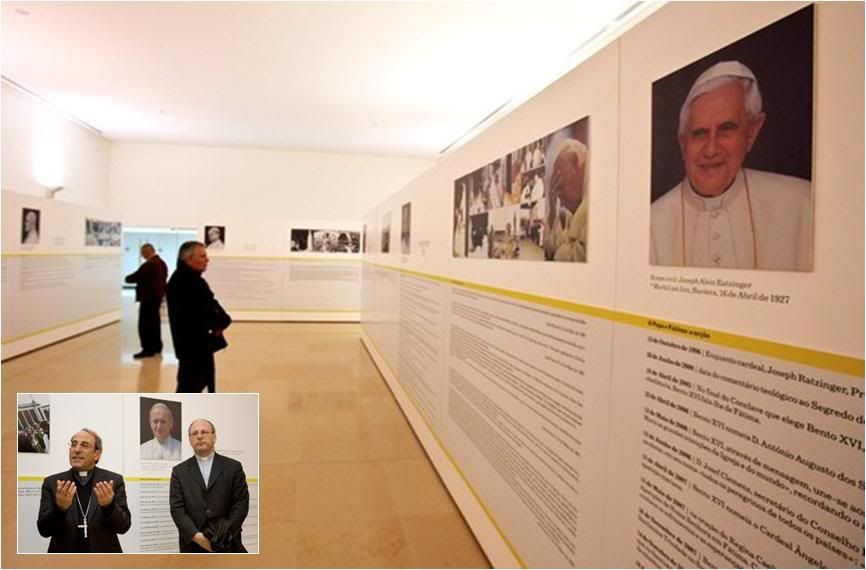
A documentary exhibit recalling papal visits to Fatima has opened in the atrium leading to the Chapel of Apparitions at the Basilica of Santissima Trinita in Fatima. The exhibition was opened by Mons. Antonio Marto, Bishop of Leiria-Fatima.
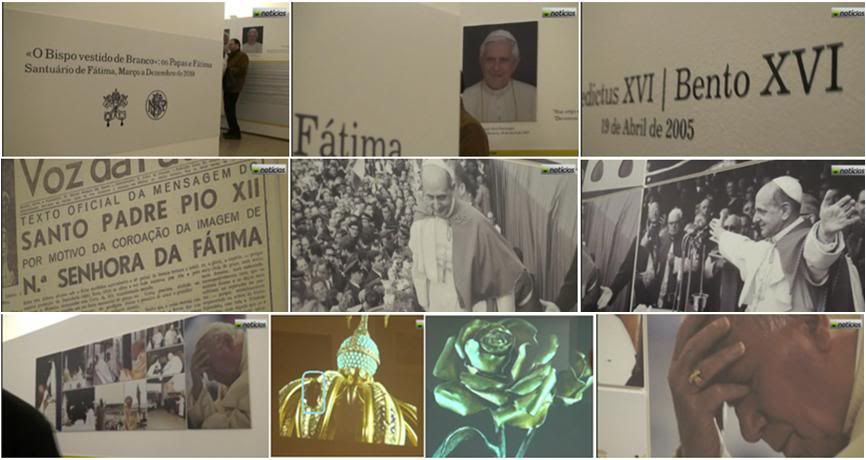
Paul VI was the first Pope to visit Fatima, having been also the first Pope to ever travel outside Italy in the modern era. John Paul II cameto Fatima three times - in 1982, 1987 and 2000. The center photos in the lower panel show the crown of the statue of Our Lady inset with the bullet that missed killing John Paul II on May 13, 198i, and the Golden Rose offered to the Shrine by Paul VI.
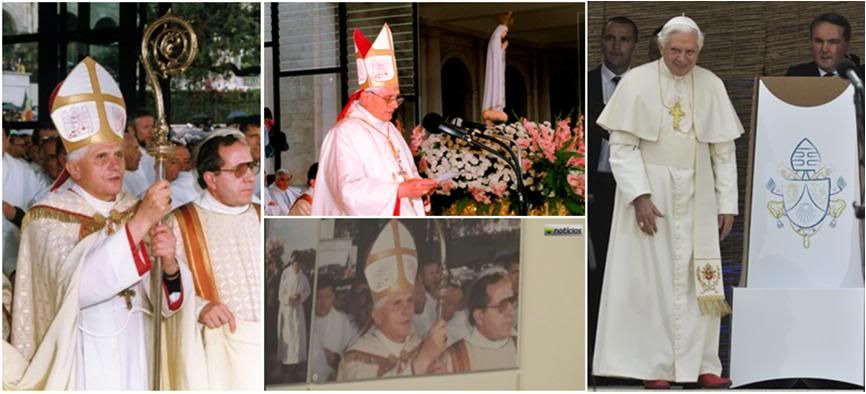
Cardinal Ratzinger came to Fatima in October 1990 to preside at the International Pilgrimage aniversary celebrations. The exhibit includes a photograph of him taken in Malta last month.
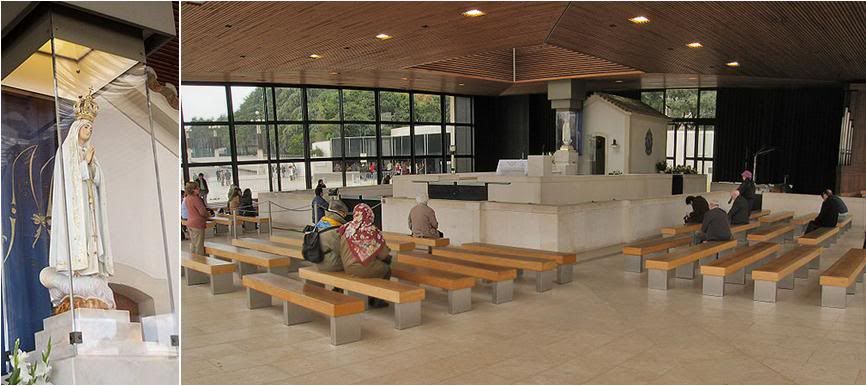
The image of Our Lady of Fatima that is venerated at the Shrine, in the Chapel of the Apparitions. Like most famous Marian images, the Fatima Madonna is a modest-sized image.
[Modificato da TERESA BENEDETTA 09/05/2010 01:17] |
| |
 09/05/2010 10:20 09/05/2010 10:20 |
|
| | | OFFLINE | | Post: 20.137
Post: 2.777 | Registrato il: 28/08/2005
Registrato il: 20/01/2009 | Administratore | Utente Veteran | |
|

 Since all the Catholic media agencies do not work on weekends, I am forced to use the AP report for this story...
Pope and Belgian bishops
Since all the Catholic media agencies do not work on weekends, I am forced to use the AP report for this story...
Pope and Belgian bishops
meet over sex abuse

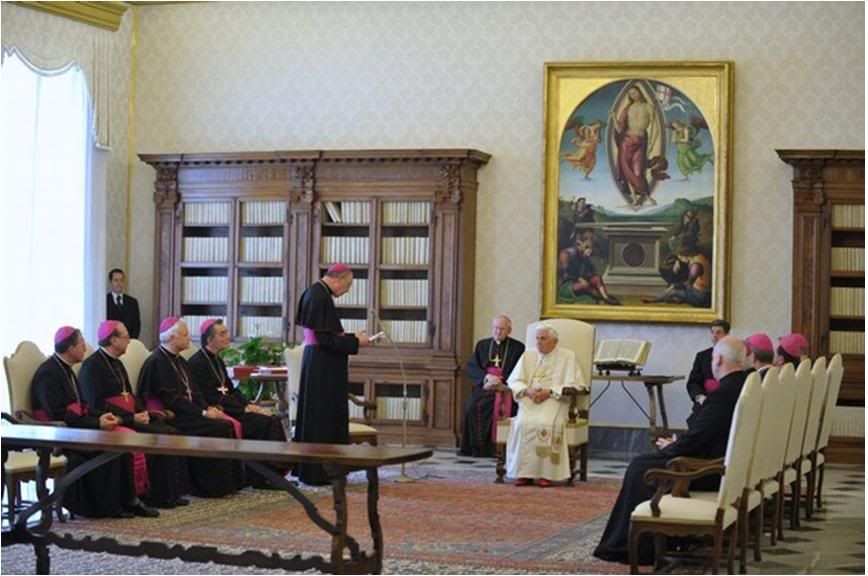
VATICAN CITY, May 8 (AP) - Pope Benedict XVI met at the Vatican with Belgium's bishops on Saturday, telling them their church was "tried by sin in these times," over the minor's abuse scandals.
Belgium's Catholic church has been rocked by recent allegations of abuse by paedophile priests and clumsy, slow handling of the cases by the bishops.
Belgians are stunned by recent revelations that Roger Vangheluwe, the bishop of the Belgian city of Bruges, 73, abused a boy for years.
There were also contentions by a retired Belgian priest, named Rik Deville, that he told Belgium's then highest-ranking prelate, now Cardinal Godfried Danneels over a decade ago, about the abuse but that no action was taken.
Vangheluwe stepped down last month, expressing sorrow in a statement for having abused the child for years.
"He (the Pope) obviously referred to the drama we lived in Belgium, in the archdiocese of Bruges, and he spoke about it briefly, knowing that all the rest was already understood and already said," Brussels Archbishop Andre-Mutien Leonard said.
Leonard himself has been accused in the Belgian media of covering up a case of church abuse in the 1990s, but has denied the allegation.
The Belgium clergy abuse scandal has overshadowed the collapse of the Belgian government, with nearly every day bringing new witness accounts and reports of attempts to hush up abuse.
The Belgian churchmen began a series of meetings at the Vatican on Monday that culminated in talks with Pope Benedict XVI on Saturday.
"I urge you now not to see the problem in the Belgian Church as a unique one, even if it is a very important one," the Archbishop of Brussels added.
The Pope also accepted the resignation of a German bishop accused of abusing minors, on Saturday*....
[More than half the story is a rehash of the AP-MSM line against the Church and the Pope in the sex-abuse story, so I cut it off and have added it below, for the record.]
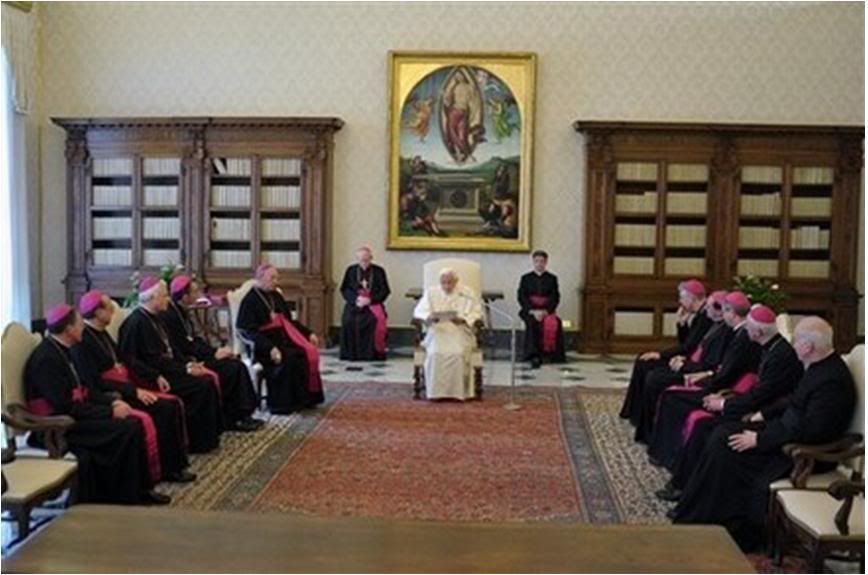 Here is a full translation of the Holy Father's address to tbe bishops, which was delivered in French:
Here is a full translation of the Holy Father's address to tbe bishops, which was delivered in French:
Dear Brothers in the Episcopate,
I am happy to welcome you on the occasion of your visit 'ad limina Apostolorum' which brings you on pilgrimage to the tombs of the Apostles Peter and Paul.
This visit is a sign of the ecclesial communion that unites the Catholic community of Belgium to the Holy See. It is also a happy occasion to reinforce this communion in reciprocal listening, in praying together, and in the charity of Christ, especially in these times when your Church has been sorely tried by sin.
I sincerely thank Mons. André-Joseph Léonard for the words he addressed to me in your name and that of of your diocesan communities. I would also like to address a special thought to Cardinal Godfried Danneels who led the Archdiocese of Malines-Brussels and your bishops' conference for more than 30 years.
Reading your reports on the state of your respective dioceses, I have been able to take the measure of the transformations that have taken place in Belgian society. They have to do with tendencies that are common to many European countries but which have specific characteristics in your country. Some of them, already highlighted in the last ad limina visit [five years ago], have become more accentuated.
I refer to the decrease in the number of baptized Catholics who openly profess their faith and their membership in the Church; the progressive elevation in the median age of your clergy and religious; the insufficiency of ordained or consecrated persons engaged in active pastoral work or in the social and educational domains; and the decreasing number of candidates to the priesthood and consecrated life.
Christian formation, expecially that of the younger generations, as well as questions relating to respect for life and the institutions of marriage and the family, constitute other sensitive points.
One could also mention the complex and often worrisome situations related to the economic crisis, to unemployment, to the social integration of immigrants, and to peaceful coexistence among the different linguistic and cultural communities of your nation.
I have been able to see how much you are aware of these situations and the importance of insisting on a more solid and profound religious formation. I have seen your Pastoral letter, the beautiful Profession of Faith, issued as part of your initiative "Growing the faith".
Through this letter, you wish to inspire all the faithful to rediscover the beauty of the Christian faith. Thanks to prayer and to common reflection on revealed truths as expressed in the Credo, one rediscovers that faith does not only consist of accepting a set of truths and values, but first of all, of trusting in Someone, God - to listen to him, to love him, and to talk to him, and finally, to commit oneself to his service (cf P. 5).
A signfificant event, for today and for tomorrow, was the canonization of Fr. Damien De Veuster. This new saint speaks to the conscience of Belgians. Has he not been designated as your nation's most illustrious son of all time?
His greatness, lived in the total gift of himself to his leprous brothers, to the point of getting the disease himself and dying of it, resides in his interior richness, his constant prayer, his union with Christ whom he saw in his brothers, to whom, like Christ, he gave all of himself without reserve. In this Year for Priests, it is good to offer his priestly and missionary example, especially to priests and religious.
The decline in the number of priests should not be seen as an inevitable process. The Second Vatican Council affirmed forcefully that the Church cannot do away with the ministry of priests. It is therefore necessary and urgent to give this ministry its rightful place and to recognize its irreplaceable sacramental character.
Consequently, this means the necessity for an ample and serious pastoral ministry for vocations, based on the exemplary holiness of priests, on attention to the seeds of vocation present in many young people, and on assiduous and trusting prayer as Jesus urged (cf Mt 9,37).
I address a heartfelt and thankful greeting to all the priests and consecrated persons, often overburdened with work, and who need the support and friendship of their bishop and colleagues, without forgetting the elderly priests who have dedicated all their life in the service of God and their brothers. Nor do I forget the missionaries.
[I wish] for all - priests, religious and lay faithful of Belgium - may receive my encouragement and the expression of my gratitude, and that they may never forget that only Christ can calm all storms (cf Mt 8,25-26) and give back strength and courage (cf Mt 11,28-30, Mt 14,30-32) to lead a holy life, in full fidelity to their own ministry, to their consecration to God, and to Christian witness.
The Constitution Sacrosanctum concilium underscores that is in liturgy that the mystery of the Church is manifested, in all its greatness and in its simplicity (cf No. 2). It is therefore important that priests take great care of liturgical celebrations, particularly the Eucharist, so that these rites may allow profound communion with the living God - Father, Son and Holy Spirit.
It is necessary that these celebrations take place with respect for the Church's liturgical tradition and with the active participation of the faithful, according to the role that corresponds to each one, respectively, in unifying with the Paschal mystery of Christ.
In your reports, you are attentive to the formation of laymen with a view to their increasingly effective use in animating temporal entities. This is a praiseworthy program which is born from the vocation of every baptized person configured to Christ as priest, prophet and king.
It is good to discern all the possibilities that emanate from the common calling of laymen to holiness and to apostolic commitment, respecting the essential distinction between the ministerial priesthood and the common priesthood of laymen.
All members of the Catholic community, but particularly the lay faithful, are called to openly bear witness to their faith and to be a ferment in society, while respecting the healthy secularness of public institutions as well as other religious confessions.
Such witness cannot be limited only to personal encounters, but must also assume the characteristics of public proposition, respectful but legitimate, of the values inspired by the evangelical message of Christ.
The brevity of our meeting ddoes not allow me to develop other topics which are dear to me and which you have mentioned in your reports. I will therefore end by conveying my affectionate greeting to your communities, to the priests and religious, and to all the Catholics of Belgium, assuring them of my prayers for them to the Lord.
May the Virgin Mary, venerated in many shrines in Belgium, assist you in your ministry and protect you all with her maternal tenderness. To you and to all the Catholics of the Kingdom, I impart the Apostolic Blessing with all my heart.
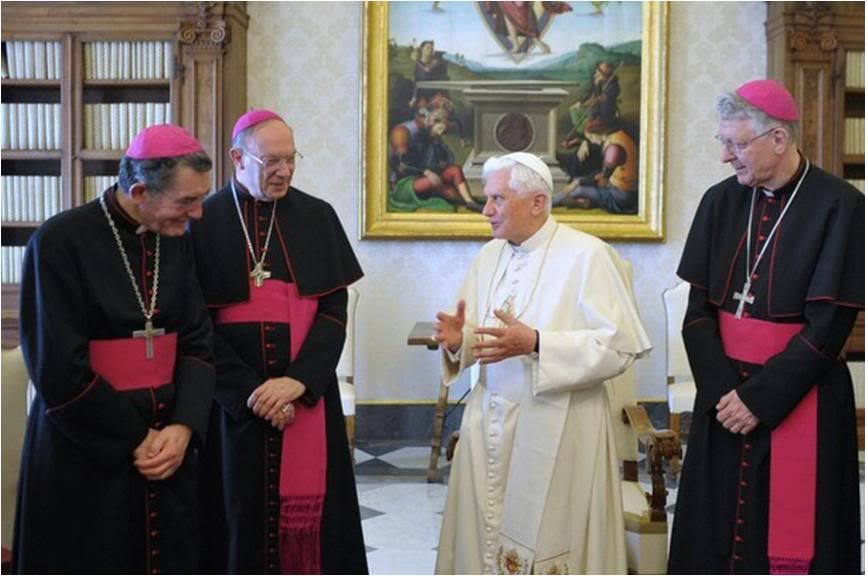
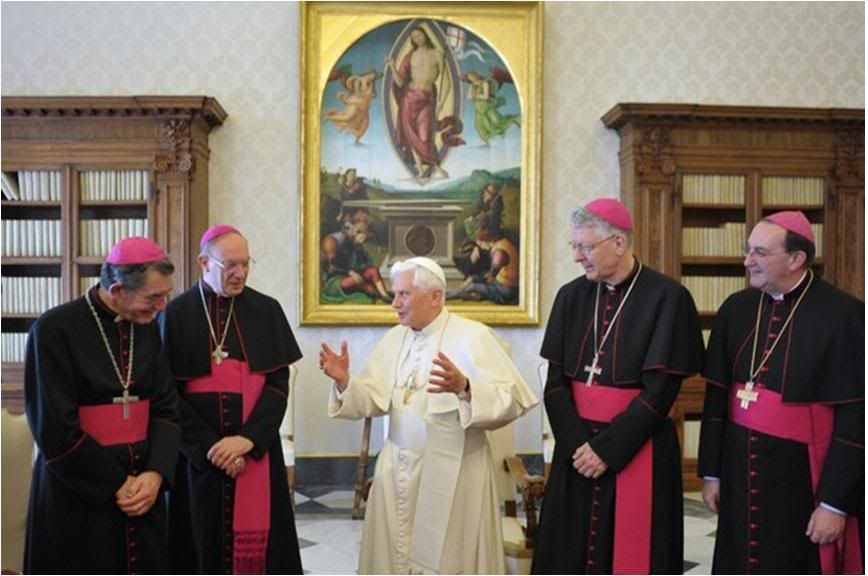
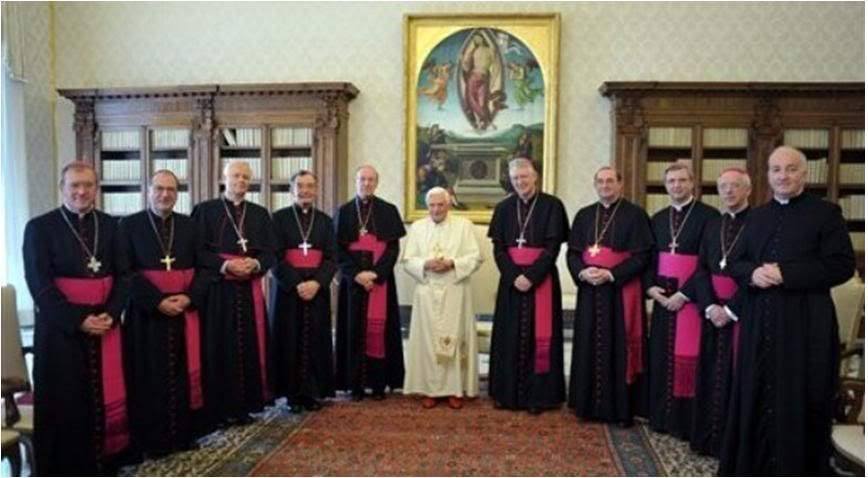 Strangely, the Belgian bishops' conference itself does not have a site, though it has a section on an omnibus site for the Catholic Church in Belgium, in the French language, which then refers you to a site in Flemish for Flanders, the northern part of Belgium:
Strangely, the Belgian bishops' conference itself does not have a site, though it has a section on an omnibus site for the Catholic Church in Belgium, in the French language, which then refers you to a site in Flemish for Flanders, the northern part of Belgium:
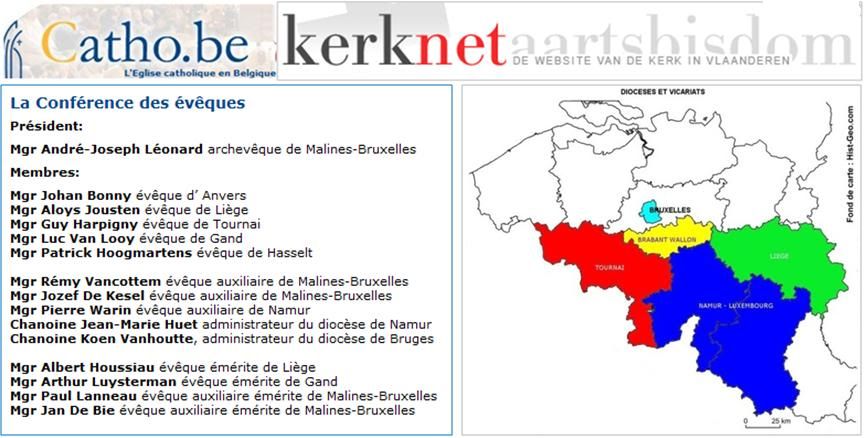

* Here's the rest of the AP story, just to keep the record straight on their unrelenting campaign:
A leading bishop from the Pope's homeland who is being investigated by prosecutors for alleged sex abuse of his post is the latest casualty of the prelates accused of molesting minors.
The Pope formally accepted the resignation offer made on April 21 by Bishop Walter Mixa, an outspoken conservative voice in the German church and a military chaplain for Germany, as well as head of the Augsburg diocese.
Bishops from around the world are summoned to Rome every five years to personally review with the pontiff matters of mutual concern, and the Belgian prelates' meeting with Benedict was long scheduled.
But with clergy abuse scandals breaking into the open in a string of Western European countries in past weeks, damage-control efforts are starting to top what otherwise could be routine discussions of long-running issues of local church concern such as immigration on the continent.
In the early weeks of the scandal in several western European churches, the Vatican tried a strategy of depicting itself as a victim, saying anti-Catholic lobbies were targeting the Pope for such conservative stands as prohibition of same-sex marriage and abortion.
But with surveys showing abuse revelations are shaking Catholic faith in Western Europe, 19 percent of faithful polled this spring in Germany said the scandal has made them think of abandoning the church, the Vatican have been making more pro-active moves, although the Pope has ignored victims' call that he takes responsibility for cover-ups.
The tendered resignations of two Irish bishops accused of covering up child abuse by Dublin clergy have been sitting on the Pope's desk since December. But recently, Benedict did accept the resignation of a third Irish bishop identified in an Irish government-ordered probe of decades of cover-ups of child-abusing clergy in the Dublin archdiocese.
Critics say the pontiff himself helped perpetuate a culture of secrecy, both when he was Munich's archbishop, and later in his long tenure as held of the Vatican office dealing with abuse allegations.
While nearly all of the bishops or cardinals implicated in the scandals have been accused of being part of a systemic cover-up of paedophilia and other abuse, the Bruges bishop himself admitted himself abusing a child, a boy from among his circle of acquaintances.
[Modificato da TERESA BENEDETTA 10/05/2010 11:23] |
| |
|
|
|
|